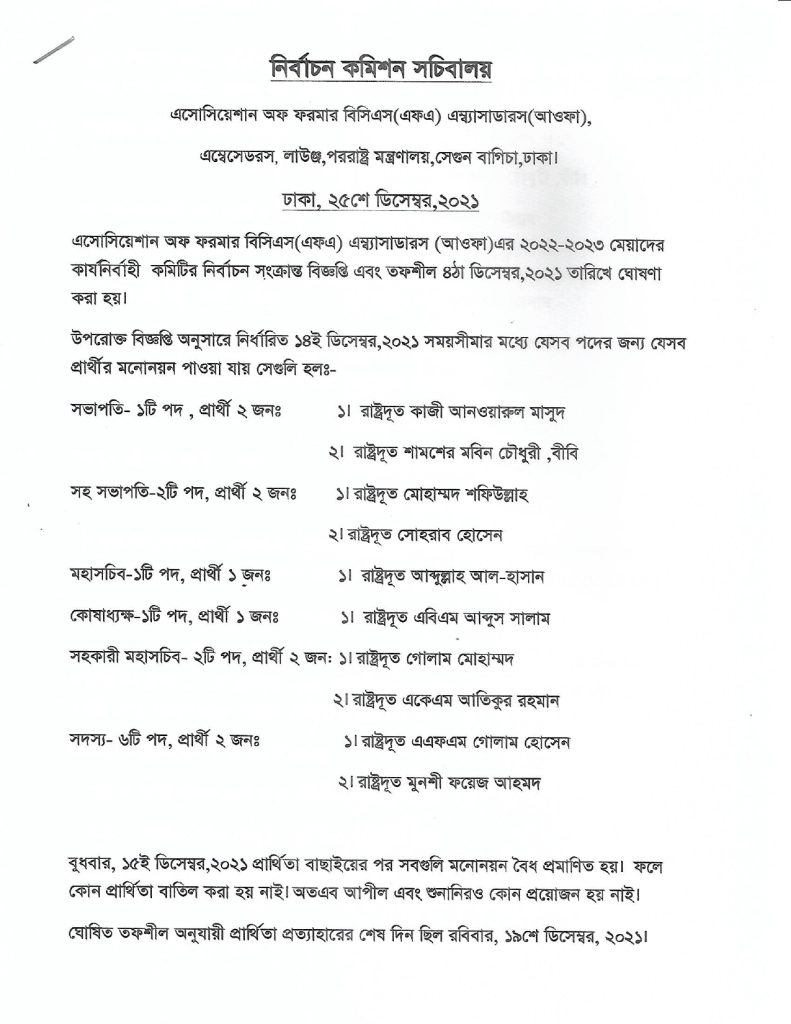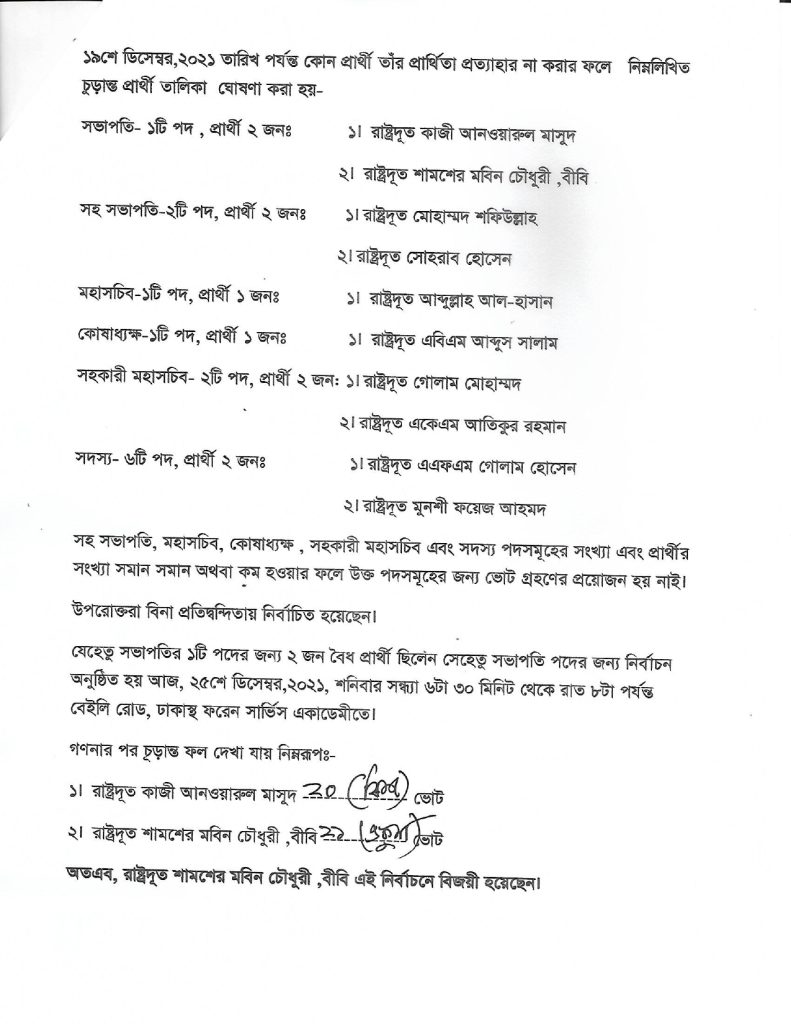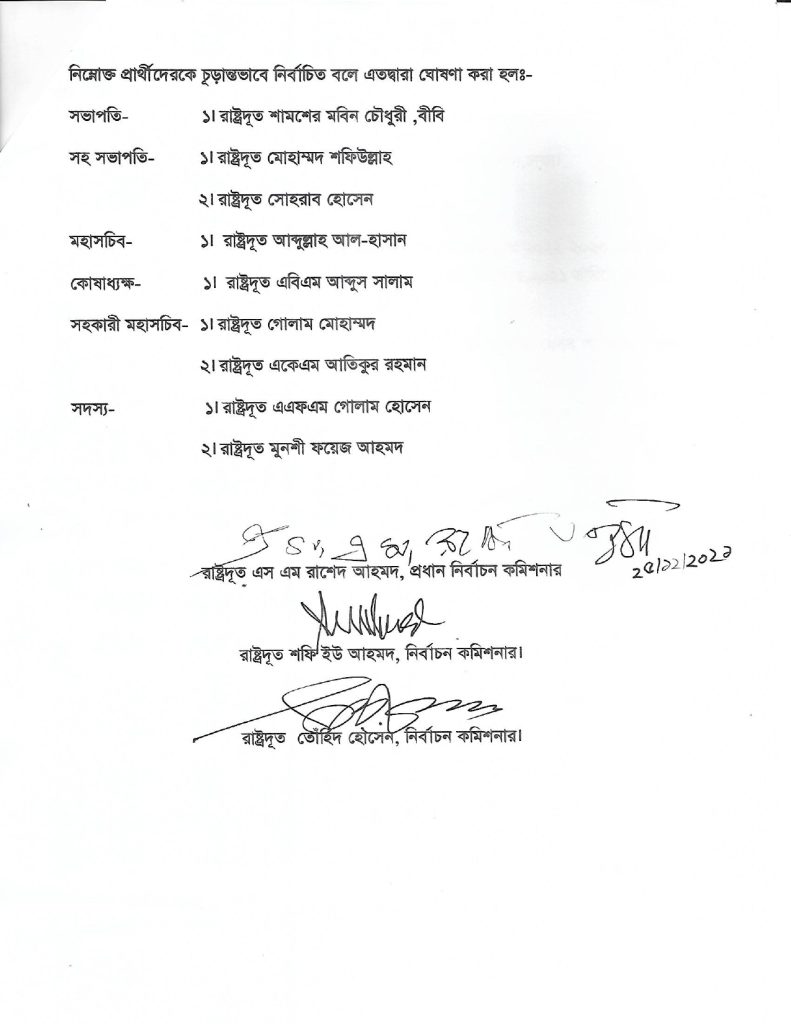15th February, 2025
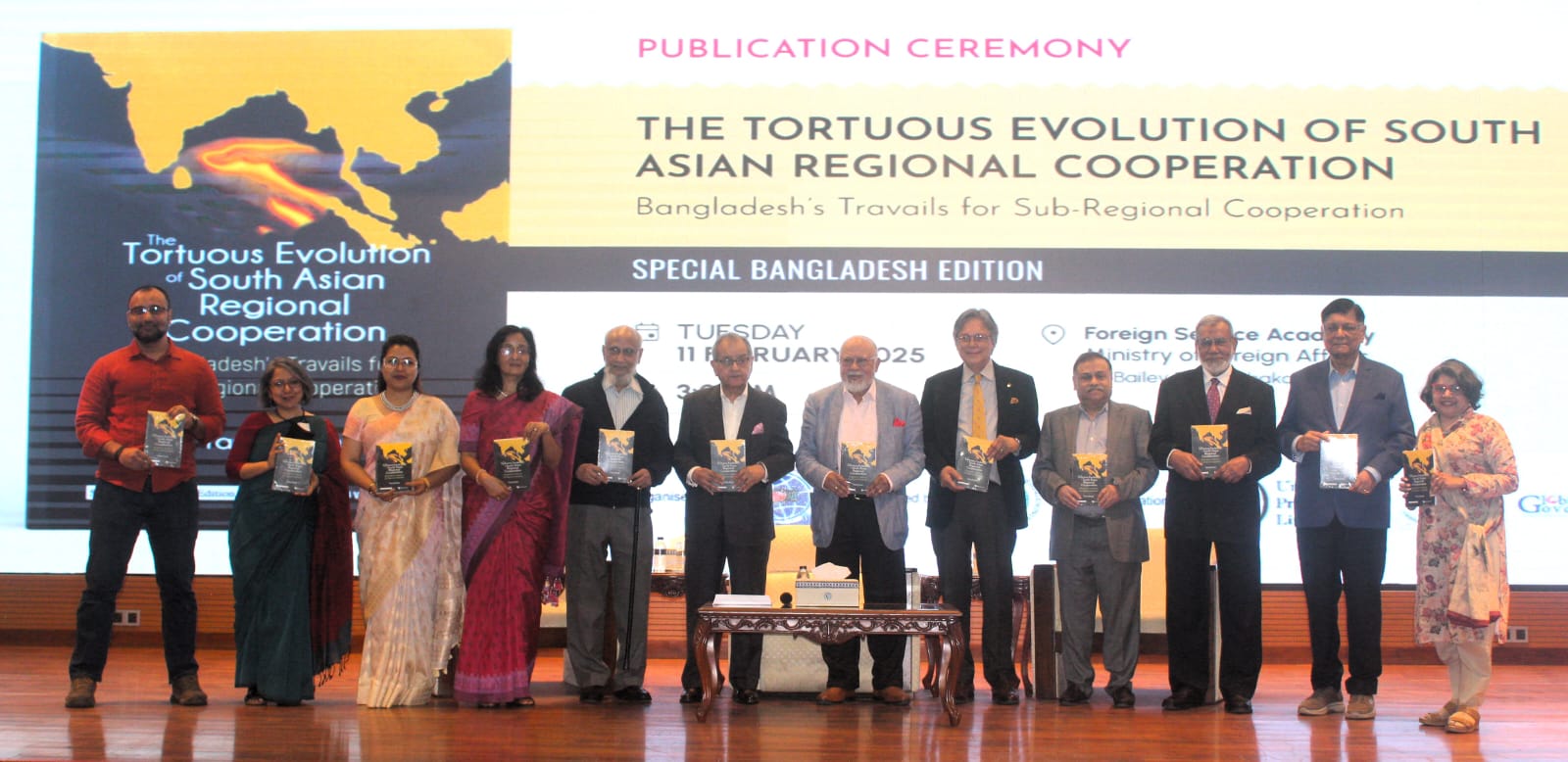
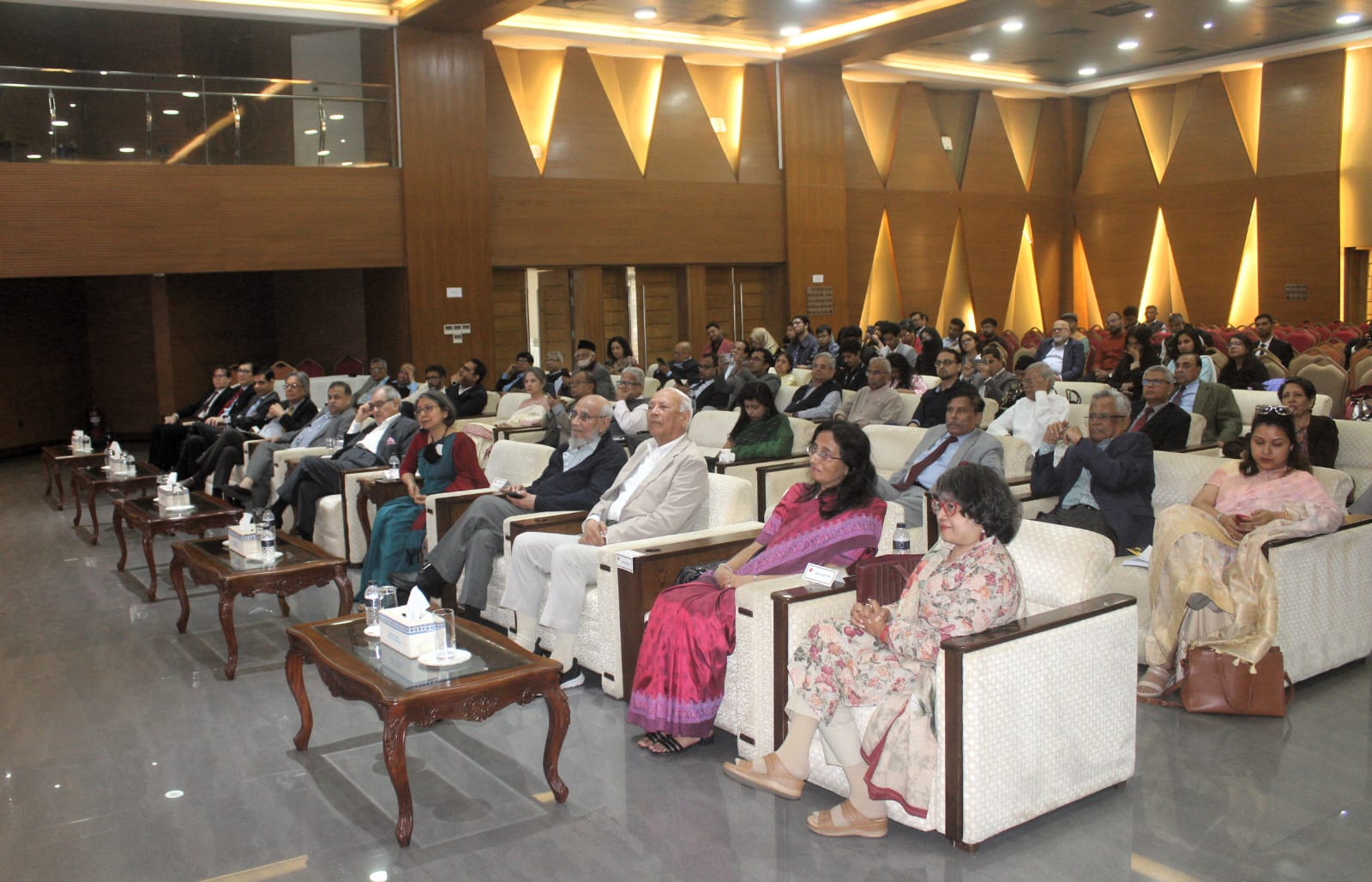

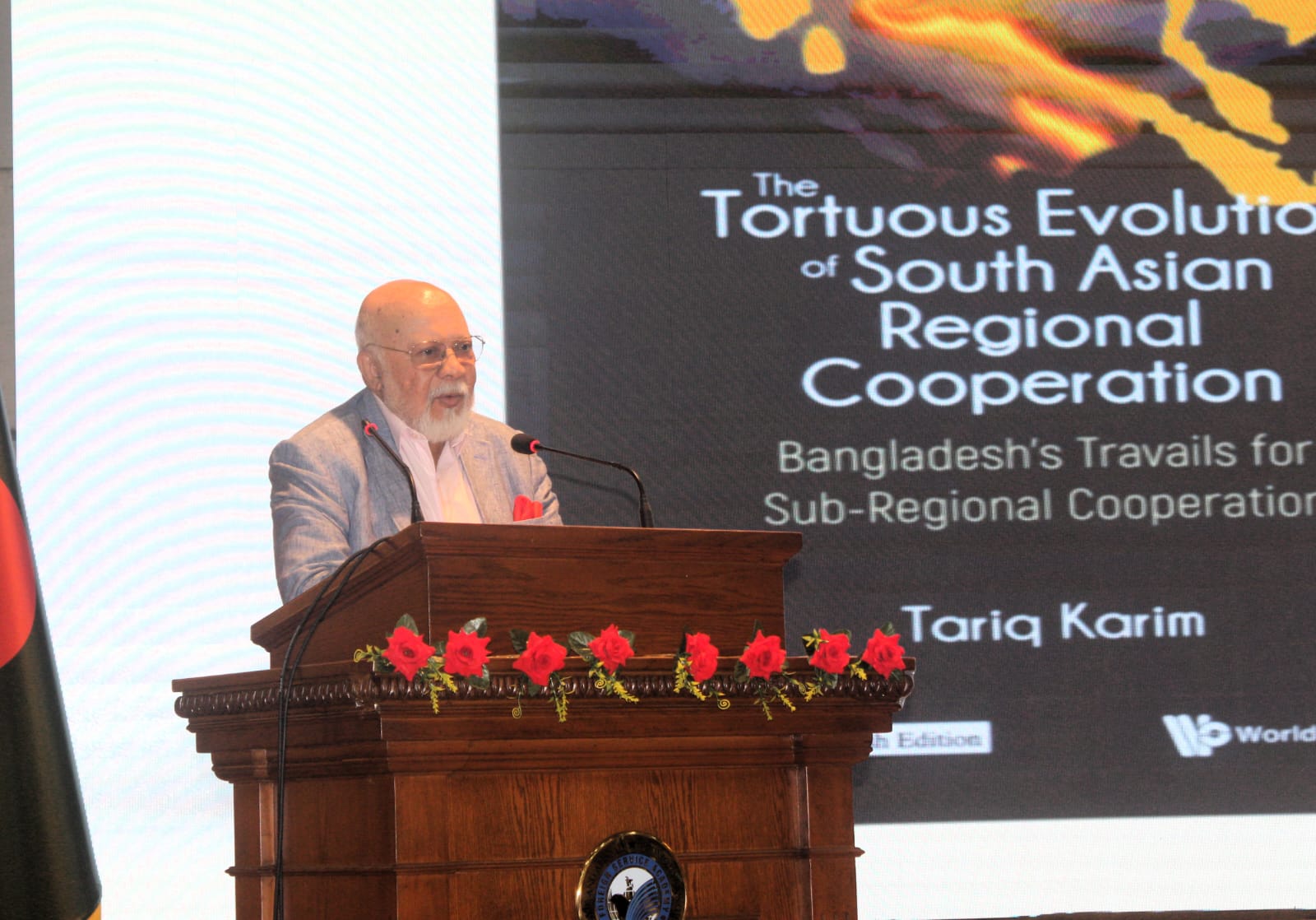
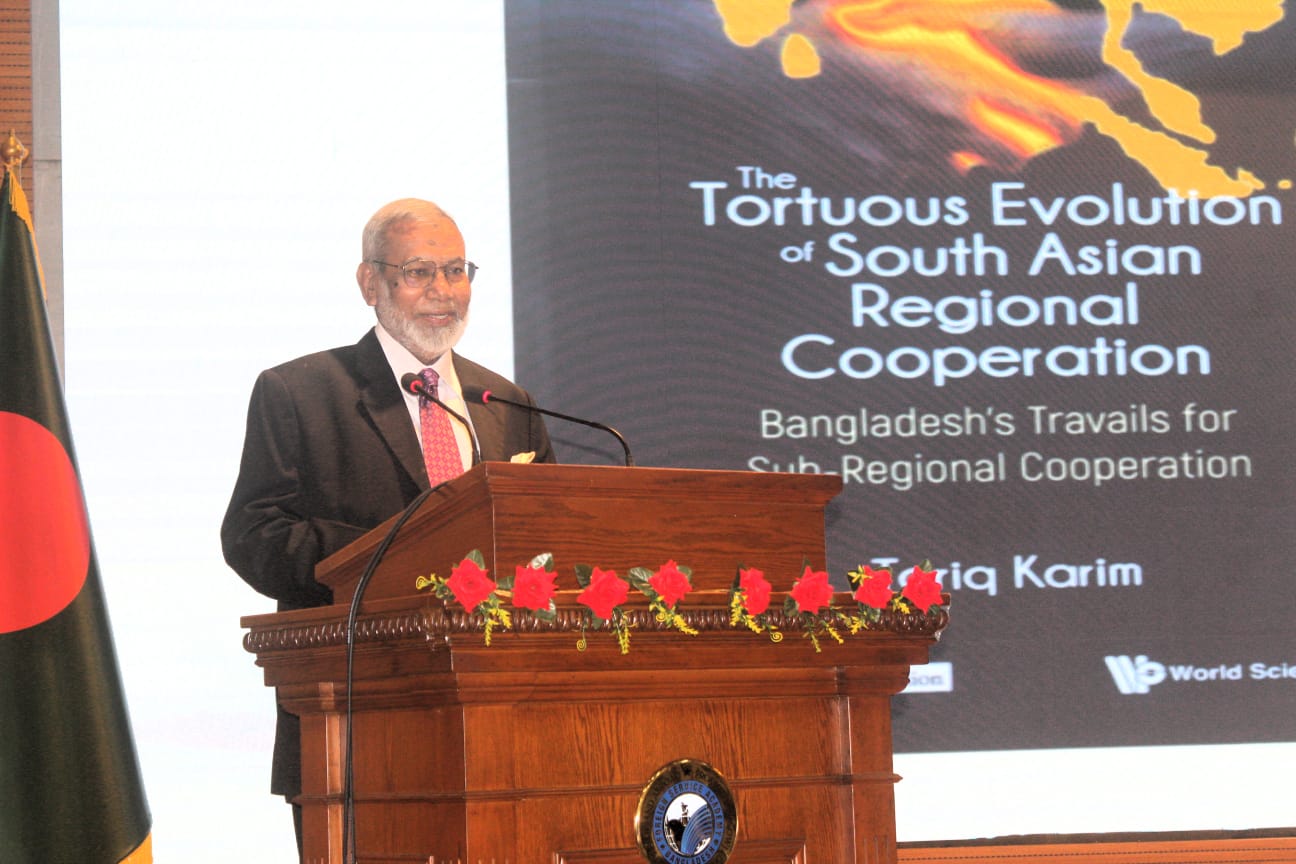
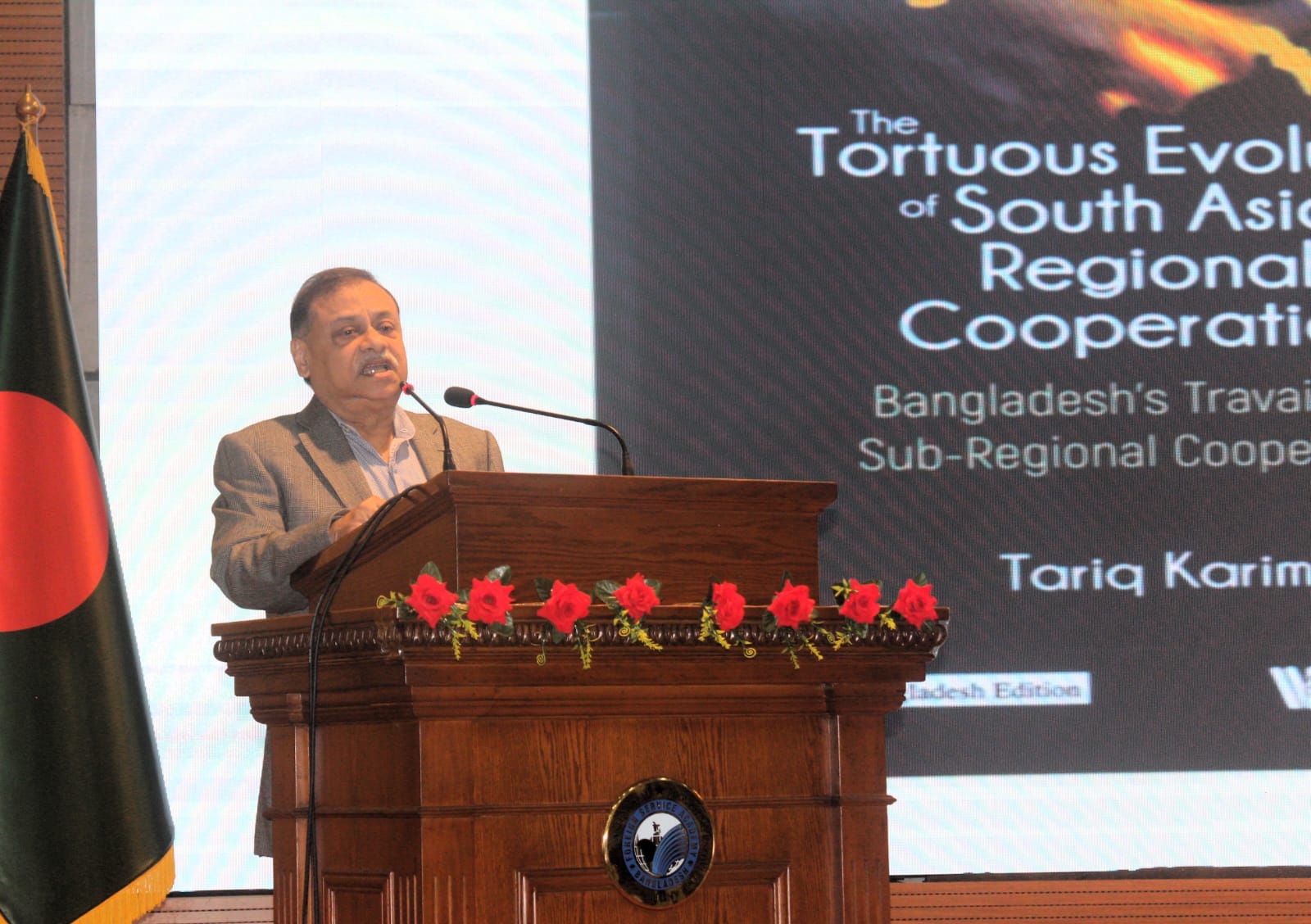
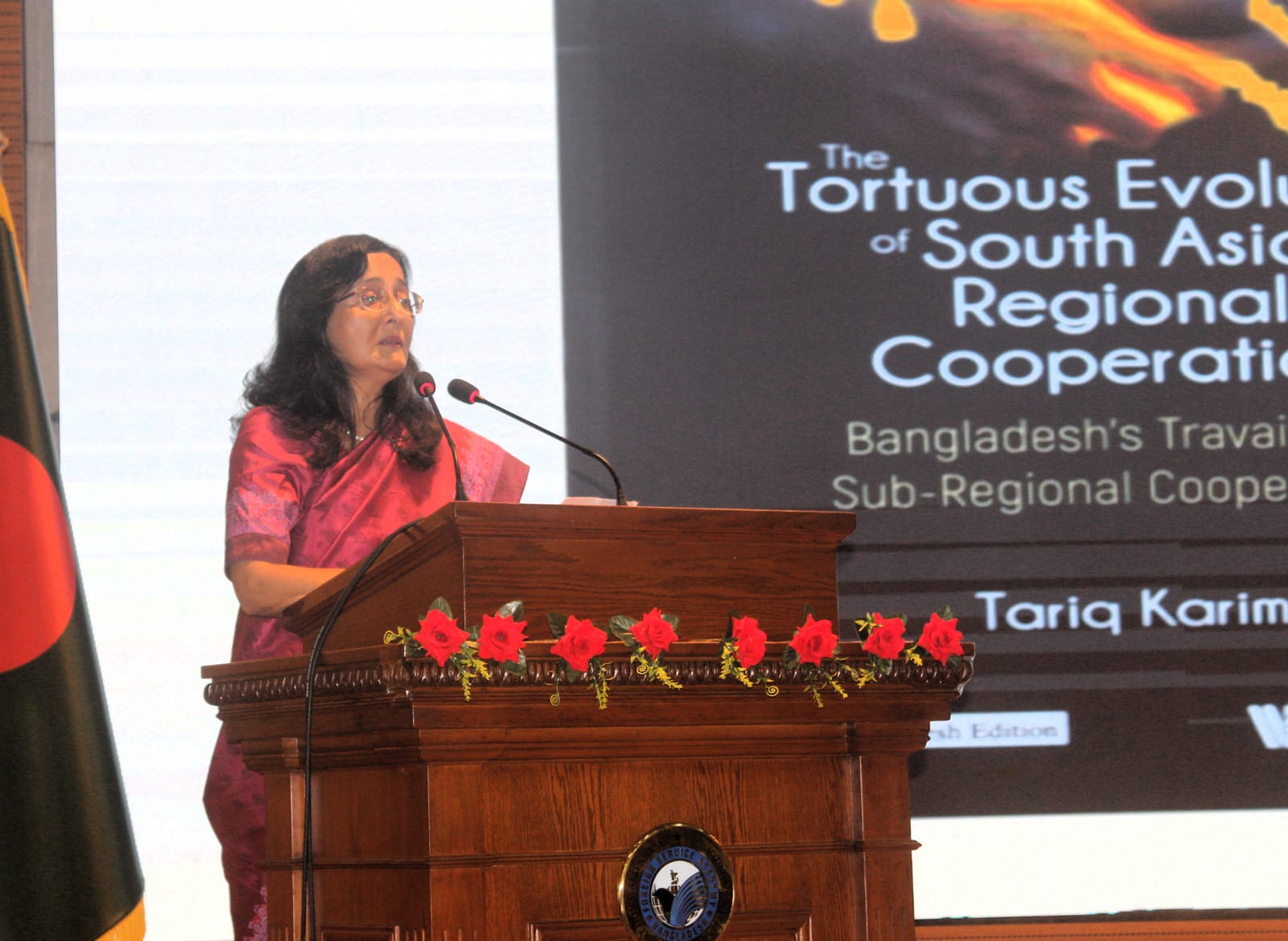
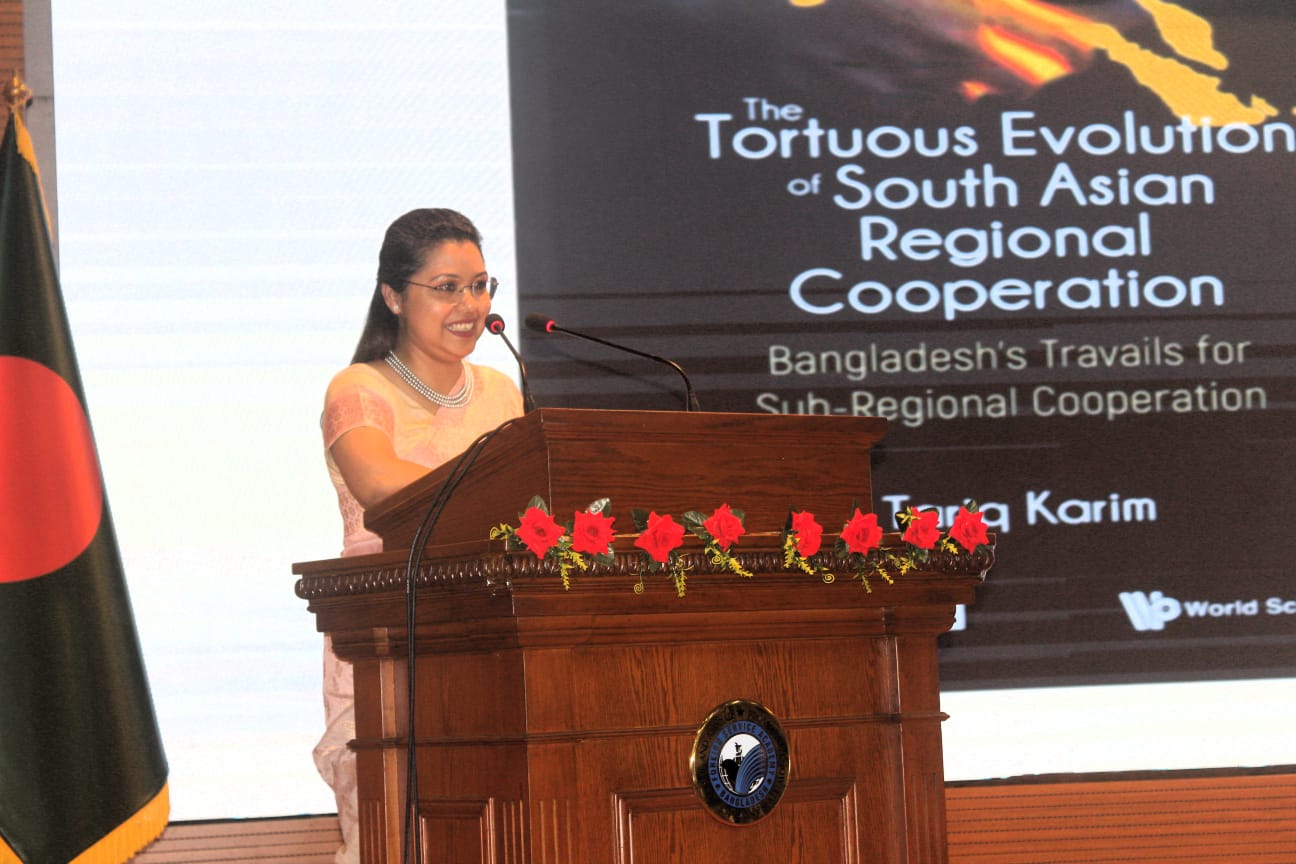
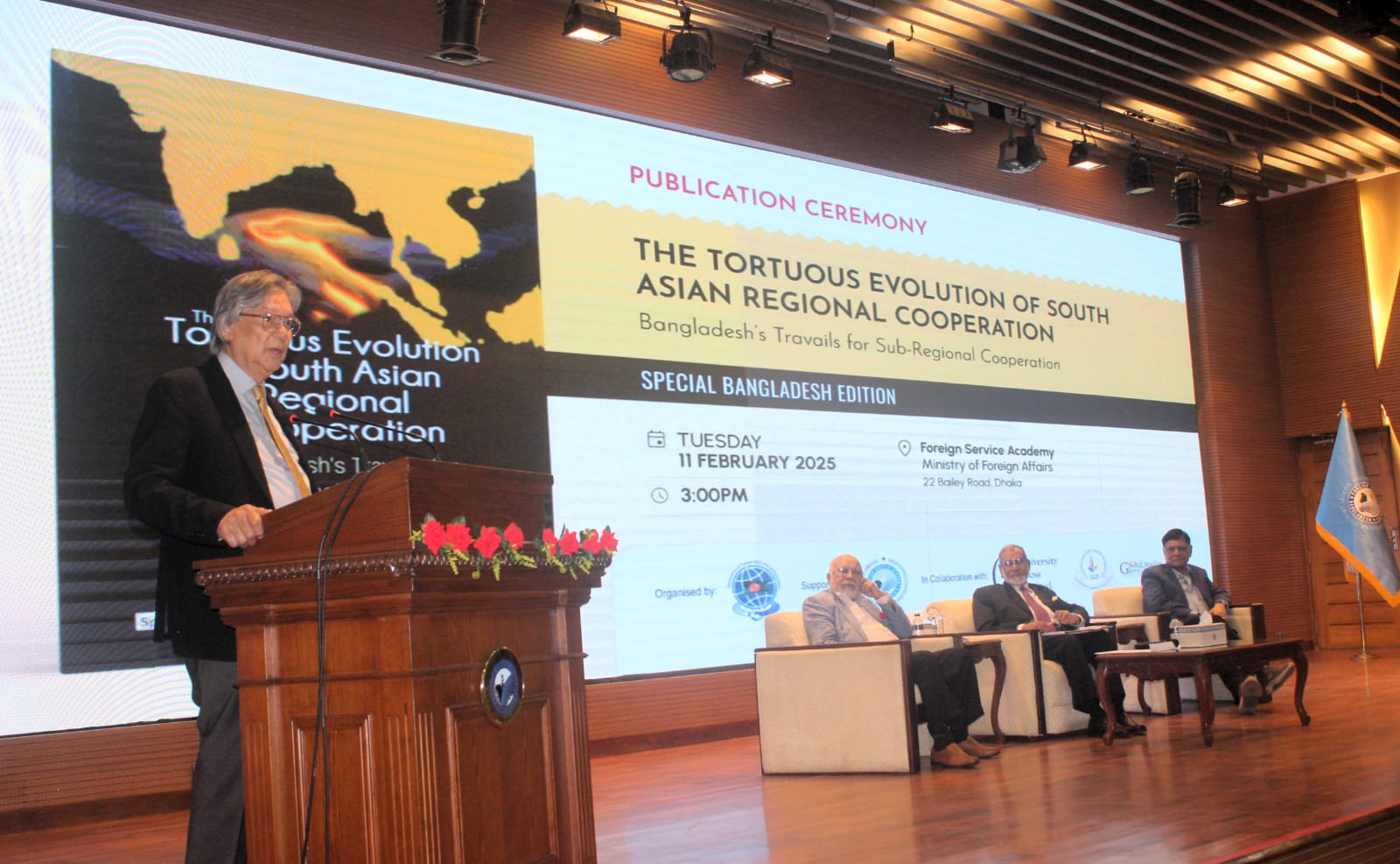
AOFA BOOK LAUNCHING CEREMONY—REPORT
Prepared by : Ambasador Shahed Akhtar, Vice President, AOFA
The Association of Former BCS(FA) Ambassadors (AOFA), in collaboration with Independent University, Bangladesh, and University Press Limited, organized the launching ceremony of Ambassador Tariq Karim’s book, The Tortuous Evolution of South Asian Regional Cooperation: Bangladesh’s Travails for Sub-Regional Cooperation, on Tuesday, 11th February 2025, from 1500-1700 hrs, at the Foreign Service Academy, Bailey Road, Dhaka.
The event was presided over by AOFA President Ambassador Abdullah Al-Hasan and attended by former Ambassadors, members of academia, students of Dhaka University and Independent University as well as trainee officers of the Foreign Service Academy.
Discussants of the Book shared their insights on the book, highlighting its significance in the context of South Asian regional cooperation.
The panel included:
1. Ambassador Mashfee Binte Shams, Former Rector, Foreign Service Academy, and Former Secretary, Ministry of Foreign Affairs
2. Dr. Marufa Akhter, Chair, School of Global Studies and Governance, Independent University, Bangladesh
3. Prof. Faisal M. Rahman, Founding Dean & Professor, The Graham School of Management, St. Xavier University of Chicago, USA
4. Dr. Lailufar Yasmin, Professor, Department of International Relations, Dhaka University
5. Syed Shahnewaz Mohsin, Journalist
6. Ambassador Farooq Sobhan, Former Foreign Secretary
7. Mr. Abul Hasan Choudhury, Former Minister of State for Foreign Affairs
8. Mr. Abdul Muyeed Chowdhury, Former Secretary
9. Ms. Mahrukh Mohiuddin, Managing Director, University Press Limited
Author Ambassador Tariq Karim provided a background on his book, detailing his motivations and the challenges faced in shaping regional cooperation in South Asia.
Interactive Discussion: The audience engaged in a thought-provoking Q&A session with the author, delving into critical aspects of sub-regional cooperation and Bangladesh’s strategic role.
Vote of Thanks: AOFA Vice President Ambassador Shahed Akhter delivered the Vote of Thanks, acknowledging the contributions of all participants and organizers.
The book launch concluded with a reception, fostering further discussions among diplomats, academics, and young Foreign Service officers. The event reaffirmed AOFA’s commitment to intellectual discourse and the promotion of scholarly contributions to Bangladesh’s foreign policy and regional cooperation.
26th December,2024
REPORT
on
AOFA Annual General Meeting (AGM)
on 25-12-2024
The Annual General Meeting (AGM) of the Association of Former BCS (FA) Ambassadors (AOFA) was held on Wednesday 25 December 2024, at the Foreign Service Academy, Bailey Road,Dhaka.
AOFA President Ambassador Abdullah Al-Hasan presided over the AGM session.
The AGM, attended by 26 members of AOFA, DGs of the Foreign Ministry, FSA officials and graced by the presence of Hon’ble Foreign Adviser Ambassador Md. Touhid Hossain and Foreign Secretary Ambassador Md. Jashim Uddin, commenced at 1630 hrs.
A number of the AOFA members were on travel abroad during the yearend and some others were preoccupied with their guests for Christmas related programs. However, they expressed support by e-messages and telephone.
The meeting started with a recitation from the holy Quran and its translation by Amb. Abdullah Al-Hasan. Thereafter, magfirat munajat was offered for the members of AOFA and their family members who had passed away during 2024.
Before the proceedings of the AGM began, Hon’ble Foreign Adviser delivered his goodwill speech. He was followed by Foreign Secretary.
In his remarks, Hon’ble Foreign Adviser mourned the passing away of some AOFA members and their family members this year. He praised the current Executive Committee for making AOFA active and wished AOFA well with programs and activities. Aware of the limitations of the Association as one of its member himself, he expressed his willingness to be of support including financial and budgetary assistance for the AOFA.
Mentioning AOFA’s earlier request during the courtesy call, for Foreign Ministry’s arrangement of regular budget under AOFA subhead, Hon’ble Foreign Adviser entrusted Foreign Secretary with the responsibility to do the needful in this respect. He closed his remarks by remembering those who had sacrificed life and honor for the independence of Bangladesh in 1971 and those students and people sacrificing life and getting wounded in the uprising of 2024, for a new Bangladesh.
In his remarks, Foreign Secretary wished AOFA well and appreciated its activities. Referring to the recent courtesy call made by the Members of AOFA EC on him, he expressed his willingness to support AOFA in every possible way. He explained the new context of Bangladesh’s diplomacy as well as new requirements and requested the members of AOFA to contribute with their knowledge, diplomatic abilities, skills and writing. He emphasized on the MOFA-AOFA partnership and looked forward to working in close cooperation. He assured AOFA of his continued interest and attention as he himself would soon be joining the Association.
Proceedings of the AGM began with AOFA President proposing adoption of the AGM Agenda followed by confirmation of the Minutes of the last AGM on 25.12 2023. AGM unanimously adopted the Agenda and confirmed the Minutes.
Secretary General Ambassador AFM Gousal Azam Sarker, then presented his Report summing up activities of the AOFA during 2024.
He mentioned activities undertaken such as :
Holding of 13 EC meetings,
One Eid Reunion cum Nabobarsho program,
Two pleasure trips to Rangamati and the KEPZ in Chittagong(hosted respectively by Ambassador Supradip Chakma (the then Chairman of the CHT Development Board) and KEPZ President Ambassador Jahangir Saadat),
Five courtesy calls on the former Foreign Minister and Foreign Secretary and calls on the current Hon’ble Foreign Adviser, Hon’ble Adviser CHT Affairs, and Foreign Secretary,
Three seminars held under Ambassadors’ lecture series with the Ambassadors of Korea and Japan and the Country Director of World Bank to Bangladesh as well as
One theme based seminar with an international expert on the Rohingya issue which was coordinated by Ambassador Suhrab Hossain.
SG announced AOFA’s readiness to hold more theme-based programs and, with budgetary support from Foreign Ministry, to organize activities in the manner AOFA’s counterpart Associations in other South Asian countries were doing. He thanked the AOFA President and its immediate past President for their guidance and EC and AOFA members for their support. He also assured them that he would coordinate with the Foreign Ministry for various needs of and support for AOFA.
AGM unanimously approved the Secretary General’s Report.
Next, AOFA Treasurer Amb ABM Abdus Salam presented his Report. He informed AOFA that Audit Reports of its accounts for the year 2024 had been prepared and handed over to the President for submission to the Registration Authority. Given the paucity of AOFA funds, Treasurer appealed to the members for regular payment of subscriptions.
In his address as President of the meeting, Ambassador Abdullah Al-Hasan thanked the members of AOFA, its EC and, specially, the past Presidents and Secretaries General, for their cooperation and support. He highlighted the fact that the Association had been active during 2024 with increased activities and programs and thanked the hosts and coordinators of various programs so far organized. He praised and thanked Foreign Ministry for its support, particularly mentioning funding support from two former Foreign Ministers, Ambassador A.H.Mahmood Ali and Dr. A.K.Abdul Momen. He called upon the AOFA members and their spouses, and its honorary members, to continue actively participating in the AOFA programs and thus keep the Association a vibrant one.
Following the Maghrib prayer break, some distinguished members,viz. Amb. Humayun Kamal, Amb. Ashraf Ud Doula, Amb. Mahmood Hasan, Amb. Shafiullah, and Amb. Masud bin Momen took the floor and made their comments and suggestions.
In response, Foreign Secretary made comments and suggestions on the following points:
Budget and allocation for AOFA
MOFA-AOFA partnership and interaction
Countering misinformation and disinformation through public diplomacy, talk shows, writings, etc.
Playing effective think tank role
Compiling history or historical memories of the Foreign Ministry
Fundraising in different ways
Redecoration of the Foreign Ministry VIP room for AOFA-EC
Using services of AOFA members by Foreign Ministry for protocol and ceremonial purposes involving foreign dignitaries.
All the suggestions and comments were noted for reflection and action.
After thanking all, AGM President declared the Annual General Meeting of 2024 closed.
A F M Gousal Azam Sarker
Secretary General, AOFA.
10th November, 2024
Seminar with World Bank Country Director Mr. Abdoulaye Seck and Dr. Mustafizur Rahman of the Centre for Policy Dialogue (CPD).
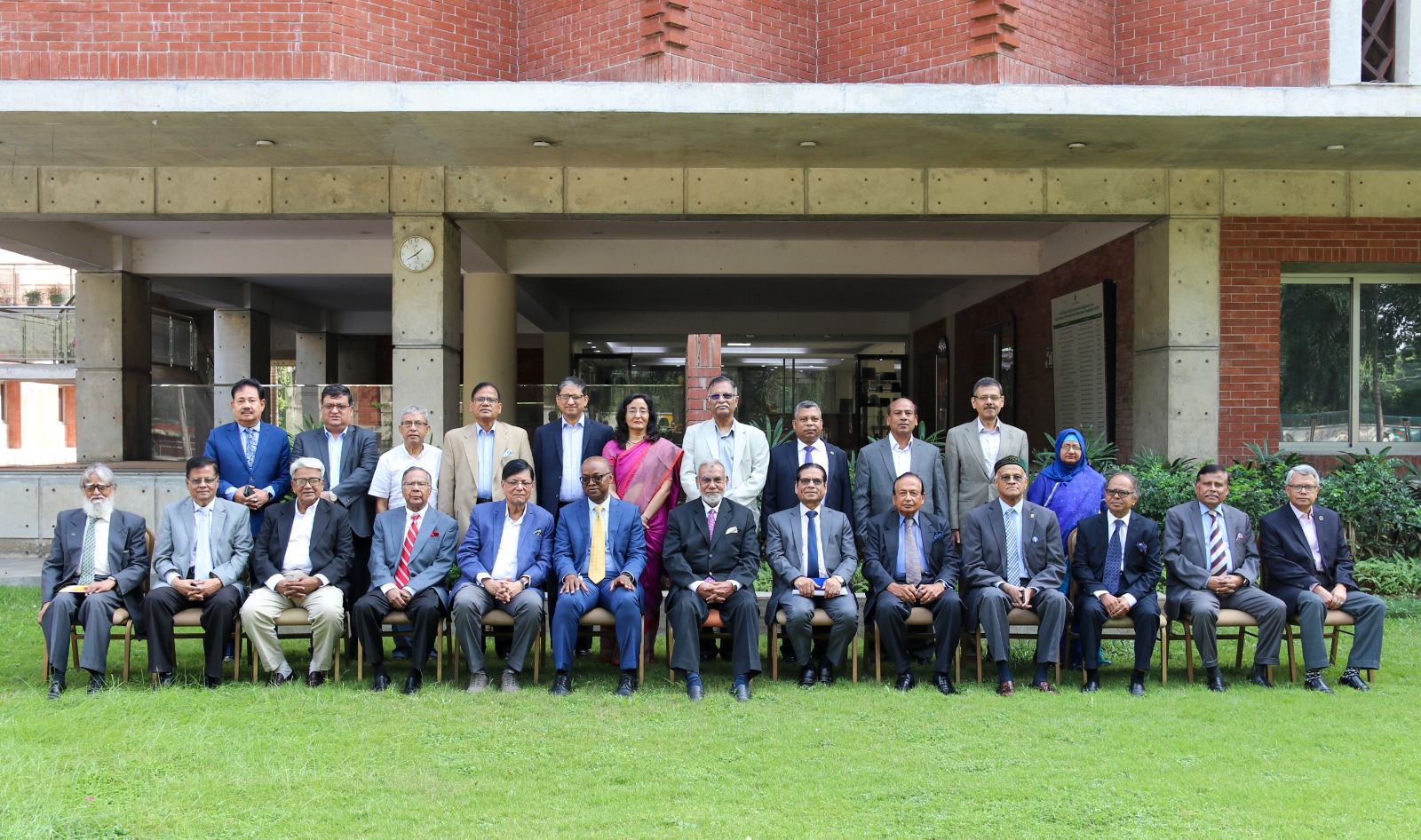
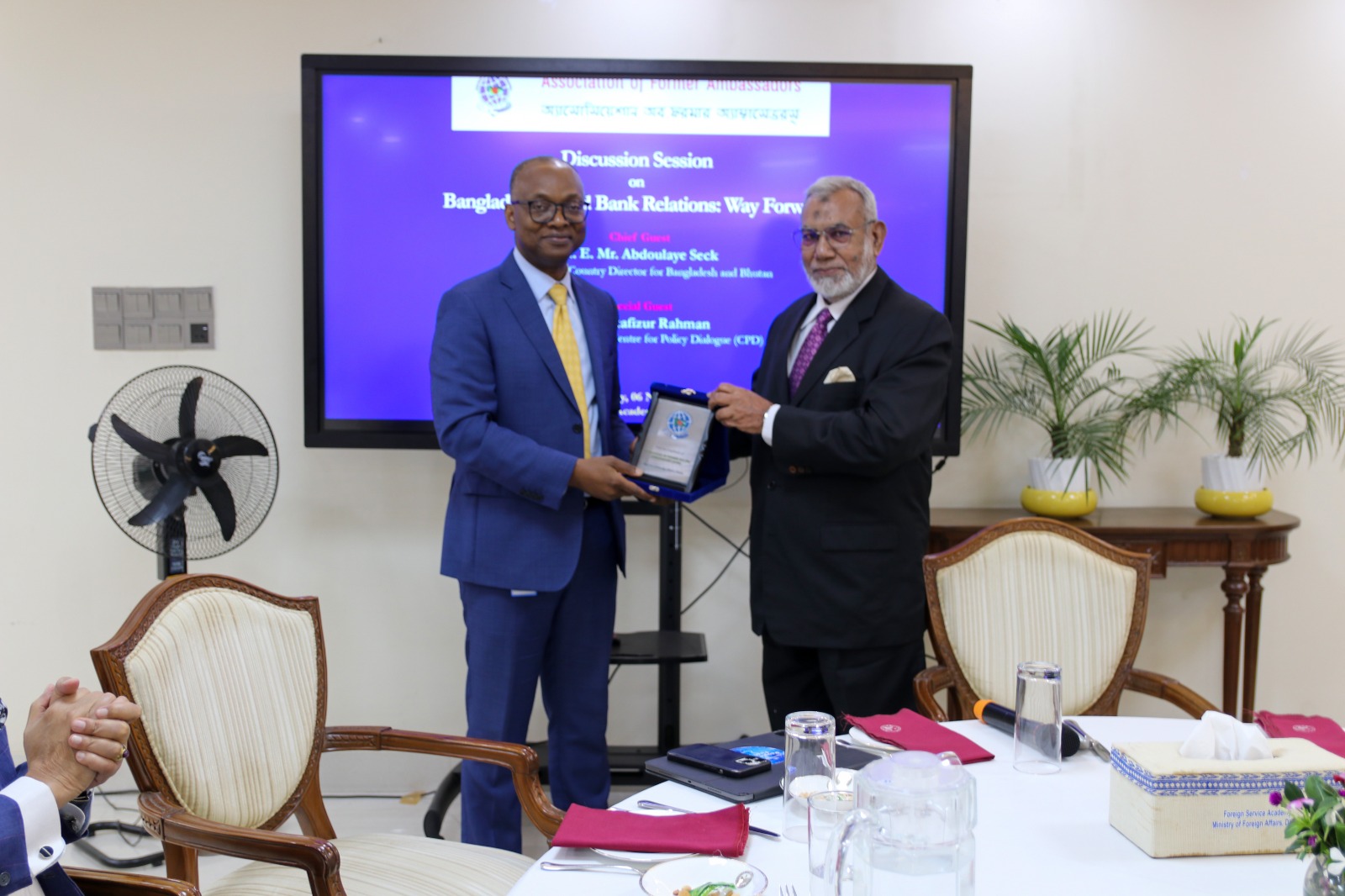
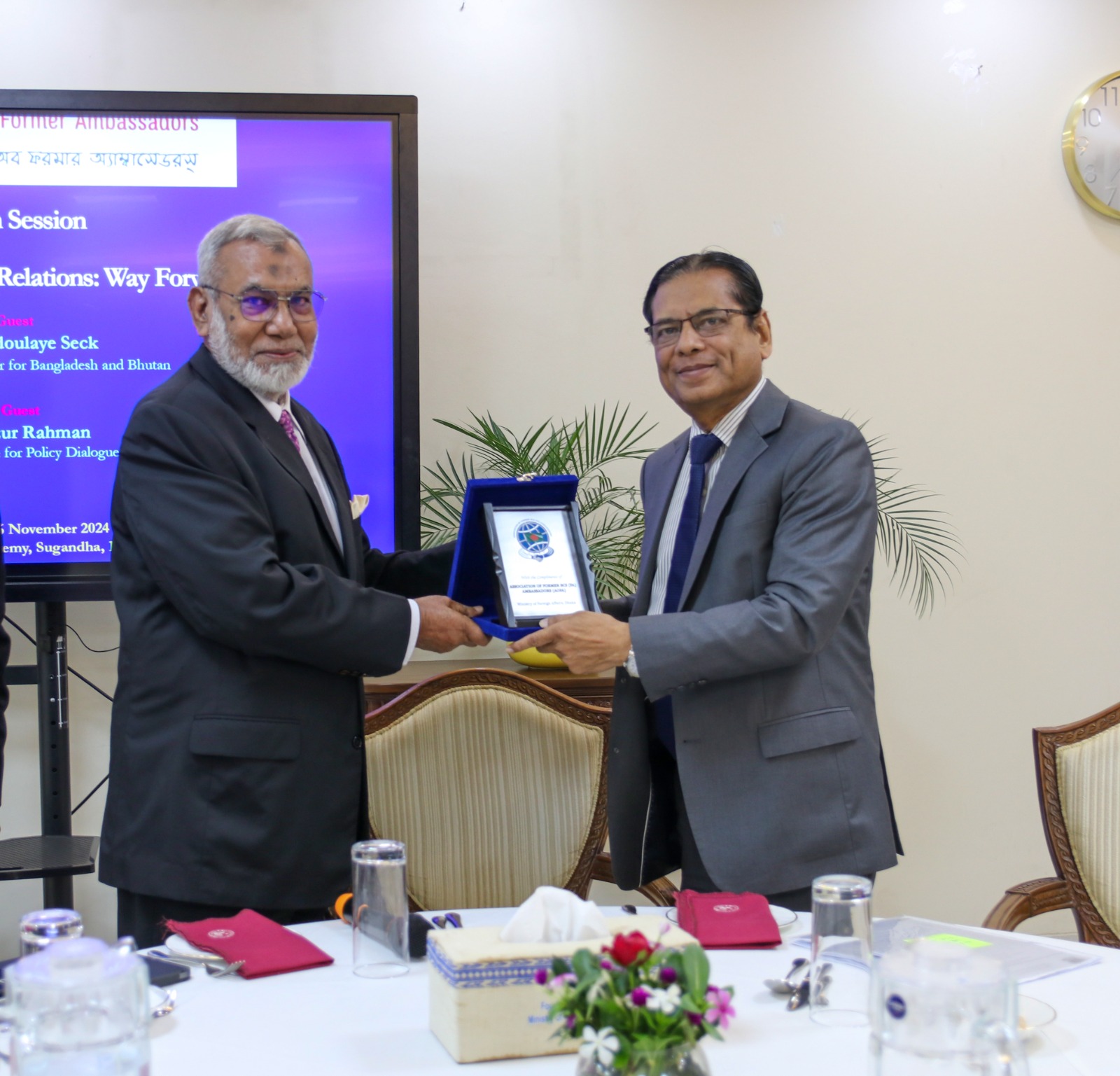
Brief Report on the AOFA Lecture Series on ‘Bangladesh-World Bank Relations: Way Forward .
Held 6th November at the Foreign Service Academy, Dhaka .
Prepared by Ambassador Shahed Akhtar
An impactful session organised by the Association of Former BCS (FA) Ambassadors – AOFA, which brought together a distinguished audience comprising former Ambassadors, MOFA Additional Secretary, academia, media representatives and Trainee Foreign Service officers . The event featured insightful presentations by Mr. Abdoulaye Seck, World Bank Country Director for Bangladesh and Bhutan, and Dr. Mustafizur Rahman, a renowned economist of the Centre for Policy Dialogue (CPD). Ambassador Riaz Hamidullah, Additional Foreign Secretary also addressed the session.
Keynote Address by Mr. Abdoulaye Seck, Country Director World Bank
Mr. Abdoulaye Seck’s address focused on the pivotal role of the World Bank in supporting Bangladesh’s energy sector amidst global economic challenges. He highlighted that the World Bank is committed to assisting Bangladesh in securing energy from international sources and ensuring timely payments for energy imports. This assurance is particularly significant against the backdrop of a mounting global energy crisis and its implications for Bangladesh’s economy.
Mr. Seck emphasized that one of the major priorities for the World Bank is to help Bangladesh obtain energy at an affordable price. He reassured attendees of the institution’s readiness to provide significant budget support by December, underlining that this commitment is designed to boost investor confidence and contribute to the stabilization of the nation’s foreign reserves and currency.
In response to ongoing challenges such as electricity import bills and securing uninterrupted energy supplies, Mr. Seck reiterated the World Bank’s dedication to bridging financing gaps, supported by the institution’s robust budget and strategic initiatives. He called for collaborative efforts between global suppliers and local stakeholders to mitigate the risks associated with energy shortages and ensure long-term sustainability.
Insights from Dr. Mustafizur Rahman of CPD
Dr. Mustafizur Rahman offered an analytical perspective on the economic implications of Bangladesh’s energy policies and the broader financial landscape. He critiqued the recent trends in the country’s foreign exchange reserves, noting a decline from over $40 billion two to three years ago. Dr. Rahman attributed this trend to the “misguided policy” of defending an unsustainable exchange rate, which has strained the country’s fiscal health.
Emphasizing the importance of strategic economic adjustments, Dr. Rahman advocated for measures such as renegotiating and restructuring external debts to align with Bangladesh’s current economic realities. He stressed the need for significant domestic resource mobilization and the importance of digitalizing this process to enhance efficiency and transparency. Dr. Rahman’s remarks underscored that while reforms are underway, achieving sustainable economic stability would require targeted, analytical, and technical actions from both the government and its development partners, including the World Bank.
Concluding Observations
Both World Bank Director Mr Seck and CPD Dr. MostifizurvRahman shared converging views on the necessity of comprehensive policy reforms to navigate Bangladesh’s economic challenges. The speakers highlighted that ensuring affordability in energy procurement and reinforcing budgetary support mechanisms would bolster the nation’s resilience in facing future crises.
The session resonated with Fmr Ambassadors emphasizing the interplay between international partnerships, effective governance, and economic strategy in shaping Bangladesh’s path forward. The discussions reinforced the critical role of proactive, multi-faceted approaches to fostering stability and growth, particularly in the energy sector, which serves as a cornerstone of Bangladesh’s development agenda.
Recommendations
1. Strengthening International Collaboration: The dialogue underscored the importance of maintaining strong partnerships with global financial institutions like the World Bank to support energy transition and secure essential resources.
2. Policy Adjustment and Resilience: Bangladesh must reassess its economic strategies, focusing on sustainable exchange rate policies and innovative approaches to debt management.
3. Domestic Resource Mobilization: Enhanced digital infrastructure for resource mobilization can create pathways for increased public revenue and reduced reliance on external assistance.
This session organised by AOFA was a timely initiative, reinforcing the AOFA’s role as a platform for high-level discourse and policy-oriented dialogue essential for navigating Bangladesh’s complex economic landscape.
17th October, 2024
Japan’s Steadfast Commitment to Bangladesh:
Remarks by Ambassador Iwama Kiminori at the Seminar hosted by AOFA in Dhaka
By :Ambassador Shahed Akhtar
On 25th September, 2024, Japan’s Ambassador to Bangladesh, H.E. Iwama Kiminori, delivered an insightful speech at the Bangladesh Foreign Service Academy, reaffirming Japan’s unwavering support for Bangladesh during her crucial transitional phase under the interim government led by Professor Mohammad Yunus.
The Ambassador’s remarks, delivered at a discourse organised by the Association of Former BCS(FA) Ambassadors—AOFA, were attended by a distinguished audience of diplomats, scholars, and Trainee officers underscoring Japan’s enduring relationship with Bangladesh as she navigates a critical juncture in her political and economic history.
In his speech, Ambassador Iwama emphasized on Japan’s readiness to support Bangladesh as it transitions under the new governance. He made it clear that Japan remained fully committed to engaging with all stakeholders of the interim government, to assess the nation’s immediate needs and long-term goals. Ambassador Iwama reiterated Japan’s intention to respond to the specific needs of Bangladesh, offering support based on the evolving priorities of the government and the people.
Strengthening Bilateral Ties: Key Sectors of Cooperation
Japan’s deep engagement with Bangladesh was highlighted through Ambassador Iwama’s commitment to strengthen cooperation across a broad range of sectors, including business, defense, and people-to-people exchanges. He underlined Japan’s long-standing position as a reliable partner, working in close alignment with Bangladesh to enhance economic stability, improve governance and foster deeper security collaboration.
Ambassador Iwama drew attention to the robust presence of Japanese companies in Bangladesh, with over 300 firms actively operating in the country. Despite the security concerns accompanying the current transitional period, none of these companies have opted to withdraw, reflecting Japan’s confidence in Bangladesh’s resilience and potential for economic growth. However, the envoy underscored the importance of further improving the business environment in Bangladesh, particularly in areas such as bureaucratic efficiency and governance. He pointed out that bureaucratic complexities remain a significant obstacle to attracting additional foreign investment, a key ingredient for Bangladesh’s continued development.
Economic Growth and Investment: The Role of Japan
The Ambassador’s speech also delved into the economic partnership between Bangladesh and Japan, underscoring Tokyo’s enduring support for Bangladesh’s economic growth. He noted that Japan remained committed to fostering trade relations and encouraging investment through mechanisms such as the Public-Private Joint Economic Dialogue (PPED). This ongoing dialogue between the two countries has played a pivotal role in identifying areas for enhanced cooperation, particularly in addressing infrastructural and regulatory bottlenecks that impede foreign investment.
One of the central points of Ambassador Iwama’s address was the ongoing negotiations for the Economic Partnership Agreement (EPA) between Japan and Bangladesh. The EPA aims to solidify the already strong trade and investment ties between the two countries by reducing tariffs and fostering a more conducive environment for bilateral trade. This agreement, once finalized, is expected to serve as a cornerstone for future economic collaboration, providing a platform for sustained growth and mutual benefit.
From Development Assistance to Strategic Partnership
The Ambassador’s speech highlighted the evolution of Japan-Bangladesh relations from a focus on development assistance to a broader strategic partnership. For decades, Japan has been a key development partner for Bangladesh, providing substantial aid for critical infrastructure projects and socio-economic development. However, the relationship has now matured into a more dynamic partnership, centered on trade, investment, and regional security cooperation.
A recent example of Japan’s continued commitment to Bangladesh’s development is the exchange of notes between the two governments for a grant of 575 million Yen under Japan’s Official Security Assistance (OSA) framework. This grant is aimed at strengthening Bangladesh’s economic cooperation with Japan, further solidifying the economic ties that have underpinned the relationship for decades.
Japan’s Free and Open Indo-Pacific (FOIP) Strategy and Bangladesh’s Indo-Pacific Outlook
In his remarks, Ambassador Iwama also underscored the alignment between Japan’s Free and Open Indo-Pacific (FOIP) strategy and Bangladesh’s Indo-Pacific Outlook. Both countries share a vision of inclusiveness, regional cooperation, and the importance of maintaining peace and stability in the Indo-Pacific region. The Ambassador emphasized that Japan’s FOIP strategy was not only about securing maritime stability but also about promoting economic connectivity and inclusive growth across the region, which aligned closely with Bangladesh’s own regional aspirations.
Japan’s FOIP strategy, which advocates for a rules-based international order, is increasingly relevant as Bangladesh seeks to play a larger role in regional and global governance. The Ambassador reaffirmed Japan’s commitment to supporting Bangladesh’s efforts in maintaining peace and stability in the region, which are vital for the prosperity of both nations and their neighbors.
Security and Defense Cooperation
Turning to the issue of security, Ambassador Iwama expressed optimism that the security situation in Bangladesh would stabilize as the country moves through her transitional period. He emphasized Japan’s close monitoring of the situation and reassured the audience that updates were regularly communicated to Tokyo. Japan has been actively involved in strengthening Bangladesh’s security infrastructure, particularly through defense cooperation and capacity-building initiatives.
The Ambassador mentioned Japan’s efforts in facilitating visits to Bangladesh’s National Defense College and expressed Japan’s intention to expand collaboration in the defense and security sectors. This includes not only high-level defense dialogues but also practical cooperation in areas such as maritime security, counterterrorism, and cyber security. These efforts reflect the growing recognition of security as a critical pillar of the bilateral relationship, alongside economic and cultural ties.
Fostering People-to-People Exchanges
One of the key themes of Ambassador Iwama’s speech was the importance of fostering closer people-to-people ties between Japan and Bangladesh. He highlighted the various educational and cultural exchanges that have brought the two nations closer together over the years, including student exchange programs, academic collaborations, and cultural initiatives. The Ambassador reiterated Japan’s commitment to deepening these connections, recognizing that people-to-people exchanges form the foundation of long-term diplomatic relations.
Ambassador Iwama also pointed to initiatives such as the National Defense College tour as examples of how these exchanges are not limited to the civilian sphere but extend to the defense and security sectors as well. By facilitating greater interaction between military and security professionals from both countries, Japan aims to foster mutual understanding and cooperation that will benefit the broader strategic relationship.
JETRO and the Business Environment in Bangladesh
The Seminar also featured remarks by Yuji Ando, Bangladesh representative of the Japan External Trade Organization (JETRO), who stressed the importance of improving Bangladesh’s business environment. Mr Yuji Ando highlighted the need for the interim government to reduce bureaucratic red tape, improve governance, and tackle issues such as corruption, which continue to hinder foreign investment.
Ando’s remarks echoed the Ambassador’s concerns about bureaucratic inefficiency, suggesting that Bangladesh could streamline her government structure to make it more conducive to business. He noted that the country currently had 45 Ministries and numerous authorities, which contribute to the complexity of the regulatory environment. By simplifying this structure, Bangladesh could make herself more attractive to both foreign and domestic investors, thereby accelerating her economic development.
Japan’s Role in Bangladesh’s Future
As Bangladesh continues to navigate her transitional phase, Japan’s steadfast commitment to the country offers a beacon of stability and support. The relationship between the two nations , now elevated to a strategic partnership, is marked by shared interests in regional stability, economic development and security cooperation. The ongoing negotiations for the EPA are a testament to the strong economic ties that bind the two countries , while the alignment of their Indo-Pacific strategies highlights their shared vision for regional peace and prosperity.
Japan’s involvement in Bangladesh’s transition under the interim government will be crucial in shaping the country’s economic and political landscape in the years to come. Whether through continued investment, defense cooperation or people-to-people exchanges, Japan remains a key partner for Bangladesh as the latter seeks to secure a brighter future for her people.
The Seminar concluded with a lively discussion, reflecting the depth of interest and engagement from the former BCS(FA) Ambassadors, many of whom are deeply interested in the future of Bangladesh-Japan relations.
15th October, 2024
Report of the interaction of Association of Former BCS (FA) Ambassadors (AOFA) with theAmbassador of Japan to Bangladesh held at the Foreign Service Academy
Date and Time : 25 September 2024, 11:00 am – 01:00 pm.
AOFA organized an interactive session with the Ambassador of Japan to Bangladesh on 25 September 2024 as a part of the Ambassadors’ Lecture Series program. The program was very well attended by members of the AOFA, Senior Officials from the Ministry of Foreign Affairs, Trainees of the FSA, Faculty members of the Departments of International Relations and Japanese Language, representatives of Think Tanks and representatives of the print media.
2. At the outset, Ambassador A.F.M. Gousal Azam Sarker, AOFA Secretary General and Chairman, BIISS, offered welcome remarks, mentioning that this was part of AOFA’s efforts to reach out to members of the diplomatic community in Dhaka for exchange of views and for strengthening relations with various countries.
3. Ambassador Shahed Akhter, Vice President, AOFA, welcomed the attendees and spoke briefly about Bangladesh-Japan relations. He recalled the longstanding friendship between Bangladesh and Japan since 1972 and mentioned Japan’s pivotal role in Bangladesh’s infrastructure, urbanization, and connectivity, highlighting the multi-faceted partnership across various sectors.
He recalled the leading role of Japan in sectors such as IT and automated manufacturing as well as Japan’s deep cultural impact in Bangladesh. Ambassador Akhter stressed the need for continued cooperation between the two countries in new areas such as regional security, maritime affairs, sustainable development and climate change. He extended special thanks to H.E. IWAMA Kiminori, Ambassador of Japan to Bangladesh for his continued efforts towards strengthening the bilateral relations between the two countries.
4. In his in-depth presentation, Ambassador Kiminori briefly highlighted elements of Japan’s foreign policy including their commitment to the Free and Open Indo-Pacific (FOIP), focusing on inclusiveness, diversity, and openness. He outlined the four pillars of cooperation under FOIP, emphasizing peace, prosperity, and regional security.
Reflecting on over 50 years of Japan-Bangladesh relations, he highlighted key milestones in the relationship, including Japan’s recognition of Bangladesh in 1972, announcing the Comprehensive Partnership in 2014 and elevating it to Strategic Partnership in 2023, which deepened cooperation. He noted the increased presence of Japanese companies and Japan’s ODA commitment to Public-Private Joint Economic Dialogue (PPED) and people-to-people exchange with Bangladesh. He also mentioned new initiatives and trends such as the rising interest in learning Japanese. He concluded by stressing the importance of strengthening ties for the future and expressed commitment of Japan to respect the policy decisions of Bangladesh.
5. Following the in-depth presentation of the Ambassador of Japan, , Mr. Yuji Andu, country representative of JETRO Bangladesh and President, JBCCI offered his insights about the investment opportunities, bureaucratic limitations and other structural issues of Bangladesh. He explained how Japan had reduced the number of Ministries to attain greater efficiency and reduce bureaucratic red tape. He also suggested reduction of corruption and promotion of business-friendly environment for promotion of business between the two countries.
6. A lively Q/A session was held following the comprehensive presentation.The session was moderated by Ambassador Abdullah Al-Hasan , President, AOFA. Questions were presented by Ambassador Farooq Sobhan, Ambassador Shamsher Mobin Chowdhury, Ambassador Mohsin Ali Khan, Ambassador Humayun Kabir, Ambassador Nasima Haider, Ambassador Shameem Ahsan, Ambassador Atiqur Rahman, Ambassador Ashraf ud Doula and Ambassador Masud Bin Momen,
- To a question about the possibility of inviting Hon’ble Chief Adviser to Japan and Japan’s views on enhancing people-to-people exchanges and defense cooperation, Ambassador Kiminori responded that Japan was keen to engage with the current government in Bangladesh and would extend invitation to Hon’ble Chief Advisor at an appropriate time. He also stressed Japan’s willingness to enhance cooperation in all sectors, including people-to-people cooperation and defense. He further emphasized Japan’s commitment to strengthening ties with Bangladesh, in the light of the priorities of the new government and continuing the Economic Partnership Agreement (EPA).
- Ambassador Kiminori clarified that Japanese companies were not withdrawing from Bangladesh and stressed the importance of improving the investment environment to attract more foreign businesses, particularly from Japan.
- In response to a question about the status of repair of the Metro Rail Stations, Ambassador Kiminori confirmed that one station has been repaired, while discussions were going on with local authorities about the next station. On a query regarding the Japan Foundation, he clarified that the Foundation’s primary focus was on cultural exchange, not on managing all initiatives. He emphasized promoting cooperation across various sectors, including defense and academia, and hoped for a swift recovery of the domestic situation in Bangladesh.
- On a request for his perspective on the Matarbari power plant, with reference to recent remarks that the project was a luxury project, Ambassador Kiminori mentioned the sensitivity of the issue and refrained from providing a specific response. He mentioned Japan’s past consultations with the former government, emphasizing the project’s utility for Bangladesh.
- To another query on Japan’s role in the Rohingya issue, given its humanitarian support and friendship with Bangladesh and Myanmar, Ambassador Kiminori highlighted Japan’s commitment for a dignified repatriation, noting the complexity of the situation and Japan’s exploration of cooperation with people from all walks of life, including engaging retired military personnel for a resolution of the issue.
- Regarding another question about advancing Bangladesh-Japan relations amid recent political and strategic shifts globally, Ambassador Kiminori acknowledged strong economic ties between Bangladesh and Japan but emphasized reassessing infrastructure projects according to the new government’s priorities. He stressed the need for a better investment climate to attract foreign businesses. Responding to opinion on possible agricultural cooperation between Japan and Bangladesh, Ambassador Kiminori acknowledged the possibilities in this regard.
- Regarding a query on Japan’s position on QUAD and containment of China, Japan’s Ambassador noted the complexities surrounding the Quad, mentioning that it encompassed security discussions as well as health and pandemic responses. He reaffirmed Japan’s commitment to fostering a positive relationship with China, emphasizing cooperation based on common interests rather than antagonism.
- Regarding a view of the positive impact of the Economic Partnership Agreement (EPA) and its role in Bangladesh’s graduation from LDC status, Ambassador Kiminori noted that Japan offered duty-free access to LDCs, with the EPA providing a framework for transparent investment procedures, enhancing the business environment, and attracting Japanese investment. With current duty-free access ending, the EPA would establish a new framework. He emphasized its broader scope beyond a free trade agreement, urging swift finalization to ensure Bangladesh’s smooth economic transition.
- In response to inquiries about science diplomacy, Ambassador Kiminorii acknowledged the positive developments in academic exchanges between Japan and Bangladesh. He pointed out the existing frameworks, such as JICA, that promoted research collaboration. The Ambassador emphasized the importance of enhancing these initiatives, fostering cooperation in various fields, especially in medical and technological research, to strengthen bilateral relations further.
- Responding to a question regarding Bangladesh’s strategic location on and how it could leverage benefits from projects like the Big B initiative, which aims to enhance connectivity in industry, trade, and energy, Ambassador of Japan reiterated Japan’s commitment to support initiatives that align with the current government’s vision. He stressed the importance of responding to Bangladesh’s priorities and exploring avenues for cooperation based on mutual interests.
- In response to a question about Japan’s diplomatic relations with different countries, Ambassador Kiminori acknowledged diplomatic challenges, especially with China, both the Koreas, and Russia, and efforts to improve ties. Regarding a query on Japan’s ageing population, Ambassador highlighted their interest in recruiting foreign caregivers, emphasizing skilled labor and Japanese language proficiency, and noted that there was potential for cooperation with Bangladesh.
6. The program concluded with a Vote of Thanks extended by Ambassador Mashfee Binte Shams, Assistant Secretary General, AOFA followed by handing over by AOFA President of a crest on behalf of AOFA members to the Ambassador. This was followed by a photo session and a luncheon.
25th September.2024
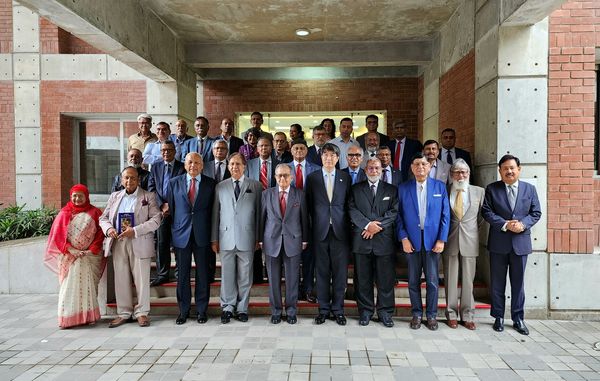
Japan ready to respond interim govt’s needs: Envoy
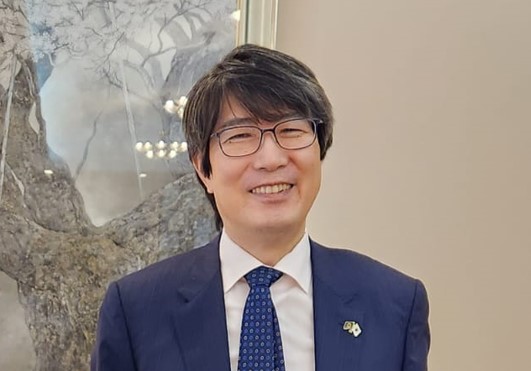
DHAKA, Sept 25, 2024 (BSS) – Japanese Ambassador to Bangladesh, IWAMA Kiminori, today reaffirmed Japan’s readiness to support Bangladesh’s interim government’s needs during its ongoing transitional period .
“We are ready to engage with all stakeholders of the new government and the people of Bangladesh to assess what is required under the current structure. Our stance is to respond to the needs and requests of the new government and offer cooperation accordingly,” he said.
The Japanese envoy said this while lecturing at a seminar on ‘Bangladesh-Japan Relation’ organized by the Association of Former Ambassadors (AOFA) at the Foreign Service academy in the capital.
Kiminori underscored the need for Japan’s commitment to assist Bangladesh in its reform initiatives, emphasizing cooperation to strengthen bilateral ties in key sectors, including business, defense, and people-to-people exchanges.
He also emphasized that Japan would align its efforts with the interests of its own society and the Japanese businesses operating in Bangladesh.
Presided over by AOFA President Ambassador Abdullah Al Hasan, the seminar was also addressed by Ambassador Gausul Azam and Ambassador Shahed Akhter.
Ambassador Farooq Sobhan, former Foreign Secretary also ambassador Masud Bin Momen and Professor Nailur Nahar from the Department of International Relations were among others present at the event.
Ambassador Kiminori highlighted that over 300 Japanese companies are currently operating in Bangladesh, none of which have decided to withdraw, despite security concerns during the transition period.
“For Bangladesh to continue its path toward becoming a prosperous society, more foreign investment is needed, including from Japan. To achieve this, the interim government needs to improve the business environment,” he stated.
The envoy emphasized the need for Bangladesh to continue improving its business environment, noting that bureaucratic complicacy remains significant barrier to attract investment.
Kiminori reiterated Japan’s support for Bangladesh’s economic growth, noting that Tokyo remains committed to fostering trade relations and investment through the ongoing Public-Private Joint Economic Dialogue (PPED).
He also mentioned about ongoing negotiation with the Economic Partnership Agreement (EPA), aimed at enhancing bilateral trade and investment.
Japan has been a longstanding development partner of Bangladesh, and the two nations elevated their relationship to a strategic partnership.
As part of this strategic partnership, Japan has shifted from providing development assistance to facilitating trade and investment in Bangladesh.
In a recent move, the two countries exchanged notes for a 575 million yen grant under Japan’s Official Security Assistance (OSA) for further strengthening their economic cooperation.
The envoy highlighted the alignment of Japan’s Free and Open Indo-Pacific (FOIP) strategy with Bangladesh’s Indo-Pacific Outlook, particularly in terms of inclusiveness and regional cooperation.
He emphasized the importance of peace, stability, and deepening economic ties for mutual prosperity in the region and beyond.
Touching upon internal security issues, Kiminori expressed optimism that the security situation in Bangladesh would stabilize soon, noting that Japan is closely monitoring developments and has communicated updates to its headquarters.
In terms of defense, Japan has supported initiatives to strengthen security cooperation between the two countries.
The ambassador mentioned Japan’s role in facilitating visits to Bangladesh’s National Defense College and expressed Japan’s intention to enhance collaboration in defense, security, and people-to-people exchanges.
Noting that people-to-people exchanges were identified as one of the key pillars of Bangladesh-Japan relations, Ambassador Kiminori stated that Japan remains committed to fostering closer ties through educational and cultural exchanges, as well as through initiatives such as the National Defense College tour.
The Japan External Trade Organization (JETRO)’s country representative in Bangladesh Yuji Ando also spoke on the occasion and stressed urgency for Japanese companies to explore and evaluate Bangladeshi market.
He urged the interim government to focus on reducing bureaucratic red tape, improving governance, and addressing issues such as corruption, all of which are critical to attract more investment.
Ando said this is the high time for Bangladesh to reset its business environment to attract more foreign investment.
He suggested that Bangladesh could streamline its government structure, pointing out that the country currently has 45 ministries, which may contribute to red tape.
As Bangladesh continues to navigate its transitional phase, Japan’s steadfast commitment to its long-term partnership with Bangladesh offers a beacon of support in areas ranging from economic growth and defense cooperation to fostering closer people-to-people ties.
In recent years, both countries have taken steps to deepen their relationship upgraded the tie from comprehensive partnership to strategic partnership, reflecting their shared interests in regional stability, economic development, and security cooperation.
The ongoing negotiation for the Economic Partnership Agreement (EPA) further signals the commitment of both nations to expanding bilateral trade and investment opportunities.
As Bangladesh continues its transition under the interim government, Japan’s involvement will be crucial in shaping the country’s economic and political landscape in the years to come.
8th September,2024
8th September,2024
Ambassador Md. Jashim Uddin,
Foreign Secretary,
Ministry of Foreign Affairs,
Government of the People’s Republic of Bangladesh,
Dhaka.
Dear Ambassador Jashim Uddin ,
On behalf of all Members of the Association of Former BCS (FA) Ambassadors (AOFA) and on my own behalf, I extend our heartiest congratulations to you on being appointed Foreign Secretary of the Government of the People’s Republic of Bangladesh.
We are delighted that one of the distinguished members of BCS (FA) has been entrusted with this responsibility of serving the nation at this critical juncture of our country’s history.
With kind regards,
Yours sincerely,
Ambassador Abdullah Al-Hasan,
President,
Association of Former BCS(FA) Ambassadors,
8th August, 2024
8th August,2024
Ambassador Md. Touhid Hossain,
Adviser,
Interim Government of the People’s Republic of Bangladesh,
Dhaka.
Dear Ambassador Touhid Hossain,
On behalf of all Members of the Association of Former BCS (FA) Ambassadors (AOFA) and on my own behalf, I extend our heartiest congratulations to you on being appointed an Adivser in the Interim Government of the People’s Republic of Bangladesh.
We are delighted that one of the esteemed members of AOFA has been entrusted with this responsibility of serving the nation at this critical juncture of our country’s history.
With kind regards,
Yours sincerely,
Ambassador Abdullah Al-Hasan,
President,
Association of Former BCS(FA) Ambassadors,
Dhaka.
8th August,2024
Ambassador Supradip Chakma,
Adviser,
Interim Government of the People’s Republic of Bangladesh,
Dhaka.
Dear Ambassador Supradip Chakma,
On behalf of all Members of the Association of Former BCS (FA) Ambassadors (AOFA) and on my own behalf, I extend our heartiest congratulations to you on being appointed an Adviser in the Interim Government of the People’s Republic of Bangladesh.
We are delighted that one of the esteemed members of AOFA Executive Committee has been entrusted with this responsibility of serving the nation at this critical juncture of our country’s history.
With kind regards,
Yours sincerely,
Ambassador Abdullah Al-Hasan,
President,
Association of Former BCS(FA) Ambassadors,
Dhaka.
3rd July,2024
A Brief Report on the Ambassadors’ Lecture Series organized by AOFA on 3rd June 2024
Ambassador Shahed Akhtar VP AOFA
Foreign Service Academy had the distinct honor of hosting a significant and interactive session with His Excellency PARK Young-Sik, Ambassador of the Republic of Korea to Bangladesh.
This event, meticulously organized by the Association of Former BCS (FA) Ambassadors (AOFA), brought together a distinguished gathering of senior former Ambassadors of Bangladesh and heads of Korean organizations, KOTRA and KOICA, and the Korean Embassy diplomats to foster dialogue and strengthen Bangladesh-Korea bilateral relations, with a particular emphasis on trade and investment.
The event commenced with a warm welcome extended by the AOFA Secretary General Ambassador Gousal Azam Sarker. In his opening remarks, he highlighted the significance of the occasion and the longstanding ties between Bangladesh and Korea. He emphasized the role of such interactions in enhancing mutual understanding and cooperation.
The session was graced by the presence of senior Ambassadors, especially notable ones those of our Ambassadors who had served in Korea including Ambassador Fazlur Rahman, Ambassador Iftikharul Karim, President of the Korean Export Processing Zone (KEPZ), Ambassador Jahangir Saadat, Ambassador Shafiullah and many others. Their presence underscored the deep-rooted connections .
Keynote Address by H.E. PARK Young-Sik :
He made an insightful keynote PowerPoint presentation shedding light on the current state of Bangladesh-Korea relations. He highlighted the robust economic partnership, with particular focus on trade and investment. Ambassador PARK elaborated on the potential areas for collaboration, emphasizing the importance of continued engagement and dialogue to unlock new opportunities for both countries.
The interactive session that followed the keynote address was marked by engaging discussions on various aspects of trade and investment. A large number of Senior Ambassadors shared their perspectives and experiences, enriching the dialogue with their valuable insights. The discussion touched upon several key areas namely :
Economic Partnership :
Participants delved into the current economic partnership between Bangladesh and Korea, exploring avenues for enhancing bilateral trade. They discussed strategies to attract Korean investments in Bangladesh, particularly in sectors such as textiles, technology, and infrastructure.
Challenges and Solutions :
The session also addressed the challenges faced in bilateral trade and investment. Participants identified regulatory hurdles, logistical issues, and market access barriers as key challenges. They proposed practical solutions to overcome these obstacles, emphasizing the need for policy reforms and streamlined processes.
Future Prospects :
Looking ahead, the discussions highlighted the future prospects for Bangladesh-Korea relations. Participants expressed optimism about the potential for increased trade and investment flows, driven by strategic collaborations and mutual interests.
The contributions of former Bangladesh Ambassadors to Korea were particularly noteworthy. Moreover, Ambassador Shamsher Mobin Chowdhury and Ambassador Jahangir Saadat, Ambassador Mohsin Ali Khan, Ambassador Nasim Firdous Ambassador Mosud Mannan and other Ambassadors shared their experiences and reflections on their understanding of Korea. Their insights provided a historical perspective on the evolution of bilateral relations and underscored the enduring friendship between the two nations.
Special thanks and acknowledgments were delivered by FSA Rector Ambassador Mashfee Binte Shams. The success of the event was attributed to the meticulous organization by the President of AOFA, Ambassador Abdullah Al-Hasan. His dedication and attention ensured a seamless and productive session. Ambassador Abdullah Al-Hasan’s efforts were widely appreciated by all who acknowledged his pivotal role in bringing together such a distinguished gathering.
Following the interactive session, participants were treated to a well-laid-out lunch. The luncheon provided an opportunity for further networking and informal discussions with the Koreans and amongst ourselves. We also had our young international trainee Foreign Service officers in our midst. We all got engaged in meaningful conversations. The convivial atmosphere fostered a sense of camaraderie and reinforced the spirit of cooperation amongst colleagues.
To conclude, the AOFA organized program at the Foreign Service Academy exemplified the importance of diplomatic engagement and dialogue in strengthening bilateral relations. The event was a testament to the power of diplomacy and the enduring friendship between Bangladesh and Korea. It underscored the importance of continued engagement, dialogue, and collaboration in achieving shared goals and aspirations.
The presence of senior Ambassadors coupled with the insightful contributions of H.E. PARK Young-Sik,made the session a resounding success. The discussions on trade and investment highlighted the potential for further growth and collaboration between Bangladesh and Korea.
As the event ended,there was a shared sense of optimism and commitment to advancing Bangladesh-Korea relations. The insights gained from the interactive session will undoubtedly help future efforts to enhance economic ties and foster mutual prosperity. AOFA remains dedicated to facilitating such meaningful interactions and contributing to the advancement of Bangladesh’s diplomatic objectives.
We very much hope our Rector of the Foreign Service Academy will enable us in hosting more such events in the future,fostering a spirit of cooperation and mutual understanding among nations.
—
3rd June, 2024
The Association of Former BCS (FA) Ambassadors (AOFA) arranged today, 3rd June,2024 , an interactive session with H.E. Mr. PARK Young-sik, Ambassador of the Republic of Korea to Bangladesh. The event was held in the Foreign Service Academy, Bailey Road, Dhaka , in which former senior Ambassadors of Bangladesh interacted with the Ambassador of ROK, on different aspects of Bangladesh-Korea bilateral relations with particular focus on trade and investment.
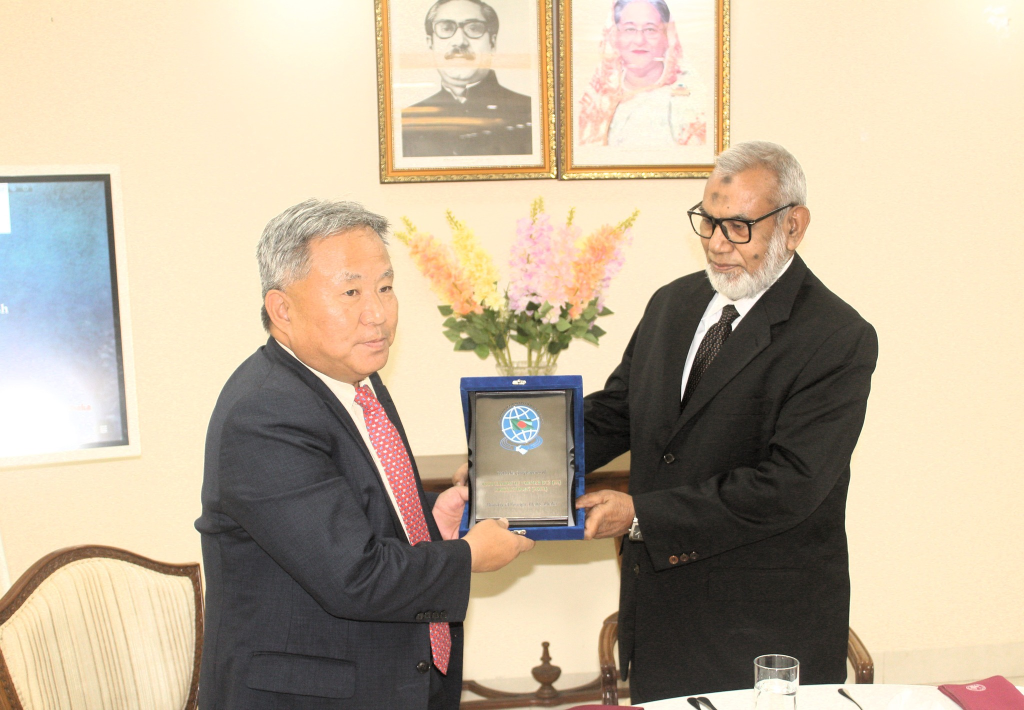

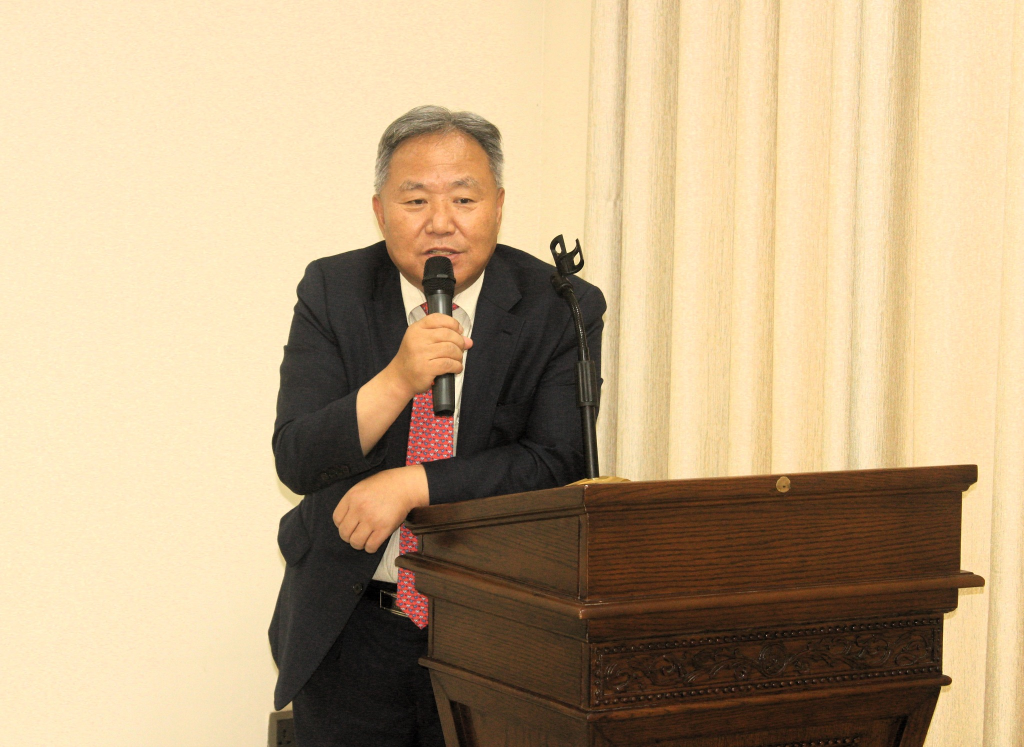

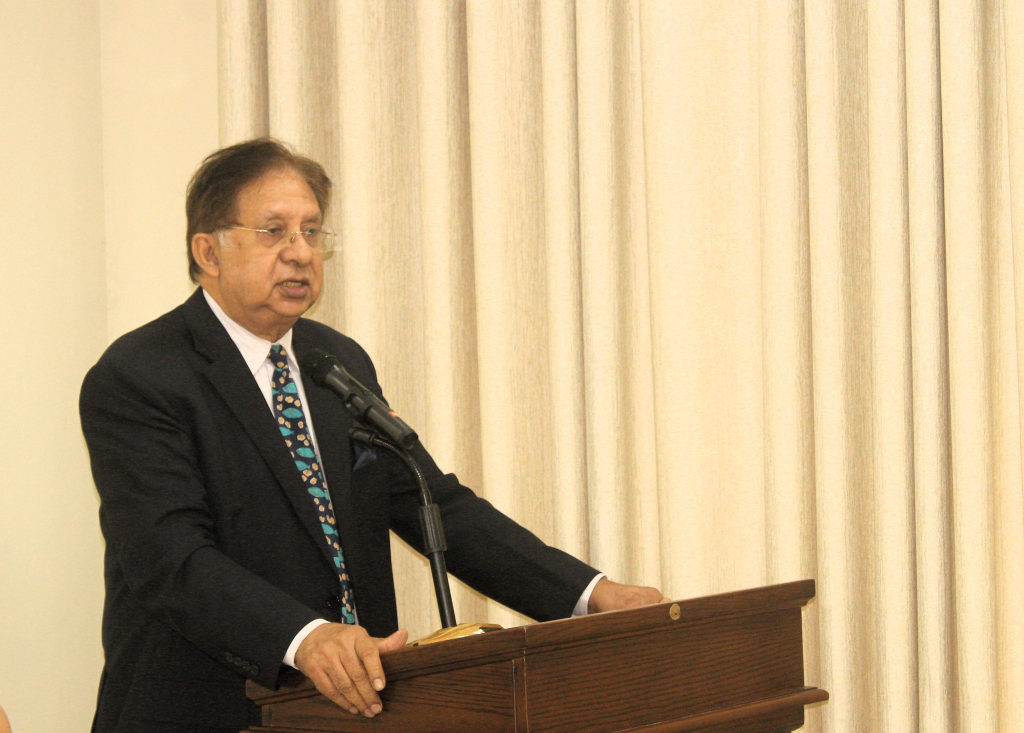


20th May, 2024
A small report for AOFA Members from Shahed Akhtar
Dear Ambassador Colleagues,
Like to share my thoughts on the Cultural event organized by AOFA, a special thanks to Nazrul and Atiq, and Rector Mashfee. We definitely enjoyed the evening, a profound sense of unity and camaraderie enveloped us all as we gathered at the FSA on 18th May 2024 to celebrate Eid and Bangla NoboBarsho.
Big thanks to Nazril and Atiq our Event coordinators who meticulously organized and exquisitely choreographed cultural events. Excellent time management.
I extend my heartfelt congratulations to all esteemed members of the Association of Former Ambassadors (AOFA), President Abdullah Bhai and our talented GausulAzam Secretary-General, and all those who dedicatedly undertook the formidable task of orchestrating this evening of harmony, and enjoyment, and, to some extent, the serendipitous exploration of talents.
A special acknowledgment to the Rector Ambassador MashfeeMme of the Foreign Service Academy for graciously providing us with the splendid venue and ensuring a delightful menu for the evening.
Additionally, I extend my sincere gratitude to the Foreign Secretary and Senior Secretary Ambassador Masud bin Momin and Mme for gracing us with their presence, which added to the significance and prestige of the occasion.
Tonight’s event was not merely a cultural extravaganza; it was a testament to the enduring spirit of unity and collaboration among the members of the AOFA, It provided a platform for us to come together, celebrate our shared cultural heritage, and forge stronger bonds of friendship and solidarity.
The performances showcased tonight were not only a reflection of our rich cultural heritage but also a celebration of the diversity and vibrancy of Bangladeshi art and tradition. From mesmerizing dance performances to soul-stirring musical renditions, each act captivated the audience and left an indelible impression on our hearts and minds.
As we watched all our in-house talented artists take center stage, it was evident that behind every graceful movement and melodious note lay hours of dedicated practice and unwavering commitment. Their performances served as a reminder of the immense talent and creativity that abound within our midst. Moreover, tonight’s event served as a platform for fostering greater understanding. It provided an opportunity for us to showcase the rich tapestry of Bangladeshi culture and tradition. Beyond the cultural performances, tonight’s gathering also provided a forum for engaging exchanges and meaningful interactions amongst colleagues. It was a chance for us to exchange ideas, share experiences, and explore avenues for collaboration and mutual cooperation in various spheres.
As we come together to celebrate Eid and Bangla NoboBarsho, let us not only revel in the festivities but also reflect on the values of unity, friendship, and solidarity that define our AOFA spirit. Let us cherish the bonds that unite us and reaffirm our commitment to be together for the greater good of our nation and our remaining years.
In conclusion, I extend my heartfelt gratitude to all those who contributed to making tonight’s event a resounding success. Your dedication, hard work, and unwavering commitment have truly made this evening a memorable and joyous occasion for us all. May we continue to come together in the spirit of camaraderie and collaboration, strengthening the bonds of friendship and cooperation that unite us as members of the AOFA.
With Warm Regards,
Shahed Akhtar, VP AOFA
19th May,2024
My dear President,
I would like to join Ambassador Shameem Ahsan in Congratulating you and all other members of AOFA for hosting such a wonderful event featuring a colourful cultural programme. The presence of majority of AOFA members and their graceful spouses made the gathering truly special and memorable.
You all deserve a big thanks for an enjoyable evening.
Regards,
Nasima Haider
A subliminal feeling of togetherness came to be palpable this evening for all of us through a very well organised, meticulously choreographed cultural show. Congratulations to AOFA, its esteemed President, the Secretary General and all who shouldered the onerous task of putting together this evening of amity, enjoyment and, to some extent chance discovery of latent talent. A big thanks to the Rector of Foreign Service Academy for the opportunity to use the wonderful venue and for a healthy menue. And thanks also to the Foreign Secretary for being with us.
M. Shameem Ahsan
Former Secretary and Ambassador
Member, PSC
19th May, 2024
The Association of Former BCS (FA) Ambassadors (AOFA) arranged yesterday , 18th May,2024 an Eid Reunion and Nabobarsho Celebration program at the Foreign Service Academy, Bailey Road, Dhaka. The event was participated by Former senior Ambassadors, the Foreign Secretary (Senior Secretary), and senior officials of the Ministry and their spouses.



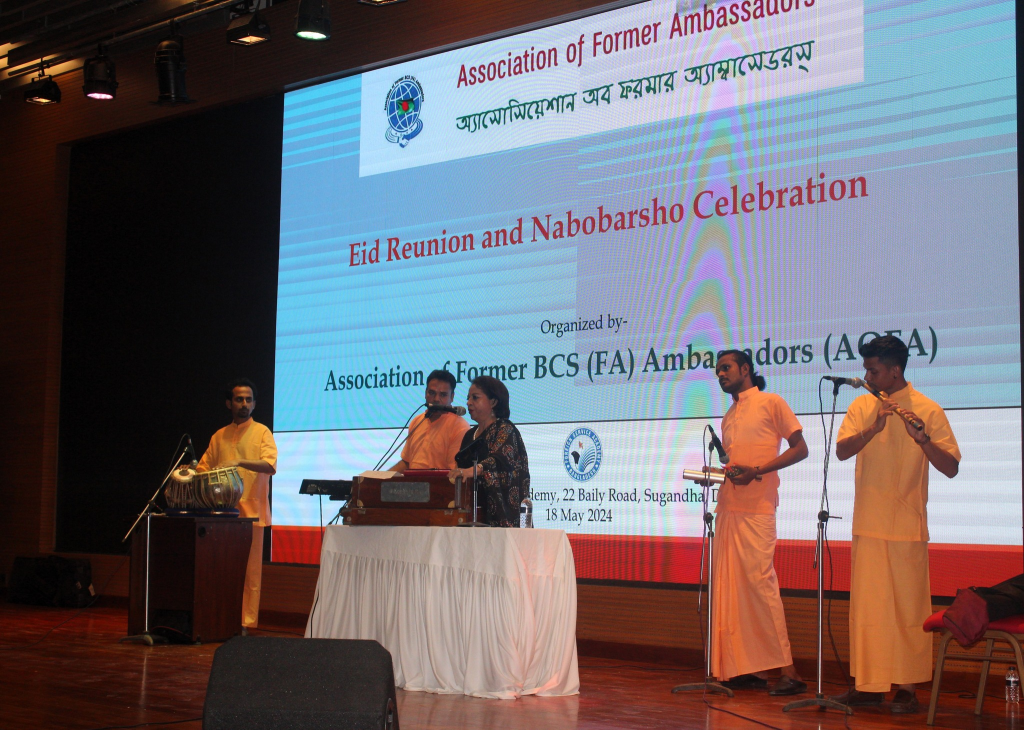




18th May,2024
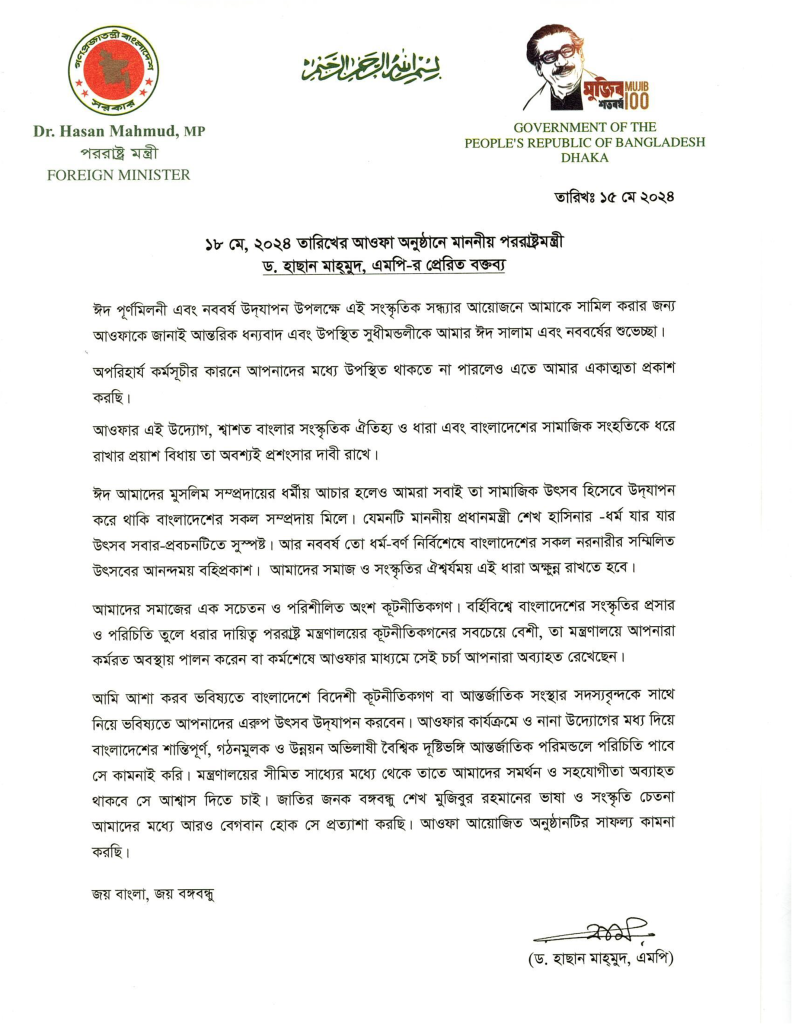
11th May,2024
Seminar on :
Implications of ongoing conflict in
Rakhine to Rohingya Return
Jointly organized by :
Association of Former BCS (FA) Ambassadors (AOFA),
Centre for Peace and Justice (CPJ), BRAC University and
Foreign Service Academy.
Keynote Speaker : Dr. Emma Leslie,
Senior Advisor
Centre for Peace and Conflict Studies, Cambodia.
Moderator : Barrister Manzoor Hasan OBE
Executive Director, Centre for Peace and
Justice, BRAC University, Dhaka
Mr. Moinul Kabir Mia, Director General (Myanmar),Ministry of Foreign Affairs, Dhaka
with President and other office bearers of AOFA Executive Committee.

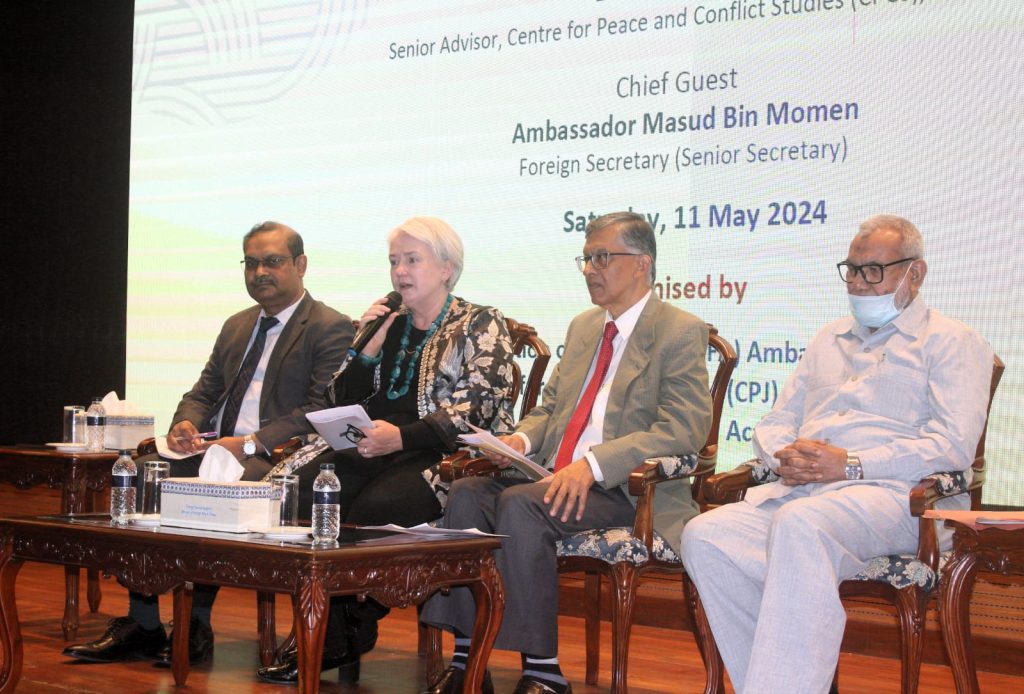
14th March, 2024
Hon’ble Foreign Minister of Bangladesh Dr. Hasan Mahmud, MP
with President and other office bearers of newly elected AOFA Executive Committee.
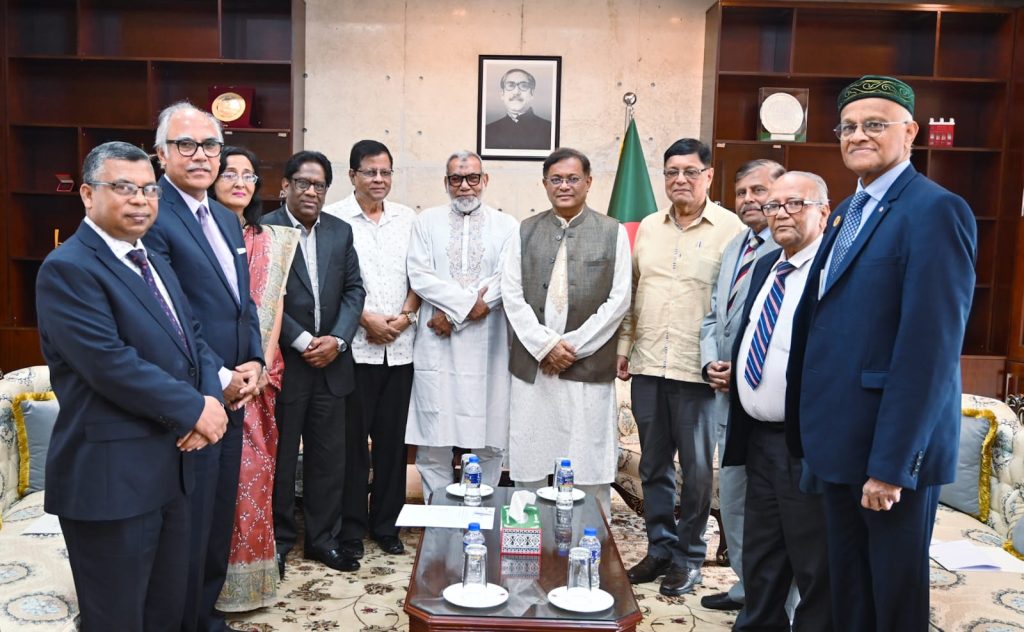
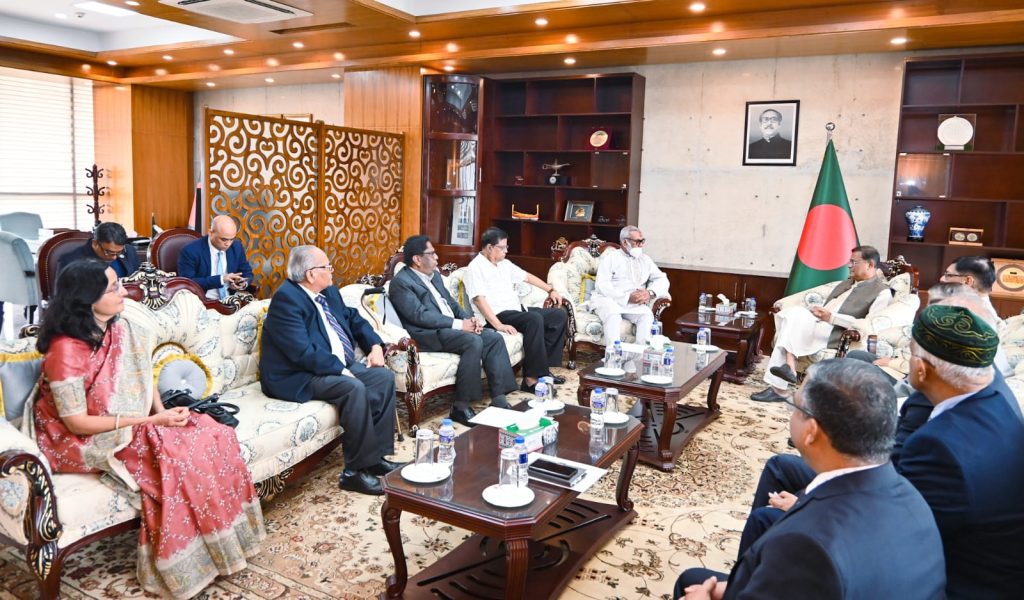
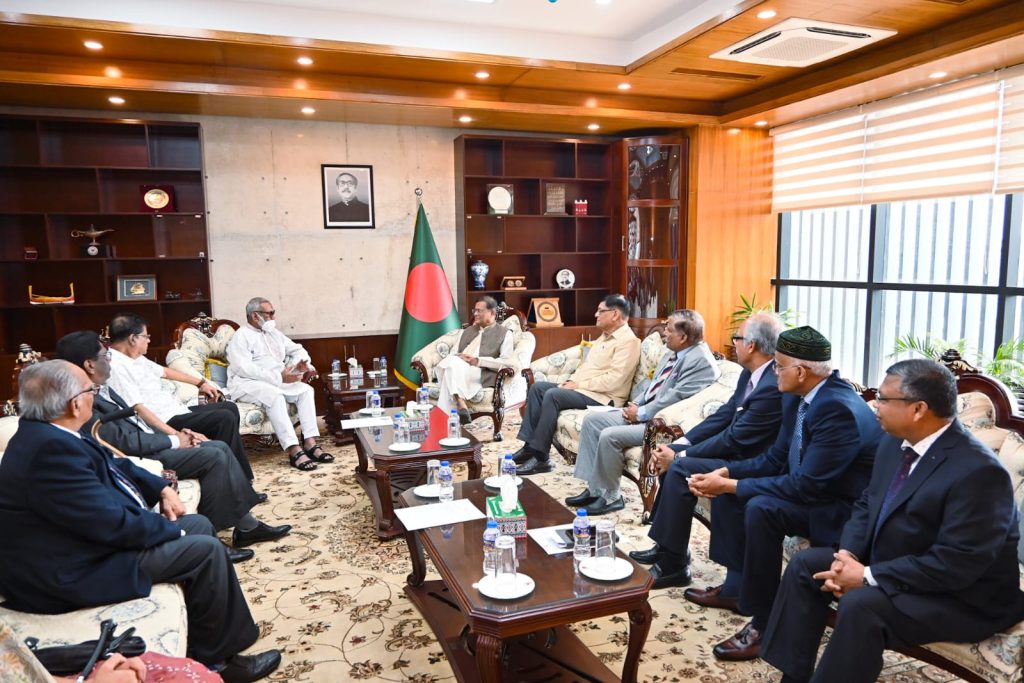
The newly elected AOFA-EC called on Hon’ble Foreign Minister at his office on 14 March 2024.
AOFA-EC extended warm felicitations to HFM on his assumption of office as the Foreign Minister of Bangladesh and expressed keen desire to work closely with the Ministry of Foreign Affairs to expand the outreach of the Ministry. AOFA-EC members expressed their desire to be closely associated with MOFA activities.
HFM suggested that AOFA could participate in all the programs organized by MOFA and in this way remain closely connected with the Ministry. HFM also suggested BIISS to invite the AOFA members at seminars and other programs by the Institute.
AOFA-EC thanked HFM for his time and good wishes for the Association.
10 March, 2024
“ভিন্ন আমেজের আনন্দ ভ্রমন”
KEPZ, ১-৩ মার্চ, ২০২৪।

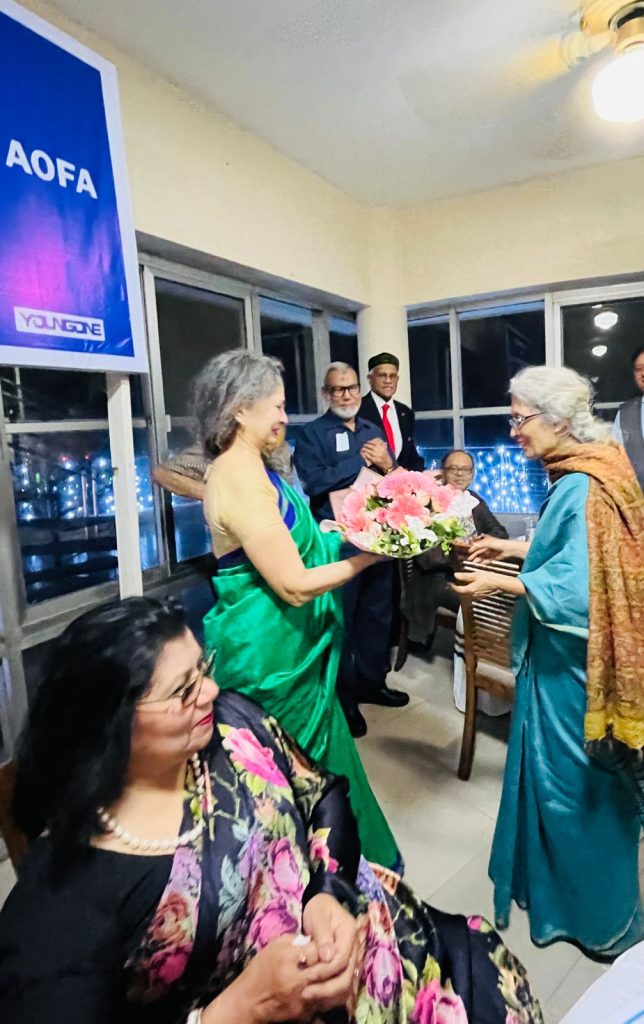
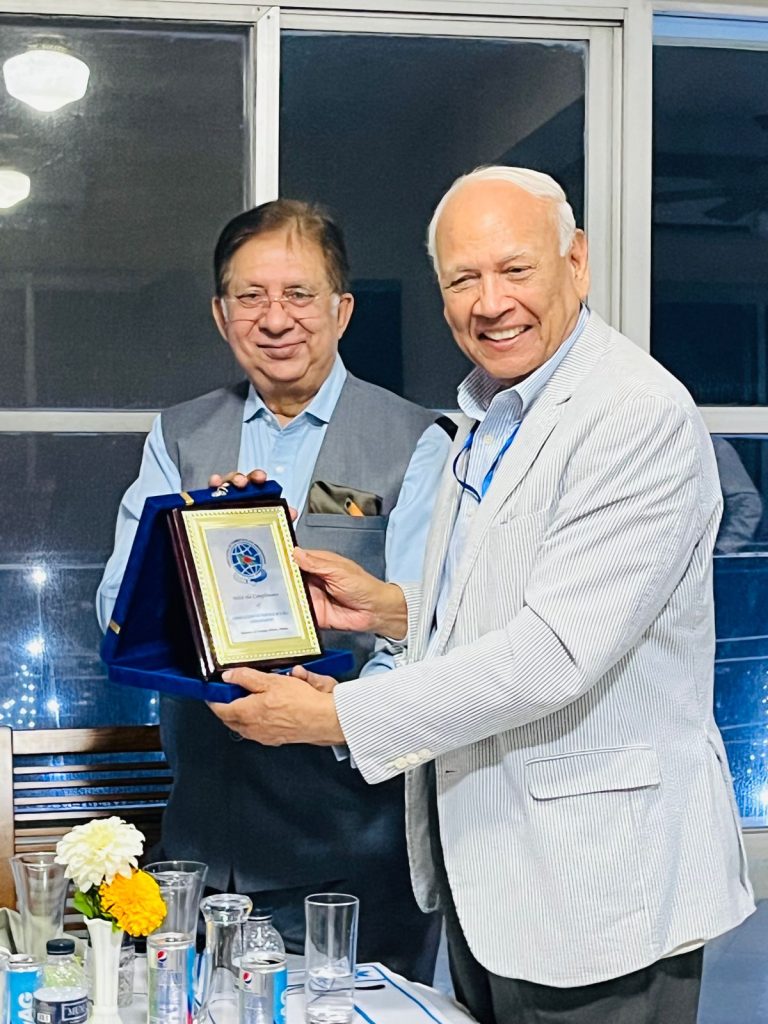
আমার মার্চ ২০২৪, শুরু হয় ভিন্ন আমেজে। ১লা মার্চ বেশ সকালে তৈরী হয়ে ছুটলাম রমনা পার্কের কাছে ফরেন সার্ভিস একাডেমীতে। প্রাক্তন রাষ্ট্রদূত জনাব জাহাঙ্গীর সাদত পররাষ্ট্র মন্ত্রণালয়ের অবসরপ্রাপ্ত রাষ্ট্রদূতদের এসোসিয়েশনের (Association Of Former BCS(FA) Ambassadors : AOFA) সদস্যদের স্পাউজ সহ চট্টগ্রামে যাবার আমন্ত্রণ জানিয়েছেন। যিনি ১৯৯৫-৯৬ কলকাতায় ডেপুটি হাই কমিশনার ছিলেন। নমি ভাবীকে তখন থেকেই চিনি, আমার দেখা সবচেয়ে সুন্দর মনের, খুব ভাললাগা, মনে রাখার মত একজন আদর্শ নারী।
ঘড়ির কাঁটা ধরে ঠিক এগারোটায় শুরু হয়েছে আমাদের আনন্দ যাত্রা। দুপুর দুইটায় যাত্রা বিরতি কুমিল্লায় নূরজাহান হোটেলে। সবাই মিলে খুব আনন্দ করে সাদা পোলাওয়ের চালের ভাত, ঝাল পিয়াজ-মরিচ আর মাছের ভর্তা দিয়ে ভাত খেয়ে যখন রীতিমত সুসাচ্ছি, ঠিক তখনি রসমালাই আর দুধ চা ছিল প্রাণ জুড়ানো।
একসাথে আমরা উনিশ জন। আছেন এসোসিয়েসনের বর্তমান এবং প্রাক্তন সভাপতি যথাক্রমে জনাব আবদুল্লাহ আল হাসান এবং জনাব শমসের মোবিন চৌধুরী। মিসেস নাগমা করিম। আছেন কতিপয় রাষ্ট্রদূতঃ জনাব এম. শফিউল্লাহ, জনাব শাহেদ আকতার-ডা. সিমিন আকতার, জনাব মোঃ আজিজুল হক-সাজিদা হক, জনাব গোলাম মোহাম্মদ-শামসুন্নাহার, জনাব মসউদ মান্নান-নুজহাত, মাজেদা রফিকুন্নেসা, জনাব মিজানুর রহমান-নিশাত রহমান, জনাব চৌধুরী ইখতিয়ার মোমেন-লীনা চৌধুরী, জনাব আবদুল হান্নান এবং আমি শেলীনা আফরোজা। ওদিকে জনাব সুপ্রদীপ চাকমা-নন্দিতা আসছে রাঙ্গামাটি থেকে। বিস-এর কম্পিউটার অপারেটর জনাব আহমেদুর রহমান সরকার অত্যন্ত দক্ষ হাতে সমন্বয়কের গুরু দ্বায়িত্ব পালন করেছেন।
দীর্ঘপথ আড্ডা আর জানালা দিয়ে সবুজ শ্যামল বাংলার প্রাকৃতিক দৃশ্য উপভোগ করতে করতে পৌঁছে যাই চট্টগ্রামের আনোয়ারা উপজেলায় অবস্থিত কোরিয়ান রপ্তানী উন্নয়ন জোন (KEPZ) এর গেষ্ট হাউজে। জাহাঙ্গীর সাদত স্যার এবং নমি ভাবী আমাদের সম্ভাষণ জানালেন। ছোট্ট সাদা ঠান্ডা টাওয়েলে হাত মুখ মুছে স্ন্যাকস আর শীতল ফ্রেশ জুস দিয়ে আপ্যায়িত হলাম। প্রত্যেকের লাগেজ ততক্ষণে পৌঁছে দেয়া হয়েছে নির্ধারিত কক্ষে। আমাদের জন্য বরাদ্দ তিনতলায় ২১১-২১২ নম্বর কক্ষ। পাঁচতারা হোটেলের আদলে সাজানো সবকিছু, বেডরুমের পাশে একটা সাজানো ডাইনিং রুম এবং দুটো রুমের সাথেই আধুনিক বাথরুম। বুঝতে পারছিলাম না কোথায় আছি। রাতে গেষ্টহাউজের বিশাল ডাইনিং হলে সবাই একসাথে বাফে ডিনার উপভোগ করলাম। সার্ভিসম্যানদের শোভন আচরন দেখে মনে হচ্ছিল আমরা বাড়ীতেই আছি। জাহাঙ্গীর স্যার জানিয়ে দিলেন সকাল আটটায় প্রাতঃরাশ হবে একই ডাইনিং হলে। হান্নান আর সুপ্রদীপকে নিয়ে ভোর সাড়ে পাঁচটায় জাহাঙ্গীর স্যার চলে গেলেন গলফ খেলতে। জানলাম এটি বাংলাদেশের দীর্ঘতম গলফ ক্লাব।
২ মার্চ সকাল, প্রাতঃরাসের আয়োজন ছিল অপূর্ব। এবারে সার্ভিসম্যানরা স্যুপ, তাওয়া থেকে তুলে আনা গরম রুটি, টোষ্ট, ডিম পোজ, চিকেন কারি, মধু দিয়ে ওয়াফার সার্ভ করলেন অত্যন্ত পেশাদ্বারিত্বের সাথে। এসব খাবার প্রতিদিনই ঘরে খেয়ে থাকি কিন্তু সবাই একসাথে বলে কিনা জানিনা সবকিছু মনে হয়েছে অতুলনীয়। টেবিলে রয়েছে দুধ এবং জুস। নমি ভাবী বললেন, “শেলীনা, গরুর খাঁটি দুধ একটু খেয়ে দেখো, ঢাকায় এমন পাবে না।” খেয়ে কি যে ভাল লাগলো। পরদিন ৩ মার্চ সকালে নাস্তায় চায়ের বদলে এক গ্লাস দুধ প্রাণভরে উপভোগ করলাম। সেদিন প্রাতঃরাশের আয়োজন ছিল একটি টিলার উপর ব্যাম্বু হাউজে। কাঠের খুঁটির উপর চাটাই দিয়ে ঘেরা সম্পূর্ন নতুন ধরনের ছয়কোনা ঘরটি তৈরী করা হয়েছে KEPZ এর চেয়ারম্যান মিঃ কিহাক সাং-এর নিজস্ব কল্পনা থেকে। এখানে সবকিছুতেই নতুনত্বের ছোঁয়া।
দশটায় গেষ্ট হাউজের কনফারেন্স রুমে কোরিয়ান ইপিজেড সম্পর্কে বিস্তারিত জানানো হলো, পাশাপাশি দেখলাম একটা ডকুমেন্টারি। দক্ষিণ কোরিয়ার ব্যাক্তি মালিকানাধীন এ প্রতিষ্ঠানের কর্ণধার মিঃ কিহাক সাং (Kihak Sung)। যখন ইউরোপ এবং আমেরিকা সাউথ কোরিয়াতে কোটা প্রবর্তন করলো, বাংলাদেশ তখনো কোটা ফ্রি সুবিধাপ্রাপ্ত। দূরদর্শী গার্মেন্টস ব্যবসায়ী মিঃ সাং সেই সুযোগ কাজে লাগাতেই বাংলাদেশে চলে আসেন, তাঁর YOUNGONE কোম্পানীর নেতৃত্বেই চট্টগ্রামে গড়ে ওঠে এই বিশাল প্রতিষ্ঠান। ২৫০০ একর জমির উপর নির্মিত এই KEPZ এ ২০ হাজারেরও বেশী কর্মী নিয়োজিত আছেন। বাংলাদেশের কতিপয় অভিজ্ঞ স্থপতির সমন্বয়ে এখানকার ভবন সমূহ নির্মিত হয়েছে। প্রকৃতিক বৈশিষ্ট অটুট রেখে টিলা এবং পাহাড়ের উপরেই অপূর্ব নির্মানশৈলীর ভবন সমূহ নজরকাড়া। একসময় জেএ এসোসিয়েটস এর সাথে কাজ করার সুবাদে আমার ছোট ভাই স্থপতি রেজাউল কবীর কচির ডিজাইনে করা মহিলা হোষ্টেল এবং অফিস ভবনের নির্মান কাজ দেখে আমি আপ্লুত।
ফ্যাক্টরি সমূহের ছাদে বসানো হয়েছে অগনিত সোলার প্যানেল। সেখানে পিক আওয়ারে ৩৫ মেগাওয়াট বিদ্যুৎ উৎপাদিত হচ্ছে। প্রয়োজনের অতিরিক্ত বিদ্যুৎ মূল গ্রীডে যাচ্ছে, বিনিময়ে তার মূল্য পাচ্ছে। অনেকগুলি লেক খনন করে সেখানে তৈরী করা হয়েছে বাংলাদেশের বৃহত্তর মনোরম রিজার্ভার।
সবচেয়ে বিস্ময়কর, এই প্রতিষ্ঠানের চেয়ারম্যানের মিঃ কিহাক সাং সামাজিক দ্বায়বদ্ধতার অংশ হিসেবে ইয়ংওয়ান করপোরেশন ২০ লক্ষ ডলার ব্যয়ে সোনারগাঁওয়ের জরাজীর্ণ বড় সরদার বাড়ীটি পুরোনো মূল ভবনের আদলে কতিপয় অভিজ্ঞ স্থপতির সহায়তায় যথাযথভাবে সংরক্ষণের ব্যবস্থা করেন। তিনি এক সাক্ষাৎকারে বলেছেন, এটি বাংলাদেশের বড় সম্পদ, তাই এটিকে টিকিয়ে রাখার তাগিদ বোধ থেকেই খুব ভালবেসে কাজটি করেছেন। তাঁর এই বদান্যতা প্রশংসার ধন্য।
আমরা এক এক করে গার্মেন্টস, জুতা, সোলার প্ল্যান্ট এবং ম্যান মেড সিনথেটিক ফেব্রিক্স তৈরীর ফ্যাক্টরিসমূহ পরিদর্শন করলাম। পুরোটা সময় জাহাঙ্গীর স্যার, তাঁর এমডি জনাব শাহজাহান এবং ডিজিএম জনাব মুশফিকুর রহমান আমাদের সঙ্গে ছিলেন। সবকিছুর বিশালতা দেখে প্রাথমিকভাবে অভিভূত হই। দ্বিতীয়ত পরিচ্ছন্নতা, পেশাদ্বারিত্বের সাথে ফ্যাক্টরী পরিচালনা, নারী- পুরুষ নির্বিশেষে কর্মীদের পরনে এ্যাপ্রোন, হাতে গ্লভস, চেহারায় স্বস্তির ভাব আমাকে ভীষনভাবে আকৃষ্ট করে। কর্মচারীদের জরুরী চিকিৎসার জন্য রয়েছে একটি মেডিকেল সেন্টার। সেখানে সার্বক্ষণিক ডাক্তার থাকেন, বিনা মূল্যে ওষুধ দেয়া হয়। দশ শয্যা বিশিষ্ট হাসপাতাল ভবন নির্মান কাজ চলছে। চাইল্ড কেয়ার সেন্টারে গিয়ে দেখি ছয়মাস থেকে তিন বছরের অনেকগুলো শিশু একসাথে মনের আনন্দে নাচছে। মেয়ে শিশুরা পরেছে হলুদ জামা আর ছেলেরা সবুজ। এরা ফ্যাক্টরীতে কর্মরত মেয়েদের সন্তান। চাইল্ড কেয়ার সেন্টারের ইনচার্জ মিজ্ নুরুন নেসার কাছ থেকে জানলাম, এখানে নারী কর্মীদের পূর্ণ বেতনে তিন মাসের মাতৃত্বকালীন ছুটি দেয়া হয়। চাইল্ড কেয়ার সেন্টারে শিশুদের ব্রেষ্ট ফিড করানোর ব্যবস্থা রয়েছে। সেখানে শিশুদের জন্য বিশেষ খাবার তৈরী হয়, ওদের তত্ত্বাবধানের জন্য প্রয়োজনীয় সংখ্যক আয়া নিয়োজিত রয়েছেন। ফ্যাক্টরীতে নারী কর্মীদের চেহারায় স্বস্তির ভাব থাকার মূল রহস্য বুঝতে কস্ট হয় না।
বিদেশী ক্রেতাদের জন্য এখানে তৈরী বিভিন্ন পোষাকের নমুনা সাজিয়ে রাখা শো রুমে গিয়ে আমার বিস্ময় আরো বেড়ে যায়। বিশ্বের নামী দামী সব ব্র্যান্ডের গার্মেন্টস তৈরী হচ্ছে। কোচ কোম্পানীর দামী ব্যাগও ডিসপ্লেতে রয়েছে। এখানে অনেক ডিজাইনার উদ্ভাবন/গবেষনা কাজ করছেন পোষাকের ডিজাইনের উপর। সেখানে কয়েকটি ডিজাইন ডেভেলাপমেন্ট সেন্টার আছে, ক্রমান্বয়ে মোট ১০টি ডিজাইন সেন্টার নির্মানের পরিকল্পনা রয়েছে।
কর্মচারীদের মধ্যাহ্ন ভোজের ব্যাবস্থা দেখতে প্রথমে গেলাম কিচেনে। এমন কিচেন এই প্রথম দেখলাম। বিশাল আলমারির পাল্লা খুলতেই দেখি উপর থেকে নীচে থরে থরে বড় বড় ট্রেতে সারিবদ্ধভাবে রান্না হয়েছে ধুমায়িত ভাত। এটি একটি বৃহত আকারের স্বয়ংক্রিয় রাইস কুকার। ডাল, তরকারী, ডিম ইত্যাদি রান্না হচ্ছে বৈদ্যুতিক চুল্লীতে, সেখানে হাতের ছোয়া ব্যাতীত হাইজিন মেনটেইন করে সব কিছু তৈরী হচ্ছে। ডাইনিং হলে গিয়ে দেখি মেয়েরা চামচ দিয়ে ভাত খাচ্ছেন। হলে কোনো বেসিন রাখা হয়নি। বিষয়টি স্বাস্থ্য সম্মত। সব বিশেষায়িত চুল্লী আমদানীকৃত। খাবার টেবিলে দেখি ডিম্পল নামের এক মেয়ের পাতে দুটো ডিম। জানতে চাইলে বললো তার বন্ধু আজ খাবে না তাই কূপনটা ওকে দিয়ে গেছে। এখানে মাত্র দুই টাকার বিনিময়ে সকল কর্মীর মধ্যাহ্ন ভোজের ব্যবস্থা রয়েছে। পরিদর্শন শেষে বেরিয়ে আসছি, আমরা তৃষ্ণার্ত, একজন ছোট বোতলে ভরা ডাবের পানি আমাদের হাতে তুলে দিলেন। ঠিক ঐ সময়ে ডাবের সুস্বাদু পানিকে মনে হয়েছে অমৃত সুধা।
আমরা দুপুরের খাবার খেলাম “হিল হাউজে”, খাবারের বৈচিত্র মন কাড়া। ছাদ থেকে দেখলাম চারিদিকে ঘন সবুজ নয়ন জুড়ানো বনায়ন। প্রচুর ফল, মশলা, কাঠ ও নানা জাতের ওষুধি গাছ রোপন করা হয়েছে। সবকিছুই হচ্ছে খুবই পরিকল্পিতভাবে। এখানে গরুর খামারও গড়ে উঠেছে, দুধ-মাংস সবই জীবন যাপনের সুবিধার্থে অতি স্বল্প মূল্যে শিল্পে নিয়োজিত কর্মীদের ও কর্মচারীদের কাছে বিক্রির বন্দোবস্ত রয়েছে।
সাড়ে তিনটায় আমাদেরকে কর্ণফুলী নদীর ঘাটে নেয়া হলো, “পানকৌড়ি” নামক স্পীড বোটে, সাড়ে চারটা পর্যন্ত চললো আমাদের নৌ-ভ্রমন। সবাই একসাথে আড্ডায় মেতেছি, নির্ভাবনায় ভেসেছি নদীর পানিতে। ভাল লাগা ছিল সীমাহীন। কর্ণফুলীর ঘাটে একটি জেটি নির্মানের পরিকল্পনার কথা জানলাম। ভ্রমন শেষে আমরা গেলাম সান সেট ডেকের বিশাল বারান্দায়। মনে হলো সূর্যটা নিমেষে বিশাল আকাশ এবং নদীর পানিতে গাড়ো লাল রং ঢেলে দিয়েছে। গোধূলীর হলুদ আভায় সবার ছবি হচ্ছে অপূর্ব। ছবিতে যেনো নিজেকেই চিনতে কষ্ট হচ্ছে। এরই মাঝে শমসের মোবিন স্যার দরাজ গলায় গেয়ে উঠলেন,
“সূর্য ডোবার পালা আসে যদি আসুক বেশ তো, গোধূলীর রঙে হবে এ ধরণী স্বপ্নের দেশ তো, বেশ তো”।
কফির আমেজ শেষ না হতেই সূর্যটা কর্ণফুলী নদীর পানিতে অবগাহন করলো। জানিয়ে গেল, প্রতীক্ষায় থাকো আরো সুন্দর দিনের।
রাতে আমরা ডিনার করলাম গলফ ক্লাব হাউজে। সম্পূর্ণ ভিন্ন ধরনের সবুজ আলোকসজ্জা ক্লাবটিকে করেছে আরো আকর্ষনীয়। মনোহরণকারী বিভিন্ন আয়োজনের জন্য সবার পক্ষ থেকে কৃতজ্ঞতা জানিয়ে নমি ভাবীর হাতে ফুলের তোড়া তুলে দিলেন নাগমা করিম ভাবী। AOFA -এর বর্তমান সভাপতির অনুরোধে প্রাক্তন সভাপতি শমসের মোবিন চোধুরী ধন্যবাদ জানিয়ে ক্রেষ্ট তুলে দিলেন প্রতিষ্ঠানের প্রেসিডেন্ট জাহাঙ্গীর সাদতের হাতে। কৃতজ্ঞতা জানিয়ে শুভেচ্ছা বক্তব্য রাখলেন, আওফা-র সভাপতি জনাব আবদুল্লাহ আল হাসান। জাহাঙ্গীর স্যারের স্বস্তির হাসি এবং বক্তব্য থেকে বুঝতে কষ্ট হয়নি তিনি আমাদেরকে তাঁর কর্মযজ্ঞের সাথে পরিচিত করাতে পেরে কতটা সুখী হয়েছেন।
ডা. সিমিন ভাবীর অনুরোধে আমাকেও কিছু বলতে হলো। বললাম, পররাষ্ট্র ক্যাডারের কর্মকর্তার সাথে সংসার করতে গিয়ে দেখেছি বিদেশ বিভূঁয়ে আত্মীয় পরিজন ছাড়া বড় হলেও আমাদের সন্তানদের আঙ্কেল আন্টির ভালবাসার অভাব হয়নি। সম্পূর্ণ আয়োজন জুড়ে প্রতি মুহূর্তে আমার প্রাণের ভেতর রবিঠাকুরের সেই কালজয়ী লেখাটাই অনুরণিত হয়েছে। মনে হয়েছে লেখাটি তিনি লিখেছিলেন বোধকরি এই আয়োজনে অংশগ্রহনকারী তথা পররাষ্ট্র ক্যাডারের কর্মকর্তাদের জন্যই ।
“বহু দিন ধ’রে বহু ক্রোশ দূরেবহু ব্যয় করি বহু দেশ ঘুরেদেখিতে গিয়েছি পর্বতমালা,দেখিতে গিয়েছি সিন্ধু।দেখা হয় নাই চক্ষু মেলিয়াঘর হতে শুধু দুই পা ফেলিয়াএকটি ধানের শিষের উপরেএকটি শিশিরবিন্দু।
– রবীন্দ্রনাথ ঠাকুর “
মাননীয় প্রধান মন্ত্রী শেখ হাসিনার ঘোষিত রূপকল্পে সমগ্র বাংলাদেশে ১০০টি ইপিজেড স্থাপনের ঘোষনা শুনে আসছি দীর্ঘদিন থেকে। বিদেশী অর্থায়নে দেশের প্রথম বেসরকারী ইপিজেডের সফল বাস্তবায়ন স্বচোক্ষে দেখার সুযোগ হলো এই প্রথম। অনুভব করতে পারি বাংলাদেশ কিভাবে উন্নত সমৃদ্ধ দেশে উন্নীত হওয়ার দিকে এগিয়ে যাচ্ছে। কত সহস্র কর্ম সংস্থান নারী-পুরুষ নির্বিশেষে সংস্লিষ্ট এলাকার জনগনকে সন্মানিত স্থানে নিয়ে যাচ্ছে প্রতিনিয়ত তা বলার অপেক্ষা রাখে না। কথা বলতে গিয়ে আবেগে আপ্লুত হয়েছি, অজান্তেই চোখ ভিজেছে, গর্ব হয়েছে খুউব। আর তাই রবি ঠাকুরের কথা ধার করে মনের অজান্তেই বলেছিঃ
“সার্থক জনম আমার জন্মেছি এই দেশে”।
শেলীনা আফরোজা, পিএইচডি
প্রাক্তন সচিব।
নিকুন্জ, ১৫-০৩-২০২৪
12 March,2024
Esteemed Members,
Assalam alaikum.
The trip to Korean Export processing Zone in Chittagong organized by AOFA from 1st March to 3rd March, 2024 was a truly enjoyable one.
In response to an invitation extended by the Senior Vice President of AOFA and President of KEPZ, Ambassador Jahangir Saadat, 19 AOFA Members and their spouses travelled by bus to Chittagong. Two more couples joined the team at the KPEZ Guest House.
The Korean Export Processing Zone is situated on the banks of the Karnaphuli River on an area of about 2500 acres of land. Over 52% of the land is under green and it is the most eco-friendly EPZ in the Asia-Pacific region. Over the years,KEPZ has planted over 2.7 million plus trees of multiple species and created 25 water bodies/lakes conserving over 700 million gallons of rainwater, thus making it the largest rainwater harvesting project in Bangladesh.
This has resulted in the re-emergence of the flora and fauna including 137 species of birds settling in the area. Interestingly, even wild elephants have found the manmade jungles attractive and safe enough to settle down there. At present, 4/5 elephants are seen enjoying themselves in the lake waters.
KPEZ has also the largest solar power rooftop project in the country, in the works, already producing 37 MW of electricity out of the planned 60 MW. On weekdays, 25 MW is consumed by the factories and the rest is transferred to the national grid. On Fridays when the factories are closed, the entire amount of electricity is transferred to the national grid.
At present, 43 environment-friendly factories have been completed in the manufacturing sector with 8 more factories under construction. Plans are afoot to set up another 63 factories.
With all these facilities up there, our visit to KEPZ was all set to be a most pleasant, worthwhile and memorable one.
Our first day’s journey started from the Foreign Service Academy, Bailey Road, Dhaka at about 1100 hrs. There was an unexpected traffic diversion just before the Mainamati area and the detour through a side road caused a huge traffic jam which added more than an extra hour to our travel time. With a break for lunch near the Comilla Cantonment, the team reached Dampara bus terminal in Chittagong city around 1800 hrs.
Ambassador Jahangir Saadat had arranged transport to take us from there to the KPEZ on the other side of river Karnaphuli. The roads initially ran through very narrow and crowded alleys but ultimately lead on to very wide, and almost deserted, highways. In place of the scheduled 1600 hrs., we finally reached KPEZ around 1900 hrs using the bridge on the river Karnaphuli. An armed Police escort in a patrol car led our bus from Dampara to the KPEZ Guest House 2.
Ambassador Jahangir Saadat and his lady wife along with Ambassador Supradip Chakma and Mrs.Nandita Chakma warmly received us at the gate. The Guest House was situated on the eastern end of the KPEZ compound.
In order to allow maximum rest to the tired visitors, first night’s dinner was held in the Dining Hall on the ground floor of the Guest House. This was a shift from the earlier plans to hold the dinner on the riverside.
Next morning, 2nd March, a couple of golf enthusiasts woke up early to avail themselves of the 18 hole golf course which had already attracted the attention of golf lovers, as well as some others, in and outside the country.
After breakfast at 8 O’clock in the same Dining Hall, we walked over to the Conference Room at the other end of the same building, where we were given a briefing by the President of KPEZ. This was followed by an Audio-Visual presentation.
After the theoretical part was over, we were taken on a tour of the KPEZ. The area is so huge , we had to travel by mini bus to go from one factory to the other. We were shown around the factories producing garments, shoes and synthetic fibers for famous international brands. We were then taken to a rooftop from where we could see the widely spread out solar panels. Also shown to us were the workers’ canteen facilities, health care clinics and day care centers for the children of the workers. We were deeply impressed by what we saw.
For lunch, we were taken to the Hill House, located on top of a hill. After a gorgeous meal on the hilltop we were taken down to the river banks. Mercifully, this time our balancing acts and acrobatic skills were not tested much as KPEZ had its own concrete jetty. Each one of us was made to put on a life jacket for our own safety and were seated in a spacious launch poetically named PANKAURI (পানকৌড়ি)। Those who could not be accommodated in Pankauri were put in a speed boat. The hour-long river cruise took us past a number of establishments on the river banks, including the naval headquarters where we saw top of the two anchored submarines.
At the end of the river cruise, we had tea at the Sunset Deck on the river front where we watched the Sun go down the horizon in its full glory.
The hectic day’s last program was a Gala Dinner at the Club House which was located in the golf club. The whole compound and the building were decorated with small bulbs as is done on the occasion of weddings. We were particularly charmed by three big, beautiful, umbrella shaped and lit up Krishnachura (কৃষ্ণচূড়া) trees in the club compound. The sumptuous gala dinner was specially memorable.
Next morning, 3rd March, breakfast was served in Bamboo House. This was the first edifice constructed in KPEZ to accommodate the top officials of the company. Made of bamboo, on top of one of the hills, it had three bed rooms and a wide, spacious open balcony where the breakfast party was held. One of the items served was fresh milk supplied by the dairy farm located within the Zone.
After spending three fun-filled days we said good bye to KPEZ . On our way back, we used the tunnel under river to cross the Karnaphuli.
Leaving Dampara bus terminal at about 1120 hrs, we reached the same Kohinoor restaurant near the Comilla Cantonment around 1400 hrs. After taking our lunch there, we started for Dhaka at 1510 hrs and reached the Foreign Service Academy around 1725 hrs.
We really enjoyed the scenic beauty, boat trip, sunset and visit to factories which ensured maximum welfare facilities to the workers. KPEZ is a fine example of how a desolate wasteland could be turned into a billion dollar business enterprise without destroying the environment.
It was a major learning experience for all of us who went to visit KPEZ.
Our only regret is that more AOFA members could not make the fun-filled trip.
With kind regards,
Yours sincerely,
Abdullah Al-Hasan.
President, AOFA.
Dhaka, 12th March,2024.
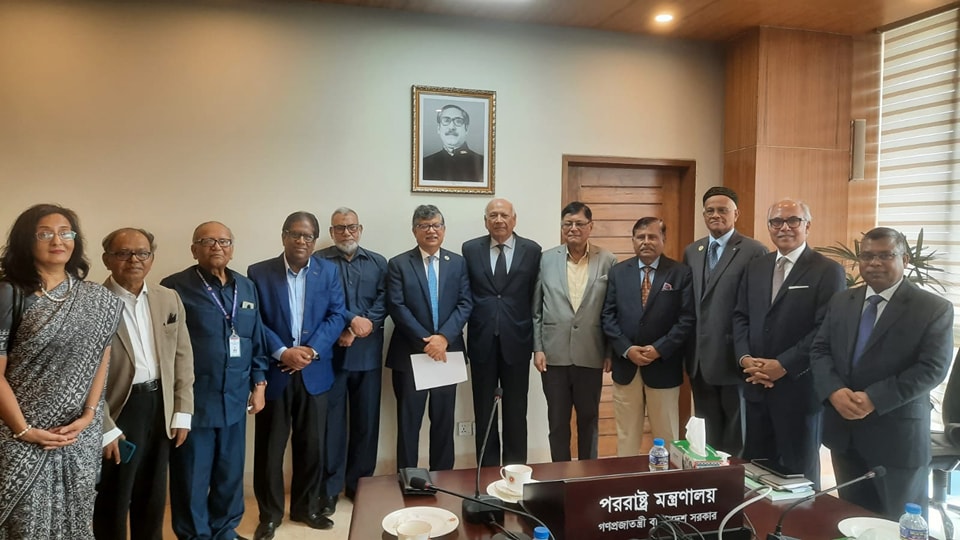
Ministry of Foreign Affairs, Bangladesh
The newly elected 13 member Executive Committee (EC) of the Association of Former Ambassadors (AOFA) met with Amb. Masud Bin Momen, Foreign Secretary (Senior Secretary). Amb. Abdullah Al Hasan has been elected as the President of the EC. The newly elected EC expressed their interest to contribute in nurturing foreign policy related issues and expanding outreach to a greater extent. Foreign Secretary (Senior Secretary) congratulated the newly elected EC and welcomed their opinion and engagement on foreign affairs related matters. The EC will further enhance collaboration with similar Associations.
4th March,2024
Dear Ambassador Jahangir Saadat and Bhabi,
As salam alaikum.
On behalf of AOFA members and on my own behalf, I write to convey our deep appreciation and heartfelt thanks to you for inviting us to visit the Korean EPZ in Chittagong.
The visit was made memorable and extremely enjoyable by your careful planning and flawless implementation of the same. It provided us with an opportunity to have a glimpse of the enormous development work so far completed in the KPEZ and plans for the future. The manmade greenery on display within the precincts of KPEZ, was mind boggling.
The touch of your personal care was evident in every event and in the generous hospitality provided. Specially bright and warm was the lighting decoration of the venue for the gala dinner
We shall be grateful if you kindly convey our sincere thanks to all your colleagues who were behind making the visit a grand success.
With best regards,
Yours sincerely,
Abdullah Al-Hasan,
President,
Association of Former BCS (FA) Ambassadors (AOFA),
Dhaka.
7th February,2024
Esteemed Members,
Assalam alaikum.
The trip to Chittagong Hill Tracts organized by AOFA from 31 January to 2nd February, 2024 was a great success.
16 AOFA Members and their spouses travelled by bus to Rangamati in response to an invitation extended by the Chairman of Chittagong Hill Tracts Development Board, Ambassador Supradip Chakma. He is also one of the six Members of the AOFA Executive Committee.
First day’s journey started from the Foreign Service Academy, Bailey Road, Dhaka around 1020 hrs. With a break for lunch near the Comilla Cantonment at 1245 hrs to 1415 hrs, the team reached Vatiary Bangladesh Military Academy around 1615 hrs. Ambassador Supradip Chakma joined the AOFA guests there and accompanied the group.
Leaving BMA around 1645, we reached Rangamati around 1900 hrs via Hathazari and Rangunia. An armed Police escort in a patrol car led our bus from Hathazari to the Rangamati hilltop hotel run by the Bangladesh Parjatan Corporation. The roads ran through the hills and involved steep climbs, sharp turns and breathtaking descends. The last portion of the road leading to the hilltop hotel, was especially spectacular to negotiate.
Mrs.Nandita Chakma, wife of Ambassador Supradip, warmly received us at the hotel gate. The hotel was situated high on the banks of the Kaptai Lake and looking through the windows , one got the feeling of looking at the Lake Geneva.
After a quick shower and change of dress, we were taken to an old Rajbari (King’s abode) which had been converted into Sabarang restaurant. The food served included some exotic but delicious tribal items. One item that caught most of the guests by surprise was the Morich varta( smashed green chillies).
Next morning, 1st February, we left the hotel by 0915 hrs and after a short drive, arrived at one end of the Hanging Bridge. Advised to walk slowly over the bridge, soon we were on the other side. Walking down some concrete steps and some steep, muddy bank we arrived at the lake shore.
The houseboat reserved for us to take a cruise across the lake, was anchored slightly away, in deeper waters. The vital question was, how to bridge the gap? A wooden plank about one foot wide and 30 feet long was laid out. There were no railings to hold on to maintain one’s balance.
The situation called for improvisation and two young men came up with a long bamboo pole. While one person stood on the houseboat with one end of the bamboo securely held on his shoulder, another person stood on the lake shore with the other end of the pole on his shoulder. It was a sort of test of our nerves, fitness and acrobatic skills. Happily, all of us passed the test twice, embarking and disembarking, without causing any untoward incident.
The lake cruise lasted for over two hours. Local pithas and hot/cold drinks were served on board. The experience was heavenly and unforgettable. One un-escapable thought was, how long would it take this incredibly beautiful spot to catch the attention of the international tourists .
At the end of the cruise, our boat docked at Bargee Lake Resort. Secretary of CHT Ministry as well as the DC and Police Super of Rangamati joined us for a quick lunch at the resort. All three looked so young and fit !
Next on the program list was the formal opening of the 3-day Cultural and Food Festival in the Rangamati stadium. It was amazing to see how level ground was snatched from the hills enough to build a stadium.
State Minister for CHT Affairs Mr.Kujendra Lal Tripura.MP was the chief guest at the inaugural ceremony. Among others, Mr.Dipankar Talukdar,MP , Mr.Aung Shu Pru Choudhury, Ambassador Ahmed Tariq Karim and AOFA President Ambassador Abdullah Al-Hasan were seated on the dias.In his speech, Amb Tariq Karim lauded the unprecedented development visible in CHT and Amb Abdullah Al-Hasan expressed the hope that in the not too distant a future, CHT would become as well known and popular as Switzerland.
Visit to the large number of stalls set up by various ethnic groups of CHT and a cultural show put up by the tribal people followed. Some of the music and dance items presented were unique and exclusive, not available anywhere else.
The evening’s program was rounded off with a sumptuous dinner at the Rest House run by the CHT Development Board. At the dinner, an AOFA crest was presented to Mrs.Nandita Chakma by Mrs. Nagma Karim, wife of Ambassador Ahmed Tariq Karim as a token of our deep appreciation and thanks.
Next day, 2nd February,2024 we left Rangamati around 1000 hrs for return to Dhaka. However, some Members stayed back to undertake visits to Bandarban and Khagrachori.
With kind regards,
Yours sincerely,
Abdullah Al-Hasan.
President, AOFA.
Dhaka, 7th February,2024.
4th February,2024
Esteemed Members,
Assalam alaikum.
Ambassador Jahangir Saadat, Vice President of AOFA and President of Korean EPZ in Chittagong, has invited AOFA members and their spouses to pay a visit to the Korean EPZ on1-3 March,2024.
Full local hospitality, including locally needed transport, will be extended by the KEPZ authorities.
However, intending visitors will have to bear the cost of transportation up to and from Chittagong.
We have arranged to hire a bus which will start from the premises of Foreign Service Academy, Bailey Road, Dhaka on Friday,1st March, 2024 at day time and will return to the same spot on Sunday, 3rd March,2024 in the afternoon. Any body intending to return earlier or later than scheduled or separately could do so on their own.
Visitors will have to contribute Tk.3,500/- per head and Tk.7,000/- for a couple.
Intending visitors are requested to kindly let us know their decision latest by 15th February,2024. Details of logistics arrangements will be finalised after confirmation of participation by the intending Members.
A copy of the indicative Program in KEPZ is enclosed.
A.F.M.Gousal Azam Sarker,
Secretary General, AOFA, Dhaka
3rd February, 2024
Dear Ambassador Supradip Chakma and Mrs. Nandita Chakma,
On behalf of AOFA members and on my own behalf, I write to convey our deep appreciation and heartfelt thanks to you for inviting us to visit Rangamati.
The visit was made memorable and extremely enjoyable by your careful planning and flawless implementation of the same. It provided us an opportunity to have a glimpse of the inherent beauty of the Chittagong Hill Tracts. The touch of your personal care was palpable in every event.
We shall be grateful if you kindly convey our sincere thanks to all your colleagues who were behind making the visit a grand success.
With best regards,
Yours sincerely,
Abdullah Al-Hasan,
President,
Association of Former BCS(FA) Ambassadors (AOFA),
Dhaka.
11th January,2024
Dr. Muhammad Hasan Mahmud, MP
Hon’ble Minister of Foreign Affairs,
Government of the People’s Republic of Bangladesh,
Dhaka.
Dear Sir,
On behalf of all Members of the Association of Former BCS (FA) Ambassadors (AOFA) and on my own behalf, I extend our heartiest congratulations to you on being appointed the Minister of Foreign Affairs of Bangladesh.
We are confident that under your inspiring leadership and guidance, the Ministry of Foreign Affairs will continue to play its due role in protecting the country’s national interests and in projecting her Image.
With kind regards,
Yours sincerely,
Ambassador Abdullah Al-Hasan,
President,
Association of Former BCS(FA) Ambassadors,
Dhaka.
11th January,2024
Ambassador Abul Hasan Mahmud Ali, MP
Hon’ble Minister of Finance,
Government of the People’s Republic of Bangladesh,
Dhaka.
Dear Sir,
On behalf of all Members of the Association of Former BCS(FA) Ambassadors (AOFA) and on my own behalf, I extend our heartiest congratulations to you on being appointed the Minister of Finance of Bangladesh.
All of us in AOFA are proud of the achievement of such a high position by one of AOFA’s esteemed Members.
We are confident that under your inspiring leadership and guidance, the Ministry of Finance will find a new dynamism and will scale greater heights.
With kind regards,
Yours sincerely,
Ambassador Abdullah Al-Hasan,
President,
Association of Former BCS(FA) Ambassadors,
Dhaka.
8th January,2024
Esteemed Members,
As salamu alaikum.
Our EC member Ambassador Supradip Chakma, Chairman, Chittagong Hill Tracts Development Board, has extended an invitation for visiting Rangamati to enjoy a program of festivities involving local artists of hill districts and their shows/exhibitions along with a specially organized tour program including boat ride.
The festivities will be held on 18 and 19 January,2024, this month.
Suggestion is to arrive in the very morning of 18th, night halt on the 18th and return to Dhaka by the night of 19th.
Amb Supradip Chakma has offered to extend all local hospitalities including accommodation, food, and local logistics. He has already made bookings and is going to keep local administration including SP informed.
We would, therefore, request you to kindly indicate your and your spouse’s participation in this visit program, latest by coming Saturday – 13 January,2024, so that decision could be taken accordingly and travel arrangements could be made preferably by suitable bus.
Cost of travel by bus to and from Rangamati will be Tk. 2500.00 per person (Tk.5000.00 for a couple).
We will much appreciate it if you could kindly indicate ASAP.
With kind regards
A F M Gousal Azam Sarker
Secretary General ,AOFA.
22nd December,2023
Esteemed Members,Assalamo alaikum.
This is a gentle reminder that AOFA’s AGM, EC Elections and Annual Dinner will be held on Monday,25th December,2023 at the Foreign Service Academy, Bailey Road, Dhaka, starting at 1600 hrs.
We look forward to your gracious presence.
Abdullah Al-Hasan,
Secretary General, AOFA.
Dhaka, 22nd December,2023
Association of Former BCS(FA) Ambassadors (AOFA)
Ambassadors’ Lounge, Ministry of Foreign Affairs, Segun Bagicha, Dhaka.
10th December, 2023
Esteemed Members ,
Assalamo alaikum.
In consultation with Amb Shamsher Mobin Chowdhury,BB, President of AOFA, it has been decided to hold the next Annual General Meeting of AOFA at 1600 hrs on Monday, 25th December, 2023 at the Foreign Service Academy, Bailey Road, Dhaka.
The Annual General Meeting will be followed by AOFA Executive Committee elections and Annual Dinner.
All AOFA Members, their spouses and all Honorary Members are cordially invited to the Annual Dinner.
All AOFA Members are requested to kindly make it convenient to attend the AGM and also to advise their convenience, preferably, by 17th December, 2023 in order to help us make necessary arrangements.
Abdullah Al-Hasan
Secretary General, AOFA
Dhaka, 10th December,2023.
AGENDA
1. Recitation from the holy Quran
2. Recitation from the holy Tripitok
3.Prayers for the Members and Honorary Members who passed away since the last AGM held on 25th December, 2022.
4. Adoption of Agenda
5. Confirmation of the Minutes of last AGM held on 25.12.2022.
6. Secretary General’s Report
7. Treasurer’s Report
8. President’s address and vote of thanks.
9.Any other business
Break for Maghrib prayers
10. Elections for EC
11. Formal Announcement of election results
12. Annual Dinner.
12th October,2023
Comments on the Summary of Discussions on Promoting A Culture of Peace
7.Waliur Rahman <wali.heritage@gmail.com>
To:Abdullah Al-Hasan
Thu, 12 Oct at 11:35 am
Ambassador Abdullah Al-Hasan
I write to thank you for sending me the summary of the seminar on “Promoting a Culture of Peace”.
It’s well-written and well-thought-out.
With best Wishes.
Sincerely
Waliur Rahman
Chairman Bangladesh Heritage Foundation
Adviser
International Crimes Tribunal Bangladesh (ICTBD)
Dhaka.
6.AFM Gousal Azam Sarker <sarker11111@gmail.com>
To:Abdullah Al-Hasan
Sun, 8 Oct at 11:33 am
Sir,
We have seen sharpness of analysis, precision of clarity and boldness of vision in the keynote paper of Amb. Tariq Karim Sir and in the remarks of learned discussants. Amb. Mahbub Bhai has done a remarkable work in truthfully reporting on the seminar that is of extreme relevance and need in our society in transformation.
Our heartfelt thanks and appreciation. AOFA may organise such programmes on different relevant issues of our society – few but of high quality like this and the reports should come out in the broader media.
Warm regards
Gousal Azam
5.Humayun Kamal <humayunakamal@gmail.com>
To:Tariq Karim
Sat, 7 Oct at 9:31 pm
My dear Secretary General,
This is my belated response to the “Discussion on Promoting a Culture of Peace”, and the detailed and in -depth Keynote Paper presented by Ambassador Tariq Karim.
This has given me a better understanding of this subject.
My sincere thanks and deep appreciation to Ambassador Tariq Karim and Ambassador Mahbub Zaman.
Warm regards, Humayun A. Kamal
4.Tariq Karim <atariqk@gmail.com>
To:Mohammed Shafiullah
Tue, 3 Oct at 12:37 am
Many thanks Vice President Amb Shafiullah for your kind comments.
I add my voice to thanking Ambassador Mahbub Zaman for his meticulous capturing the event in his detailed report.
Kind regards
Tariq Karim
3.Mohammed Shafiullah <rshafiullah@yahoo.com>
To:Abdullah Al-Hasan
Mon, 2 Oct at 9:56 pm
My dear Secretary General
I have gone through the Proceedings of the Discussion on Promoting A Culture of Peace organized by the AOFA.
It is a very comprehensive report encompassing all points from the scholarly conceptual keynote paper of Ambassador Tariq Karim. The report helped me to understand better the high level intellectual discourse of Ambassador Tariq.
EC member Ambassador Mahbub Zaman who took the responsibility to compile the proceedings equally did Justice to other high level discussants .
Ambassador Zaman took the assignment with all earnestness & completed task in the shortest possible time with a high level of professionalism .
EC members may wish to record his contribution in a formal format.
With warm regards
M. Shafiullah
A Vice-President, EC, AOFA
2.Muhammad Zamir <muhammadzamir0@gmail.com>
To:Abdullah Al-Hasan
Sat, 30 Sept at 3:58 pm
Dear Secretary General
Many thanks for forwarding the summary. Well recorded.
Bhalo theko
Zamir BhaI
1.Abdul Hannan <md.a.hannan@gmail.com>
To:Abdullah Al-Hasan
Fri, 29 Sept at 8:23 pm
Thank you Sir for sharing the summary on the discussion on “a culture of peace”.
Excellent indeed.
Warmest regards.
Hannan
29th September,2023
Summary of the seminar on the theme “ Promoting a Culture of Peace” organised by Association of Former BCS(FA) Ambassadors-AOFA, held at the Foreign Service Academy,Dhaka on 7 September 2023
Hon’ble Foreign Minister of Bangladesh Dr.A.K. Abdul Momen, MP was the Chief Guest and UN Resident Coordinator in Bangladesh Ms.Gwyn Lewis was the Special Guest on the occasion.
In his introductory remarks,AOFA President Ambassador Shamsher Mobin Chowdhury,BB, welcomed all and thanked the Hon’ble Foreign Minister for his gracious presence at the seminar despite his extremely pressing schedule. AOFA President mentioned that the HFM had just arrived from Indonesia in the morning after attending the ASEAN Summit. In the evening he would have bilateral discussions with the Russian Foreign Minister Sergei Lavrov and the next day he would be leaving for Delhi with the Hon’ble PM to attend the G 20 Summit. He mentioned that HFM’s presence at the seminar indicated the importance he attached to the programs and activities of AOFA.
Referring to the UN Principles and concept of collective peace and security, AOFA President stated that “since wars began in the minds of men, it was in the minds of men that the defense of peace must be constructed”.
On the significance and relevance of the topic, AOFA President said that in view of the prevalent volatility of the global scenario and the ongoing Ukraine-Russia conflict, Peace had become a somewhat endangered and elusive thought. He made a reference to Professor GL Peiris, former Minister of External Affairs of Sri Lanka who used to say that cessation of hostilities was one aspect but an ever greater challenge was to restore trust, ensure reconciliation and win peace and stability in the long run . The AOFA President said that Peace was a deep-rooted commitment to the principles of liberty, justice, equality and solidarity among all human beings, embedded in the concept of mutual respect and tolerance in society.
In this respect, the AOFA President mentioned the famous speech of President John F Kennedy delivered at American University in 1963 in which he had outlined the kind of peace that should be sought and pursued — “What kind of peace do I mean? What kind of peace do we seek? Not a Pax Americana enforced on the world by American weapons of war. Not the peace of the grave or the security of the slave. I am talking about genuine peace, the kind of peace that makes life on earth worth living, the kind that enables men and nations to grow and to hope and to build a better life for their children–not merely peace for Americans but peace for all men and women–not merely peace in our time but peace for all time.” “ Genuine peace must be the product of many nations, the sum of many acts. It must be dynamic, not static, changing to meet the challenge of each new generation. For peace is a process–a way of solving problems.”
The AOFA President then gave a brief background of the evolution of the UNGA Resolution Promoting a Culture of Peace in which Bangladesh had always played a leading role. Culture of Peace remained one of the key items for the General Assembly since 1997 when the Assembly decided to add a new and self-standing item to its agenda.
This was followed by the UNGA resolution 52/15 of 20 November 1997 that proclaimed the year 2000 as the “International Year for the Culture of Peace” and GA resolution 53/25 on “The Culture of Peace: Importance of justice, equality, and inclusion for advancing peace building” . Over the years the scope of the Culture of Peace expanded allowing adoption by the General Assembly multiple resolutions on a wide range of issues relating to various areas of its Program of Action.
Next, Ambassador Ahmed Tariq Karim took the floor to deliver the Keynote speech. He dwelt at length on the concept of peace, its historical evolution and underlying dynamics . Ambassador Karim at the outset described the basic contours of his speech. First, he highlighted the three keywords of the topic, (1 ) Promoting (2 ) Culture (3 ) Peace . Secondly, Ambassador Karim addressed the seminal importance of promoting a culture of peace in the context of the present global scenario . Thirdly, he focused on what peace as a concept meant in the context of Bangladesh as a state and the policies emanating from it as a logical corollary and how it conditioned our external relations . Lastly, Ambassador Karim delved deep into the normative aspects of peace that addressed also what we as citizens should do to promote a culture of peace.
Ambassador Karim said that Culture was an all encompassing concept that could have broad and varied interpretations. It referred to the way of life for an entire society, it was a lived and creative experience for individuals and included artefacts, text and the complex interactions between all these. Peace was an umbrella term that embraced social behavior, institutions that the society formed and the norms that governed the behavior of their society and was derived from a compendium of knowledge, beliefs, arts , laws , customs , capabilities and habits of individuals comprising that society . In a broad sense, these actions translated largely into actions and interactions by individuals, civil society and intelligentsia, denoting their beliefs, behaviors, values and symbols. Generally, these were accepted as something given and, therefore, not thought about. In another perspective, culture was an assimilation of shared language, values, norms, traditions, pastimes, customs, beliefs and conventions that caused people to identify with one another.
He further said that the environment and surroundings deeply impacted and influenced an individual in his cultural upbringing. It might be ingrained into one’s character involuntarily or subconsciously by the traditions, beliefs and practices within one’s family or in one’s peer group or members, or institutions of the community including the church or religious leaders where one lived which might in turn be influenced by external factors.
Culture was not something static, it might be transmitted from one generation to the next through teaching or imitation of knowledge, values and other factors that influenced behavior. Parents might inculcate into their off springs or peers might inculcate those around them. A Culture might take a long time to form before it became deeply ingrained and embedded in a society. Moreover, changing a culture could take an equally long time, sometimes longer through a transformative process often involving several generations.
Over time, cultural changes were brought about in accordance with the needs of the times. A group or society might be compelled to adapt to external stimulus, changes in market conditions, new technologies or strategies of other people’s communicating with them. Communication was an important medium and mechanism through which our understanding, meaning, articulation of messages pertaining to culture was transmitted between persons and generations.
Quoting from Aristotle’s Politics, Ambassador Karim said that Aristotle believed that man was a “political animal” because he was a social creature with the power of speech and moral reasoning: Therefore it was evident that the state was a creation of nature, and that man was by nature a political animal. Since man, by nature,was a social creature and also to some extent, a political animal, such a man and the society to which he belonged would have certain political or civic culture. Trough The Republic, Plato affirmed the importance and significance of political culture. In the two works of Plato, namely The Republic and Laws, he placed enormous weight on political socialization and analysis of the state. Plato in his writings placed much importance on the family, the parents and teachers and political officials to inspire, regulate and guide the children as they grew up
Thereafter, Amb Karim dwelt at length on the concept of political culture. Ambassador Karim said that political culture was a pattern of shared values, moral norms, beliefs, expectations, and attitudes that related to politics and its social context. Political culture reflected the way people thought about and felt about political life. It was a set of attitudes about authority, government and society that was accepted by large parts of a country’s population that might reflect the view points of the majority. Civic Culture might also be called civic political culture as it was a political culture characterized by “acceptance of the authority of the state” and “a belief in participation”. It had existed since the notion of states in whatever dimension or capacity came into being.
Ambassador Karim said that Gabriel Almond in his seminal essay on the intellectual history of civic culture concept published in 1980 asserted that “the concepts and categories that we use in the analysis of political culture- subculture, elite political culture, political socialization and cultural changes -are also implied in ancient writings”. Social psychology was also important since it tried to ascertain how and why attitudes and behavior of individuals were conditioned and influenced by the presence and impact of other individuals and social groupings. Beliefs, feelings and values influenced political behavior and these in turn were the product of socialization experiences that Almond referred to. Therefore, civic culture was influenced by these aspects.
Ambassador Karim also mentioned The Leviathan written by the English Political Philosopher Thomas Hobbes wherein he spoke about the existence of The State of Nature Hobbesian . This state of nature was characterized by intense competition among individuals and motivated by self interest. The only laws that existed at this stage were not covenants forged among people but principles based on self- preservation. According to Hobbes, three things threw humankind into war and these were competition, distrust and desire for glory. Due to the absence of any higher authority to adjudicate disputes, everyone feared and mistrusted everyone else and there could be no justice, commerce or culture. That unsustainable condition came to an end when individuals agreed in a social contract to relinquish their natural rights to everything and to transfer their self authority to a higher civil authority or Leviathan. Hobbes said that the best way to understand the state was to conceive of it as resulting from such an agreement.
The 17th and 18th centuries saw the presence of great political philosophers such as Thomas Locke ( 1632-1704 ) , Jean- Jacques Rousseau ( 1713 -1778 ) and in the 20th century John Rawls who differed fundamentally with the Hobbesian perception of the state of nature . However, as a concept the state of nature could not be discarded so easily as Ambassador Karim felt that if one looked at the post 1945 trajectory of historical development of the Man and the States that he had created, one was tempted to believe that man’s individual interest had now gained supremacy and had reigned over collective and societal interests.
Ambassador Karim said that the famous sociologist Max Weber typified three subjective categories of political authority, namely traditional, rational -legal and charismatic. Traditional order was rules that were obeyed because those had passed from historical times. Rational-legal order was in the realm of bureaucracy because these were selected and acted upon according to written rational and enforceable rules. Charismatic authority was the extraordinary and transitional type of political order characterized by belief in the superhuman or extra human qualities of a leader.
Joseph Schumpeter suggested five conditions for the success of the democratic method. These were first, good political leaders having the necessary traits and qualities. Secondly, the political process should be characterized by the scope of governments to be of limited nature. Thirdly, it should have sound and competent bureaucracy professional in nature. Fourth, it should be characterized by mutual self respect wherein the opposition and the electors demonstrated democratic self control and political division of labor. Fifth, It should be marked by respect for opinion of others implying tolerance of opinions of others.
Next, Ambassador Karim mentioned about the writings and viewpoints of the philosopher Machiavelli who wrote The Prince . However, strangely enough, his viewpoints expressed through his book Discourses on Livy were more profound and significant where he said that the republican form of government was the best form of government. He took the government of ancient Rome as his example for a good republican government.
Later on Jean Jacques Rousseau drew a sharp contrast challenging the beliefs and views of Machiavelli .Rousseau insisted that civil society must be based upon preservation of everyone’s freedom and equality. The necessity of a single lawgiver to render human beings as citizens and free. Although in his Social Contract Rousseau borrowed from Machiavelli’s Discourses on Livy , the concept espoused by Rousseau through his Social Contract and understanding of the general will made obsolete Machiavelli’s version of democratic republicanism.
Then Ambassador Karim dealt with the elements that might impact upon shaping of political values. These included Religion and Nationalism.
Due to increased globalization and inter connectivity, there was frequent intermingling among cultures. Often assimilation took place and cultural values, customs and beliefs were absorbed by others transcending boundaries and barriers . So we had a situation wherein culture and political culture were transmitted from generation to generation. Sometimes these interactions shaped a new outcome or underwent some changes and transformation. It was a dynamic process often negotiated by individuals .
Ambassador Karim pointed to the definitional problems that one might encounter in defining peace. Did peace mean absence of war or an end of war. He said that peace might be defined as societal friendship and harmony marked by absence of hostility and violence. It also denoted lack of conflict such as war and freedom from fear of violence between individuals and groups. Ambassador Karim mentioned five spheres or forms of peace as defined by US National Peace Academy.
These were peace at the personal level, at the social level, at the political level, at the institutional level and at the ecological level. He said that though nationalism and religion could be a source of cultural values and civic culture, extreme forms of nationalism and deeply held religious beliefs could also cause conflict and war . He said that both could be promoters of peace if the citizens accepted broadly the five forms of peace that had been mentioned above, arrived at through a process of dialogue and consensus.
Next, Ambassador Karim dwelt at length on the term “promoting”. He said that promoting something was to actively encourage and /or support a cause or a venture as well as an attempt to make it happen, increase, spread or flourish.
Ambassador Karim asked if the new world order defined by the Allied Powers and the consequent objective to ensure a peaceful world after the end of world war through the founding of the United Nations, had succeeded in achieving the goal . He said that the Charter of the UN had lofty ideals and ambitions and in the preamble it stated, “We the people of the United Nations determined to save succeeding generations from the scourge of war which twice in our lifetime had brought untold sorrow to mankind”.
The Charter reposed full faith and confidence in fundamental human rights and in equal rights of men and women and of nations large and small. The Charter also emphasized the need to practice tolerance and live together in peace with one another as good neighbors. However, the world was free from the violence caused by war for only short periods of time, conflicts took place in every year of the 20th Century and it had been estimated that around 187 million people died as a result of war from 1900 till present. The actual number of casualties might be far higher.
Ambassador Karim then highlighted the famously enunciated dictum of Bangabandhu that our foreign policy was based on “Friendship towards all and malice towards none”. This flowed from Bangabandhu’s deeply held belief and conviction .On Bangladesh’s total and absolute commitment towards the promotion of peace, he mentioned that the Founding Father of Bangladesh was conscious and aware of the necessity of maintaining global peace and security. He felt that given the then prevailing context of regional conflicts , global cold war characterized by super power rivalry, it was even more necessary for cessation of hostilities and place emphasis on detente .
Bangabandhu was a great visionary who rightly thought that a nation born out of a war that had ravaged its economy, needed international support and cooperation. Thus the external relations of Bangladesh were based on the principles and objectives of the United Nations and on multilateralism.
In his speech in Kolkata in February 1972, Bangabandhu had said, “In a world of war and confrontation we could live side by side as neighbors and pursue constructive policies for the benefit of the people — achievement of peace and stability in this region can be a model for others.”
True to his deeply rooted belief of extending hands of friendship to all, Bangabandhu had also sought to normalize relations with Chins and engaged in quiet diplomacy. Bangabandhu chose Ambassador KM Kaiser as Ambassador of Bangladesh to China because Amb Kaiser had a close rapport with the top Chinese leadership .
Bangabandhu’s commitment towards non alignment was absolute and total. He steered clear of super power rivalry. In a world divided into two blocs, one led by the US and the other by the then USSR, Bangabandhu professed neutrality and he declared that “Bangladesh will be the Switzerland of the East”. Ambassador Karim quoted from the speech by Bangabandhu on September 25, 1974 at the United Nations General Assembly, wherein he had said, “The very struggle of Bangladesh symbolized the universal struggle for peace and justice”.
Bangabandhu further had said in the same speech, “Peace is an imperative for the survival of mankind ; it represents the deepest aspirations of men and women throughout the world . Peace to endure must, however, be peace based on justice.”Bangabandhu was also an ardent supporter of promoting regional peace and security. He had said, “consistent with our own total commitment to peace, we have striven to promote the process of reconciliation in our own sub-continent”.
Then Ambassador Karim mentioned that the illustrious daughter of Bangabandhu , the current Prime Minister had remained unswerving to the tenets espoused by his father. Through her words and concomitant actions, she had demonstrated her commitment to regional and global peace. She had said, “our relations with foreign countries flow from the demands of our national interest and that we shall not develop any relationship with any country that is at the cost of our existing friendship and cooperation with others”.
In this context Ambassador Karim mentioned that the art of arriving at an equilibrium would depend on how skillfully we managed these different sets of relationships , hewing to the timeless foundational tenets enunciated by our Father of the Nation . He referred to a speech by Prime Minister Sheikh Hasina in May 2023 addressing an event marking International Day of UN Peacekeepers – 2023 wherein she had asserted, “We believe in peace, not in conflict. Bangladesh always believes in peace and it would do all possible things, whatever is required to establish peace”. At the same time, Prime Minister Sheikh Hasina also acknowledged that ensuring peace in the world was now more difficult than in the past .
Dwelling on the subject of Bangladesh as a promoter of Global Peace,
Ambassador Karim said that following our leaderships clarion calls for world peace since inception, Bangladesh had been at the forefront of activities at the UN on the important pillar of the UN architecture – peace and security. This year the UNGA would once again be considering the re-adoption and reiteration of the UN Declaration and Program of Action on a Culture of Peace .
Bangladesh could rightly feel proud of presenting the Resolution at the General Assembly since the idea was first mooted in 1997. On 13 September, 1999 the Assembly adopted the norm setting resolution , “Declaration and Programme of Action on a Culture of Peace” . The Assembly had proclaimed the year 2000 as the International Year for the Culture of Peace and the decade 2001-2010 as the International Decade for a Culture of Peace and Non – Violence. While praising Bangladesh’s role in championing the resolution and spearheading efforts to introduce it, Ambassador Karim felt that we should take practical and concrete steps in this regard .Our actions should be commensurate with our ideals and beliefs. In this context he mentioned about the convening of the Global Peace Conference held under the auspices of Dhaka last year. He felt that Bangladesh could play a catalytic role in espousal of this campaign for peace.
Referring to the growing sense of frustration and disappointment among certain group of countries at the lack of global efforts and concrete results in attaining global peace, he mentioned the Kigali Global Dialogue in June 2023. At this forum, some nations even questioned the relevance and role of the United Nations in the present world. Ambassador Karim said that he believed that Bangladesh needed to explore formation of a “fellowship” of like-minded nations, all struggling as we are, to graduate into more developed states.
In conclusion, Ambassador Tariq Karim focused on what should be our actions as citizens of the state to promote a culture of peace. In this respect, he emphasized on the arrival of a modicum of discussions through civil discourses. He also emphasized on the point that as responsible citizens, we also had responsibility towards the state. He specifically mentioned that enjoyment of rights and privileges were commensurate with duties and responsibilities.
While it was neither desirable nor feasible to police all individuals, he asserted that it were the citizens who were obliged to respect laws and regulations and abide by the same. He mentioned that freedom and equality were guaranteed by the supreme law of the land but one was also obliged to see that enjoyment of one’s rights did not impinge upon others’ rights. “If we wished to bring about any change, change must begin with the individual, with the citizen, on a more personalized level with me, with us all together”, he concluded.
After the Keynote speech a message from former Bangladesh Permanent Representative to UN, Ambassador Anwarul Karim Chowdhury, was read out. Ambassador Chowdhury had played a major role in spearheading the resolution on the Culture of Peace at the UNGA. He mentioned that the Hon’ble Foreign Minister’s presence at the event signified the importance that Bangladesh attached to this item of promoting a culture of peace.
He added that UN had grown out of ashes of the Second World War and was formed due to the common aspirations of the nations to prevent war and violence. He quoted from the UN Charter its objective TO SAVE SUCCEEDING GENERATIONS FROM THE SCOURGE OF WAR, which twice in our lifetime had brought untold sorrow to humankind, and to reaffirm faith in the fundamental human rights, in the dignity and worth of the human person.”
Ambassador AK Chowdhury mentioned that after 9 months of negotiations under his chairmanship, the landmark resolution was adopted by consensus in the UNGA and subsequently became a norm- setting resolution. Ambassador Chowdhury called upon all member nations of the UN to embrace a culture of peace for sustainability of the planet and to make the earth a better place. He emphasized upon the need to make peace and non-violence an integral part of our daily lives. Amb Chowdhury said that we needed to combine our efforts and work collectively to attain a. culture of peace and sustain the process. It should grow from strength to strength, as ripples after ripples made waves.
Thereafter, President of AOFA Ambassador Shamsher Chowdhury invited Professor Delwar Hossain, PhD. Professor of International Relations University of Dhaka & Member, Bangladesh Public Service Commission, to take the floor as one of the two discussants.
Professor Delwar thanked AOFA for inviting him to be one of the discussants on this important and timely topic. He began by stating that the bedrock on which the principles of our foreign policy was based was envisioned by Bangabandhu Sheikh Mujibur Rahman, the Father of the Nation . Professor Delwar drew attention to Bangabandhu’s speech at the UN General Assembly in September 1974 wherein he had said that “Peace is an imperative for the survival of humanity. It represents the deepest aspirations of men and women throughout the world.”
His worthy daughter Prime Minister Sheikh Hasina followed in his footsteps and had always given primacy to the promotion of peace. In one of her speeches she had said, “I would like to emphasize that we do not want war. We want peace. We seek the well-being of humankind, not its destruction”.
In his introductory remarks Prof Delwar termed Peace as a common pursuit of humankind. He said that with the evolution of mankind within the society and global and regional context, there had been a shift and transformation from a Culture of War and Violence towards a Culture of Peace. This was what we all aspired for and strived to achieve.
Mentioning the article in our constitution that shaped the contours of our foreign policy, he said that Bangladesh based her external relations on the principles and objectives of the United Nations, including the concept of collective peace and security. Bangladesh also strived for the renunciation of the use of force in her external relations and sought gradual and complete disarmament.
He pointed out that it was Bangabandhu’s vision of Friendship to all, malice towards none” that had led to the founding of the foreign policy dictum. Prof Delwar highlighted the speech of Bangabandhu at the UNGA in September 1974 .He said that it was an epitome of Bangladesh’s unwavering commitment to maintain global peace, humanity and prosperity
Professor Delwar mentioned that Bangladesh had always championed the cause of promoting international peace and security. Bangabandhu Sheikh Mujibur Rahman had always voiced his strong opposition to all forms of discrimination, oppression, exploitation and tyranny. He led the people of Bangladesh to protest and rise against the injustices perpetrated by the West Pakistani colonial rulers.
We gained independence at a huge cost and saw how the subcontinent had become a hotbed of conflicts and violence due to rivalry between the then two super powers, USSR and USA.Bangladesh’s experience motivated us to always champion the cause of Peace at the global plane and at the UN. That’s why we took a leading role in spearheading at the UN the resolution of promoting a culture of peace.
About the historic perspective and evolution, Prof Delwar said that during 1996-2001, the then Prime Minister Sheikh Hasina had introduced the idea in the UNGA and the resolution (UN Resolution 53/243) of “culture of peace” was adopted on September 13, 1999.
The original resolution of Bangladesh earlier passed by the General Assembly on 10 September 1999 at its 53rd Session, had called for “Declaration and Program of Action on a Culture of Peace”. The resolution called upon the governments, non-governmental organizations (NGOs), civil society groups, and people from all walks of life to work together to create a global culture of peace and non-violence.
Dwelling on the concept of a Culture of Peace, Professor Delwar said that Prime Minister Sheikh Hasina had always promoted this concept of ‘culture of peace’ at the global body. In her words, “Peace is a prerequisite for development. Bangladesh considers peace a fundamental human right to be attained, sustained, promoted and carried forward all the time. A threat to peace anywhere in the world is a threat to peace everywhere. Thus, we call for the enthusiastic promotion of a culture of peace worldwide” ( UNGA -2000 )
Professor Delwar said that culture of peace was an integral approach to preventing violence. It was aimed at bringing about positive changes at micro level through practicing tolerance justice, equity, equality and humanity in human behaviors as well as state policies.
Professor Delwar then highlighted the inputs that constituted a culture of peace according to the UNGA Resolution. According to the 1999 Resolution (Article 1), the basic constituents of Culture of Peace were:
Education: the resolution aimed to utilize education and skill-building (including, for example, better mediation, negotiation and cooperation) to change minds around the world about respecting life.
Respect for Sovereignty and Rights: a major emphasis of the resolution was spreading a respect for national sovereignty and for international law and human life. The prevention of territory-related conflicts and the promotion of fundamental human freedoms would help build sustainable peace.
Peaceful Settlement of Conflicts – peaceful settlement of conflicts was the defining element transforming a culture of war into a culture of peace. The idea was that all concerned groups would come together and immerse themselves in a peaceful dialogue and negotiation in order to reach consensus on peaceful, nonviolent solutions.
Development: a declaration on the Right to Development A/RES/41/128 was adopted on 4 December 1986 by the General Assembly, stating that the right to develop socially, politically, culturally, and economically was inalienable. The UN did not ignore the importance of ensuring the sustainability of such development either; the peace, development, and sustainability of our world were all inextricably connected.
Freedom: the freedom to express ourselves and our opinions was one of the basic elements in a modern, progressive society. Choking the voice of the media or of the people only disturbed the peaceful environment of a country. Each individual should have the right to ask questions about what was happening in the government and its policies and to get a satisfactory answer.
Furthermore, all of our rights were interconnected—limiting the rights of women to keep them uninformed and suppressed led to social and economic inequalities, which only led to disaster for both development and interpersonal peace. These included: fostering a culture of peace through education; promoting sustainable economic and social development; ensuring equality between women and men; promoting respect for all human rights; fostering democratic participation; supporting participatory communication and the free flow of information.
While dwelling on the role of Bangladesh in introducing the resolution at the UNGA professor Delwar mentioned inter alia the following :
Bangladesh had been facilitating this resolution at the Assembly every year and also convening a High-level Forum on the Culture of Peace in the General Assembly. The recent High-Level Forum was held on September 6, 2022 and focused on transformative role of culture of peace to ensure justice, equality, and inclusion for advancing peace building
While introducing the resolution, Permanent Representative of Bangladesh had said , “Indeed, it is more urgent today than ever to promote a culture of peace; to prioritize dialogue and rapprochement over violence and confrontation”.
In 2023, the resolution rightly highlighted collective efforts to address global risks and challenges with the United Nations playing a central role.
Bangladesh’s proposal underscored the importance of strengthening preventive diplomacy, dialogue and healthy debates at all levels.
While reaffirming the invaluable role of women in conflict prevention and resolution it called for full equal and meaningful participation of women in such processes.
The UNGA resolution also emphasized upon the need to address the underlying drivers of violence and conflict and Promote a Culture of Peace in the context of ongoing digital transformation.
He mentioned that the Resolution was a useful means to complement UN Charter obligations of maintaining peace in the world.
What is to be Done ?A holistic approach was needed to promote a culture of peace around the world. Professor Delwar suggested the following follow up actions:
Continuing advocacy for peace at various levels from micro to macro levels
Global initiatives:
Regional initiatives
State level initiatives
Civil society level initiatives
Individual initiatives
The role of Bangladesh in the UN Peace Keeping Missions had also been widely acclaimed and applauded. This added up to our impressive credentials to contribute towards global peace and build up a culture of peace, Professor Delwar Hossain concluded.
Next, Ambassador Munshi Faiz was invited to share his views and ideas on the item . In his remarks he mentioned that Culture of Peace must be pursued seriously and in a sustained manner both at home and abroad, at different levels.
He also said that there was a need for a permanent establishment, internationally, to pursue an agreed plan of action on a day to day basis. Domestic establishments were also needed in all the countries to promote a culture of peace at home.
Mentioning the International Peace Conference in Dhaka in 2021, Ambassador Faiz suggested convening an international conference on establishment of permanent architectures in this regard to supplement UN efforts in promoting a Culture of Peace in a more serious and sustained manner.
Professor Delwar and Ambassador Munshi Faiz were followed on the podium by UN Resident Representative Ms Gwyn Lewis .
At the very outset, she conveyed UN’s appreciation to Bangladesh for its consistent efforts since 1999 in facilitating the Culture of Peace Resolutions at the United Nations General Assembly, for convening since 2012 , the yearly High Level Forum on the Culture of Peace and for support to peace keeping across the world .
Ms Gwyn Lewis said that Peace and Security constituted one of the three system pillars of the United Nations. Peace and Security, Development and Human Rights were the three foundations on which the UN stood and which were the raisin d’ etre of the organization. These areas were interconnected and no single area could be achieved without progress in all the others .
While welcoming the convening of the AOFA event she said that all such initiatives whether at the local, regional and /or global level, must be able to strengthen our collective commitment towards promotion of a culture of peace .
The UN Resident Representative mentioned that peace, conflict prevention, and the protection of human rights were prerequisites for inclusive and sustainable development; economic, social and environmental justice, gender equality and the promotion of a shared vision between governments and people. Conversely, inclusive development, justice and equality were also fundamental to prevent war and to create a conducive environment for peace.
She mentioned that woefully the number of conflicts had risen recently thus exacerbating inequality and the root causes of these conflicts remained unaddressed. She said that limited sources and unmet needs might be the potential sources of conflict. In this respect she mentioned about the challenges posed to peace globally, regionally and nationally due to food insecurity, environmental degradation and climate change.
The UN Resident Representative also mentioned some factors that impact adversely on global peace . These were violation of human rights , gender based violence , disinformation and hate speech . She added that it was a worrisome trend that these negative factors were on the rise.
Ms Gwyn Lewis mentioned about the New Agenda for Peace that was released in July 2023 by the United Nations Secretary General. She said that without substantial progress made in the achievement of Sustainable Development Goals, peace would remain elusive. She quoted the UNSG on the Report stating, “Ultimately it is the only way to comprehensively address the interlinked, multidimensional drivers of violence and insecurity.” In other words, SDGs are fundamental for conflict prevention and sustainable peace.
Ms Gwyn Lewis quoted the speech of the President of the 77 Session of the UNGA wherein he had stated that, “Member states bear the responsibility for preventing conflict . And prevention must remain a [political and financial] priority. She said that vibrant civic and political spaces were required to restore trust and promote solidarity, equality, inclusion and respect. She remarked that everyone had a role to play in weaving a solid social fabric.
The UN Resident Representative then emphasized upon three specific ways to promote a culture of peace. These were :
First, partnerships and collaboration between governments, civil society, academia, private sector, UN and the citizens of the country were essential.
Secondly, Promoting a culture of peace was relevant only if it was done in an inclusive way and based on people centered approach.
Thirdly, promoting a culture of peace required adopting a forward looking lens. This would imply making critical investments in the future of our planet.
In conclusion, Ms Gwyn Lewis reiterated the commitment of the UN to support the government and people of Bangladesh in sustaining peace and development and promoting a culture of peace in line with the UNGA mandate that Bangladesh had sponsored.
After Ms.Gwyn Lewis had finished, President of AOFA invited the Chief Guest, Hon’ble Foreign Minister of Bangladesh Dr.A. K. Abdul Momen , MP to deliver his speech .
Hon’ble Foreign Minister began his speech by thanking AOFA for organizing this event which he felt was very rich in content and rewarding. He said that it’s message, contents and main elements of the discussions should be disseminated to the greater part of the community. Peace had been an integral part of human existence . Peace represented the hopes and aspirations of all humanity.
Hon’ble Foreign Minister quoted one of the statements of the Father of the Nation Bangabandhu Sheikh Mujibur Rahman wherein he had stated , “Peace is imperative for development”. Keeping that in mind, Hon’ble Prime Minister Sheikh Hasina had tabled the UN General Assembly’s 1997 norm-setting resolution on the “Culture of Peace” for the very first time and ever since it was being adopted again and again with consensus.
Honble Foreign Minister said that the essence of the “Culture of Peace”was to inculcate a mindset of respect and tolerance towards others irrespective of ethnicity, color, background, race or religion. He added that by inculcating such a mindset one could hope to have sustainable peace and stability across nations.
Hon’ble Foreign Minister remarked that Bangladesh firmly believed that multilateralism was an effective process to promote peace, security, and collective stability. He further added that actions were needed more robustly than ever to address the cross-cutting and competing global issues.
Hon’ble Foreign Minister said that Bangladesh emerged as an independent country through the horrors of atrocities and genocide during the great War of Liberation in 1971. In his maiden speech at the United Nations General Assembly in 1974, the greatest Bengalee of all time, Father of the Nation Bangabandhu Sheikh Mujibur Rahman made a resolute statement in favour of global peace, stating, “Peace is an imperative for the mankind. It represents the deepest aspirations of men and women throughout the worlds.”
Hon’ble Foreign Minister mentioned that our commitment towards peace and its promotion was absolute and total. He said that our commitment towards peace was also reflected in Article 25 of our Constitution that set “promotion of international peace, security, and solidarity” as a fundamental principle of our state policy. Bangladesh also stood committed to the principles laid down in the United Nations Charter highlighting “peaceful settlement of international disputes and maintenance of global peace and security”.
Hon’ble Foreign Minister said that the pandemic and erratic climate changes had further exacerbated the existing societal challenges to peace and security. So now, the need to work under the agenda “promoting culture of peace” had become more crucial than ever. It was significant to reflect upon the evolving nature of world peace and order, and adapt strategies to address new challenges.
The Honble Foreign Minister in his speech said that we must enhance our efforts to prevent conflicts, protect civilians, and promote sustainable peace in this rapidly changing world.
The Hon’ble Foreign Minister said that in order to build public awareness, in 2021 the Bangladesh Government had organized the International Peace Conference in Dhaka, commemorating the receipt of the Julio Currie Peace Award by Bangabandhu. He also mentioned that in order to create public awareness, all Bangladesh Missions abroad were observing each year Peace Day involving diplomats, peace lovers, and community leaders
Dwelling at length on the specific area based interventions necessary for promoting a culture of peace he mentioned that Bangladesh remained fully committed to her implementation through action-oriented policy interventions in the eight program areas of the ‘Program of Action on Culture of Peace’ – (1) education, (2) sustainable economic and social development, (3) respect of human rights, (4) equality between men and women, (5) democratic participation, (6) tolerance and solidarity, (7) free flow of information and knowledge and (8) international peace and security.
The Hon’ble Foreign Minister said that since his assumption of the post of Foreign Minister of Bangladesh, he had introduced three policy packages and those were (1) Economic Diplomacy, (2) Public Diplomacy and (3) Regional Peace and stability packages.
He mentioned that these 3 packages were highly interlinked to achieve economic development, people’s welfare and peace and stability, both at the domestic as well as regional and global levels.
The Hon’ble Foreign Minister expressed his strong conviction that technology could contribute to peace-building processes by offering tools that fostered collaboration, transform attitudes, and give a stronger voice to communities. He added that investing in and supporting access and inclusion to technology for effective peace-building was vital now more than ever. Digital platforms could be used to counter false rumors, to disseminate peaceful messages and to provide a platform for peace-promoting initiatives. Hon’ble Foreign Minister said that we could leverage digital media’s power to raise global awareness about peace across diverse backgrounds, cultures and religions through the dissemination of facts and information.
He said that in line with our commitment towards promotion and sustaining peace, Bangadesh followed the foreign policy dictum of “Friendship towards all and malice towards none “as espoused by the Bangabandhu Sheikh Mujibur Rahman
Hon’ble Prime Minister Sheikh Hasina in line with her commitment towards promotion and maintenance of peace at all levels, had always maintained a zero tolerance policy against terrorism and violent extremism, and has always promoted secularism and communal harmony; He said that Bangladesh did not support any terrorists or terrorist groups to use her territory to carry out terrorist activities elsewhere and added that Bangladesh did not support any actions that escalated tension. We were against war; Bangladesh was against unilateral measures which did not promise sustaining peace.
At the conclusion of his speech, the Hon’ble Foreign Minister urged upon all to work collectively in the pursuit of peace, justice, and security for all. Emphasizing upon the importance of dialogue and discussions to resolve differences, the Hon’ble Foreign Minister called upon all to endeavor towards building a future where conflicts were resolved through dialogue and negotiation, where prosperity and development prevailed.
The meeting ended with a vote of thanks by the Chair.
Recorded by :
Ambassador Mahbub Uz Zaman,
Member,
Executive Committee,
AOFA, Dhaka.
——————————————–
7th September , 2023.
Esteemed Members,
Assalamo alaikum.
The seminar on A Culture of Peace organized by AOFA on 7th September, 2023,at the Foreign Service Academy in Dhaka, was a great success.
Hon’ble Foreign Minister of Bangladesh Dr.AK Abdul Momen,MP was the Chief Guest and UN Resident Coordinator in Bangladesh Ms.Gwyn Lewis was the Special Guest.
A large number of AOFA Members, officers of the Foreign Ministry, heads of Think Tanks, academics and journalists and other invited guests, attended the event.
The day’s program started with introductory remarks by AOFA President, Ambassador Shamsher Mobin Chowdhury,BB.
The ensuing discussion program began with Ambassador Ahmed Tariq Karim delivering the Keynote speech. The high quality of Amb Tariq Karim’s speech earned all round appreciation.
It was followed by the presentation of a written message from Ambassador Anwarul Karim Chowdhury, former UN Under Secretary General and Bangladesh’s Permanent Representative to UN, which was read out by Ambassador Shamsher Mobin Chowdhury.
Next, Professor Dr.Delwar Hossain took the floor to analyze the salient points made in the keynote paper. He was followed on the podium by the other designated Discussant, Amb Munshi Faiz Ahmad. A lively Question and Answer session ensued.
In her speech, Special Guest Ms.Gwyn Lewis, UN Resident Coordinator in Bangladesh, lauded the role of Bangladesh at the UN in pursuing the resolution on A Culture of Peace.
Chief Guest of the occasion, Hon’ble Foreign Minister of Bangladesh Dr.AK Abdul Momen, in his speech praised AOFA’s timely initiative to hold the seminar.
Detailed records of the seminar proceedings are under preparation and the same will be circulated as soon as possible.
AOFA President Ambassador Shamsher Mobin Chowdhury moderated the program. He also delivered the vote of thanks.
The entire program was extensively covered by both the print and the electronic media.
The seminar was rounded off with lunch, very diligently managed by AOFA Treasurer Amb. ABM Abdus Salam.
With kind regards,
Yours sincerely,
Abdullah Al-Hasan.
Secretary General,AOFA.
Dhaka, 7th September , 2023.
23rd August,2023
Esteemed Members,
Assalamo alaikum.
The Association of Former BCS(FA) Ambassadors-AOFA will hold a Discussion on Promoting A Culture of Peace on Thursday, 7th September,2023 beginning at 1100 hrs at the Foreign Service Academy, Bailey Road, Dhaka.
Hon’ble Foreign Minister of Bangladesh, Dr.A.K.Abdul Momen.MP has kindly consented to grace the occasion as Chief Guest.
An E Invitation Card is attached herewith.
Your gracious presence in the Discussion will be deeply appreciated.
With kind regards,
Yours sincerely,
Ambassador Abdullah Al-Hasan,
Secretary General,AOFA.
23rd August,2023
The Association of Former BCS(FA) Ambassadors-AOFA
has the pleasure to invite you to a discussion session on
Promoting A Culture of Peace
at 11 AM on Thursday, 7thth September, 2023
at the Foreign Service Academy, Bailey Road, Dhaka
Dr.A.K.Abdul Momen, MP, Hon’ble Minister ofForeign Affairs, Government of Bangladesh, has kindly consented to be the Chief Guest.
Mr. Shahriar Alam, MP, Hon.Minister of State for Foreign Affairs, Government of Bangladesh, has kindly consented to be the Guest of Honour
Ms. Gwyn Lewis, United Nations ResidentCoordinator,Bangladesh,will be the Special Guest
Amb Ahmed Tariq Karim will present the Keynote paper.
Dr.Delwar Hossain, Member, Public Service Commission and Amb Munshi Faiz Ahmed will be the discussants.
Amb Shamsher M. Chowdhury,BB, President,AOFA, will moderate the Session.
The Session will be followed by lunch.
Your gracious presence will be deeply appreciated.
Programme :
1100 hrs -Address of welcome by AOFA President,
1105 hrs -Presentation of Keynote Paper
1125 hrs -Comments by the Discussants
1155 hrs -Q & A
1225 hrs -Speech by Special Guest
1240 hrs- Speech by Guest of Honour
1255 hrs -Address by Chief Guest
1325 hrs-Concluding Remarks by AOFA President
1330hrs-Lunch
RSVP: 01720611366
Dhaka, 7th May,2023
Esteemed Members,
Assalamo alaikum.
The Eid Reunion and Bangla Nobo Borsho celebrations organized by AOFA on 6thMay, 2023 was a great success.
62 AOFA Members, their spouses, Honorary Members, President and 4 other Members of DCAB (Diplomatic Correspondents’ Association of Bangladesh), other invited guests and their spouses ,attended the event.
The attendance was, probably, the highest in AOFA’s history.
The evening’s program started with a recitation from the holy Quran by Ambassador ABM Abdus Salam.
AOFA President Ambassador Shamsher Mobin Chowdhury, BB in his welcome address thanked the large audience for responding to AOFA’s invitation. Inter alia. he mentioned the literary skills revealed by the former career Ambassadors, after their retirement from active service. In this connection, he congratulated Ambassador Ikhtiar Momin Choudhury for receiving a Bangla Academy award for one of his books.
The ensuing cultural program began with Ambassador Majeda Rafiqun Nessa, Ambassador Munshi Faiz Ahmad, Ambassador Golam Mohammad and Ambassador A K M Atiqur Rahman reciting their own poems.
Next,Ambassador Ikhtiar Choudhury took the floor to give a brief account of his literary journey as well as of the journey of his life.
They were followed on stage by three renowned singers of Bangladesh. Begum Chaman Ara Salam ( wife of AOFA Treasurer Ambassador ABM Abdus Salam), Begum Rowshan Ara Islam Shoma ( wife of AOFA Member Ambassador ATM Nazrul Islam) and Begum Rebeka Sultana (wife of AOFA Vice President Ambassador M Shafiullah) .They enthralled the audience with a number of songs of different varieties.
The special attraction of the evening was a performance by the members of a group named Palli Baul Samaj Unnoyon Songostha. Folk songs and Baul songs of Lalon Fakir , Hason Raja and Baul Abdul Karim, rendered by three singers of the Group, were highly appreciated by the audience
AOFA Assistant Secretary General Ambassador AKM Atiqur Rahman scripted and conducted the program. He was also in overall charge of the arrangements for the evening’s cultural program.
Vote of thanks was delivered by AOFA Secretary General Ambassador Abdullah Al-Hasan.
The evening’s program was rounded off with a sumptuous dinner, very diligently managed by AOFA Treasurer Amb. ABM Abdus Salam.
With kind regards,
Yours sincerely,
Abdullah Al-Hasan.
Secretary General,AOFA.
Dhaka, 7th May , 2023.
Dhaka, 21st April,2023
AOFA Eid Reunion on 06.05.2023.
INVITATION
Esteemed Members,
Assalamo Alaikum wa Eid Mubarak.
On behalf of Ambassador Shamsher Mobin Chowdhury, BB President, AOFA, I have great pleasure in cordially inviting you and your wife to attend the Eid Reunion and Bengali New Year celebrations of AOFA Members.
The event will be held on Saturday, 6th May, 2023 at 1900 hrs. in the Foreign Service Academy, Bailey Road, Dhaka.
It will be followed by Dinner.
Yours sincerely,
Abdullah Al-Hasan,
Secretary General,AOFA.
Dhaka, 21st April,2023.
On Fri, 10 Feb 2023, 19:16 Shamsher M. Chowdhury wrote:
Esteemed AOFA Members,
Today I went to the Turkish Embassy around 3PM and, on behalf of AOFA, signed the Condolence Book that the Embassy has opened for the victims of the recent devastating earthquakes in Turkiye(Turkey).
In the written message, I expressed our shock and deep sadness at the deaths and prayed for the departed souls. I also prayed for the recovery of the wounded.
The Turkish Ambassador was deeply touched and thanked me warmly for the gesture. He also asked me to convey his gratitude to AOFA.
With warm regards
ShamsherShamsher M. Chowdhury, BB01713010203/01624092359
Shamsher M. Chowdhury <shamsher.mchowdhury@gmail.com>
To:Amb. Suhrab Hossain
Cc:Amb. M Shafiullah,Amb. Masood Aziz,Amb. Munshi Faiz Ahmad,Amb. Kazi Imtiaz Hossain,Amb. Ashrafud Doulaand 75 more…
Sat, 28 Jan at 7:06 pm
My dear Suhrab,
On behalf of the Members of AOFA, and their spouses, I wish to most sincerely thank you, and Mrs. Hossain, for inviting us to your lovely abode in Dhamrai today. It was indeed most gracious of the Hon. Foreign Minister Dr. AK Abdul Momen, MP, and Mrs. Momen, to join us for the day out in spite of his many other commitments.
The company of colleagues, and others, the sumptuous feast that was laid out and the warmth of your hospitality made it a day to remember for all of us.
It is events like this that contribute to further strengthening the bonds of camaraderie in the AOFA family. It was also heartening to see the enthusiasm among the newer members of AOFA.
I thank you, and more importantly, Runi, once again for all the sincere effort that made our Day out in Dhamrai a delightful one.With warm regards
Shamsher
Shamsher M. Chowdhury, BB
President AOFA
01713010203/01624092359
VISIT TO DHAMRAI , 28.01.2023.
Esteemed Members,
Assalamo alaikum.
Due to some unforeseen and unavoidable reason, it has been
decided to reschedule the visit to Dhamrai.
The program will now be held on Saturday, 28th January,2023,
all other details remaining unchanged.
While deeply regretting the inconvenience caused, we request to
kindly advise if it will be possible for you to join us on 28th January,2023.
Abdullah Al-Hasan,
Secretary General,AOFA.
Dhaka, 7th January,2023.
Esteemed Members,
Assalamo alaikum.
Ambassador Suhrab Hossain, Vice President of AOFA, has extended a very cordial invitation to all AOFA Members and their spouses to spend a day at his country house in Dhamrai , on Saturday, 14th January ,2023.
Transport will leave for Dhamrai from the Foreign Service Academy, Bailey Road, Ramna, Dhaka, at 0830 hrs on 14th January, 2023.
In order to help the host make necessary arrangements, kindly advise your convenience latest by 5th January,2023.
Abdullah Al-Hasan, Secretary General, AOFA. Dhaka, 19th December,2022.
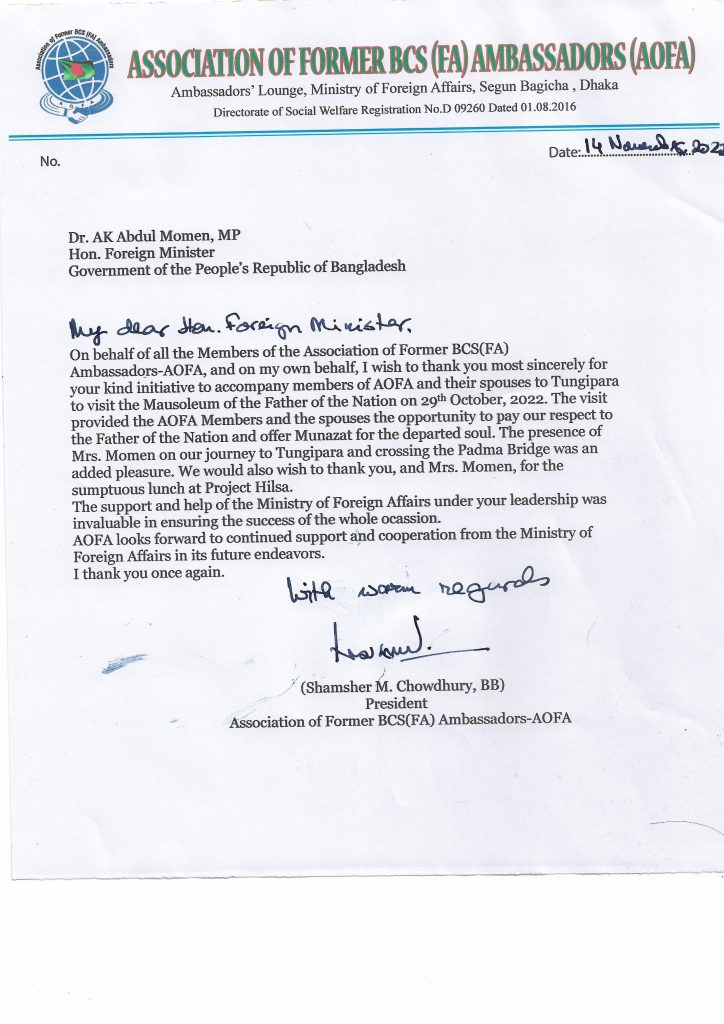
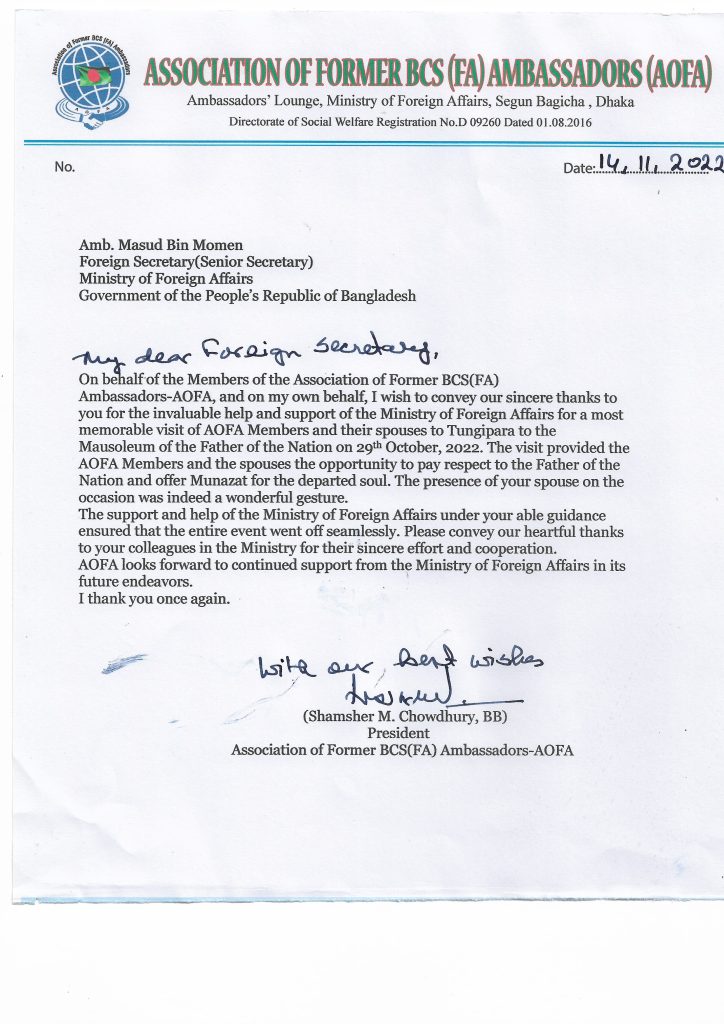
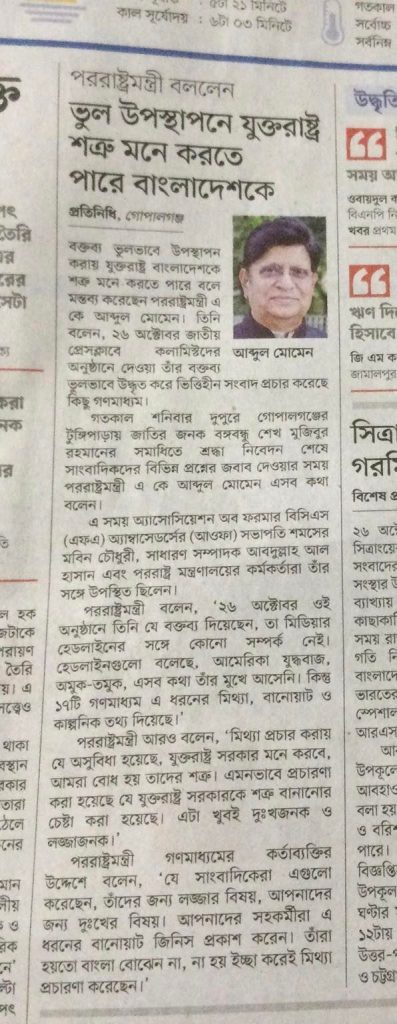
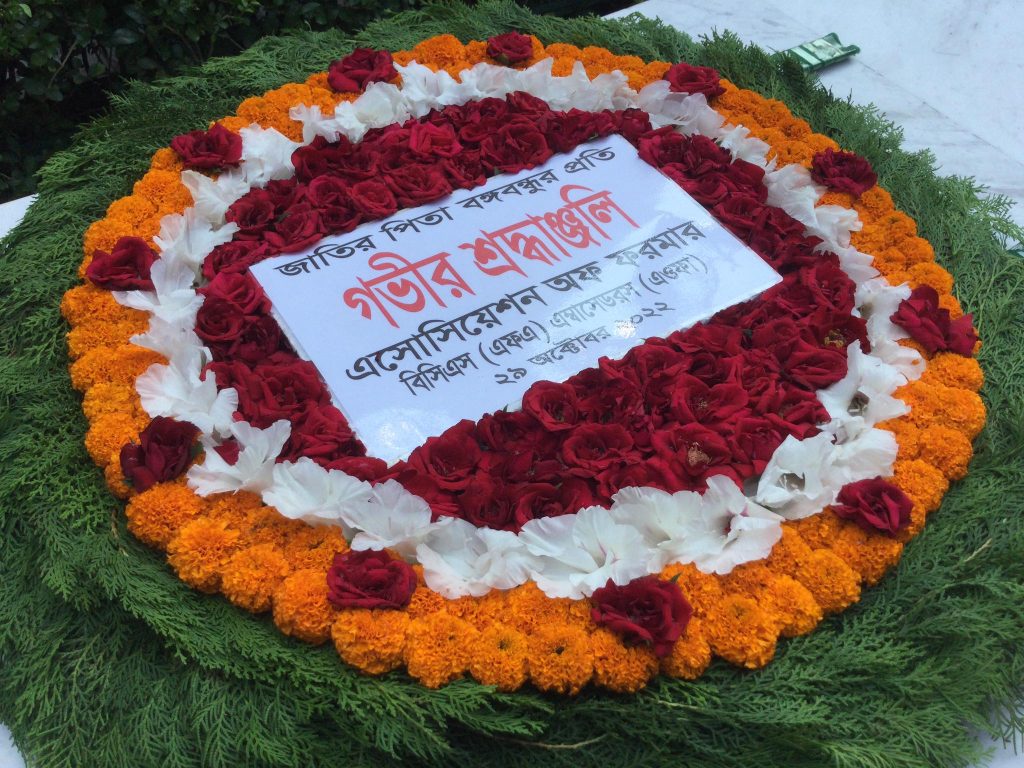
3rd JUNE, 2022
Esteemed Members,
Assalamo alaikum.
The Eid Reunion organized by AOFA on 28 May, 2022 was a great success.
39 AOFA Members and their spouses attended the event. The attendance was one of the highest in AOFA’s history.
Among those present were two past Presidents of AOFA , Ambassador Mohammed Mohsin and Ambassador C.M.Shafi Sami and a former Secretary General Ambassador Jamil Majid.
The evening’s program started with a recitation from the holy Quran by Ambassador Munshi Faiz Ahmad. This was followed by a narration on Lord Goutam Buddha by Ambassador Supradip Chakma.
AOFA President Ambassador Shamsher Mobin Chowdhury,BB in his welcome address thanked the large audience for responding to AOFA’s invitation. He specially thanked Ambassador Mohammad Mohsin and Ambassador C.M.Shafi Sami for their presence and paid glowing tributes to their contributions in the growth and strengthening of AOFA.
Next Ambassador Syed Noor Hossain took the floor to introduce his latest book কখনো স্বদেশ,কখনো বিদেশ।
The ensuing cultural program began with Ambassador A K M Atiqur Rahman, Ambassador Munshi Faiz Ahmad and Ambassador Majeda Rafiqun Nessa reciting their own poems.
They were followed on stage by two renowned singers of Bangladesh,Begum Rebeka Sultana (wife of AOFA Vice President Ambassador M Shafiullah) and Begum Rowshan Ara Islam Shoma ( wife of AOFA Member Ambassador A T M Nazrul Islam). They enthralled the audience with a number of songs of many varieties.
The revelation of the evening was a patriotic song rendered by AOFA President Ambassador Shamsher Mobin Chowdhury. The audience was pleasantly surprised by this new talent , so far carefully hidden by the AOFA President.
The vote of thanks was delivered by AOFA Secretary General Ambassador Abdullah Al-Hasan while the program was conducted by AOFA Vice President Ambassador Suhrab Hossain.
Vice President Ambassador Suhrab Hossain was also in overall charge of the arrangements for the evening’s program and he was ably assisted by Assistant Secretary General , Ambassador A K M Atiqur Rahman.
The evening’s program was rounded off with a sumptuous dinner.
With kind regards,
Yours sincerely,
Abdullah Al-Hasan.
Secretary General,AOFA.
Dhaka, 3rd June ,2022.
27th February, 2022
Visit to Suhrab’s house.
Yahoo/Inbox
- Shamsher M. Chowdhury <shamsher.mchowdhury@gmail.com>To:Amb. Abdul Momen Choudhury, email,Amb. Abdullah Al Hasan,Amb. Abdus Salam, email,Amb. AFM Golam Hossain,Amb. AH Mahmood Ali, emailand 70 more…
- Sun, 27 Feb at 10:32 pm
- Esteemed members,
- Today , I accompanied AOFA Vice President Amb. M. Shafiullah and Secretary General Amb. Abdullah Al Hasan to visit the house of our dear colleague and AOFA Vice President Amb. Suhrab Hossain in Dhamrai.
- The purpose of the trip was to provide some emotional comfort to the family following the daring dacoity at their house recently. We spent a good part of the day with them.While Suhrab appears to have regained his composure, Mrs. Hossain remains badly shaken by the whole traumatic experience. The fact that the family was at the mercy of a group of dacoits armed with lethal weapons is frightening enough in itself.
- They were nevertheless extremely hospitable. Both Suhrab and his wife were deeply touched by the expressions of support from many fellow AOFA members, both by email and over telephone.
- According to Suhrab, the law enforcement officials are pursuing the case with diligence and may have even made some headway in identifying the possible perpetrators. Let us hope they succeed.
- With warm regards
- Shamsher
Shamsher M. Chowdhury, BB
01713010203/01624092359
